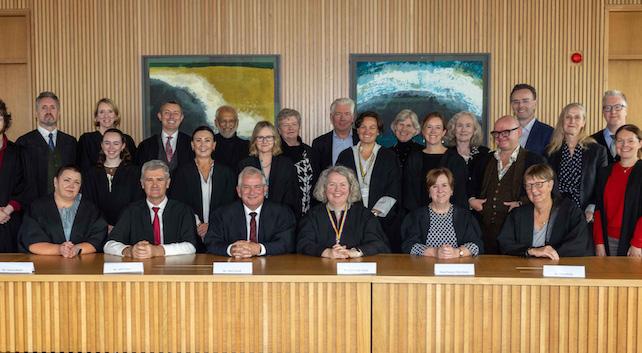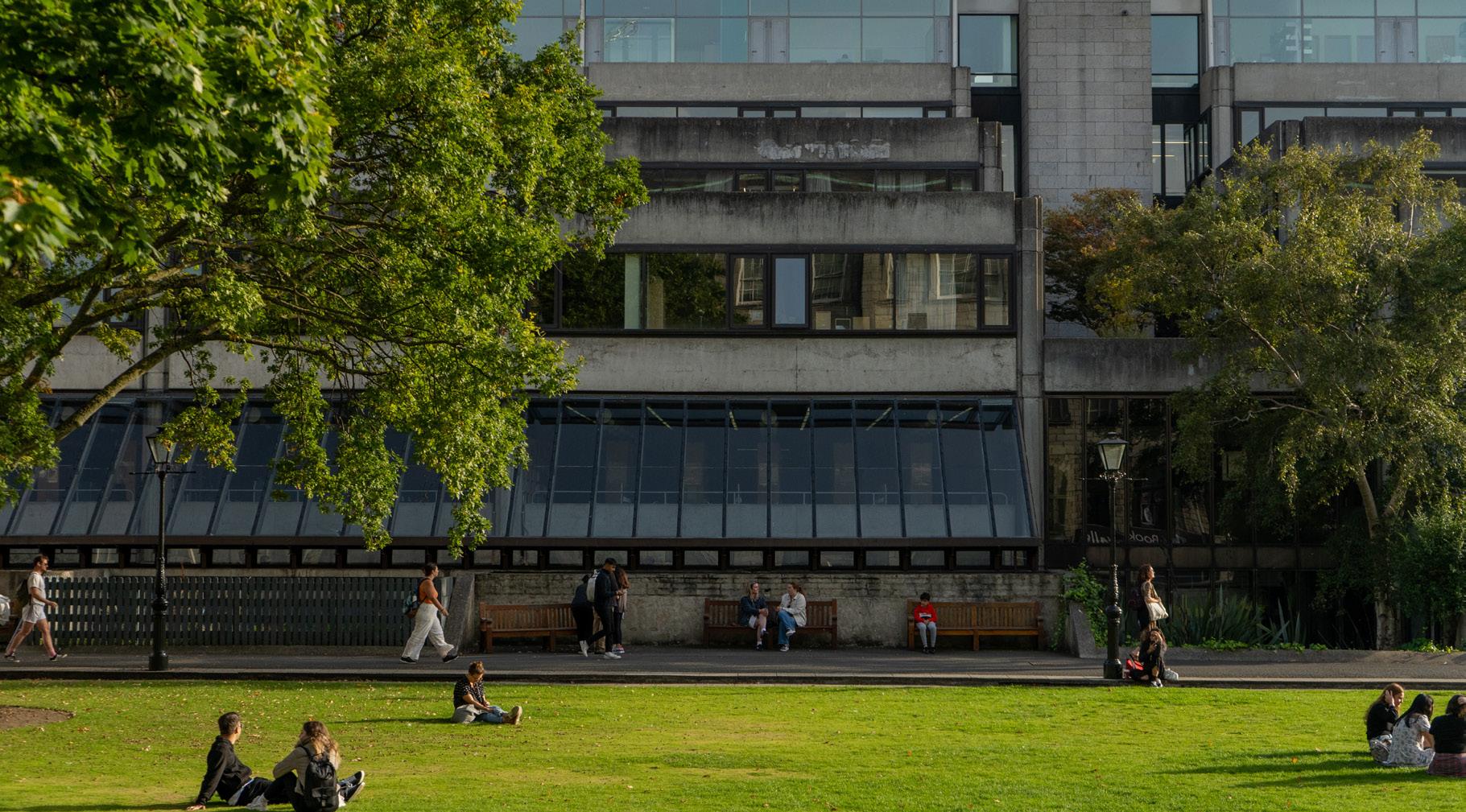Formed in 1770, the College Historical Society will be 254 years old next March
THE COLLEGE HISTORICAL SOCIETY has been recognised as the world’s oldest student society by the Guinness World Records (GWR).
is recognition comes a er a two-year campaign as the society proved through photographic and archival evidence that it had run without interruption since its foundation on 21 March 1770.
Professors Roy Foster of Oxford University and Marianne Elliott of Liverpool University con rmed the historical credentials of the society.
e Hist’s foundation came before both the Cambridge (1815)
and Oxford (1823) University debating societies.
Auditor of the Hist Áine Kennedy told Trinity News the Hist collected “an enormous volume of evidence of the society’s longevity and continuous activity from extensive records”, including library and newspaper records.

“Hunting down the evidence was not without its di culties,” she said. “ e Hist was expelled twice by the College Board [in 1794 and 1815], but there was unambiguous evidence that the society continued to exist and meet during that period.”
e Hist was founded based on inspiration from Edmund Burke’s Club of 1747 and sought to cultivate “History, Oratory, and Composition” and has sought to explore and debate topical issues in Ireland and internationally since.
Notable former members of the society include eobald Wolfe Tone, Robert Emmet, Henry Grattan, writers Bram Stoker, Oscar Wilde, and Samuel Beckett and former Irish President Mary Robinson.
Kennedy said the Hist is “thrilled at this o cial recognition” from the GWR.
“ e Hist continues to devote itself to learning lessons from the past and discussing the most pressing issues of our day.”
“ is achievement demonstrates a remarkable
tradition of encouraging student voices, radical discourse, and oratorical excellence. For over two and a half centuries, the Hist has continued to cultivate these ideals.”
“Everyone here at the Hist is absolutely thrilled with our o cial recognition from Guinness World Records and incredibly excited for the celebrations we have planned in October!” Kennedy went on to say.
e Hist was founded under the premise of promoting “speaking, reading, writing and arguing, in morality, history, criticism, politics, and all the useful branches of philosophy”.
e Guinness World Records certi cate will be o cially awarded to the Hist on October 20 at a celebratory dinner in the Dining Hall.
is dinner will be part of a week of events held by the Hist which will also include a debate on the motion “ is House Would Break Up the United Kingdom” on October 18 and e Future of University Education panel discussion in the Exam Hall on October 20.
Upcoming guests of the Hist include Hugh Grant and Rory Stewart.
UNION PRESIDENT
László Molnár has voiced his support for a Connolly Youth Movement (CYM) petition calling on the public to support a boycott of shops owned by Naeem Maniar.
Posting on social media on Sunday, Molnár said: “Support the boycott of Naeem Maniarowned shops and stand in solidarity with the workers of Iceland ghting to secure wages, sick-pay and holiday-pay they are owed.”
Maniar is the director of e Project Point Technologies Limited (PPTL), which owns Iceland stores in Ireland and is involved in an ongoing controversy over unpaid wages and holiday pay with workers organised by the Independent Workers Union (IWU) striking in various Iceland locations across the country.
In a high court sitting last Monday, it was claimed that over 300 workers had received “half their wages” or “got nothing at all” for the weeks they had worked, causing “stress and anxiety” due to a lack of certainty about their futures.
Calling for a boycott of all businesses owned by Naeem Maniar “until such time as all outstanding wages are paid to Iceland workers”, the petition
claims that “egregious labour practices” have “harmed countless workers across Ireland”, including wage the , unfair dismissal, and “a total disregard for workers entitlements”.
It continued: “ e worst of these practices have been faced by Iceland workers a er Naeem took ownership of the company, as has been well reported by their representative union, the
Independent Workers Union”. Maniar is the Director of discount retailer Homesavers, which has 49 stores across Ireland. He is also Director and Executive Chairman of Centz, and last ursday was accused of trying to “pull the pull the wool over the eyes” of a Workplace Relations Commission (WRC) tribunal in which a former female employee of the company alleged she was paid €20,000 less than a male employee who was reporting to her.
His company PPTL also owns co ee chain Brentwood Co ee, with eight locations across Ireland.
It is also alleged that Homesavers sta were used to remove money and stock from a number of Iceland stores despite the fact that the company is currently in examinership and its assets under the protection of the courts.
Named a er republican socialist James Connolly, CYM is an allIreland Marxist-Leninist youth organisation, which until 2021 was associated with the Communist Party of Ireland (CPI).

| Tuesday 26 September 7
PHOTO VIA ÁINE KENNEDY
e petition is supported by a number of lewing groups such as People Before Pro t and the Communist Party of Ireland
TRINITY COLLEE DUBLIN STUDENTS’
PHOTO VIA CREATIVE COMMONS LICENSES
Second year Ella Mac Lennan replaces TCDSU President László Molnár as S4C chair
LEFT-WING STUDENT ACTIVIST GROUP
Students4Change (S4C) have unanimously elected Ella Mac Lennan as chair and Nicholas Evans as vice-chair.
Mac Lennan assumed the role a er two consecutive terms by László Molnár , current Trinity College Dublin Students’ Union (TCDSU) President.
A second year Political Science and Social Policy student, Mac Lennan also serves alongside Molnár as TCDSU Citizenship
O cer, with her job being to “cultivate citizenship and political awareness in the student body.”

Nicholas Evans, elected vicechair, also serves on the TCDSU as the School of Languages, Literatures, and Cultural Studies (SLLCS) Convenor.
Molnár did not put himself forward for nomination during the elections held on ursday, September 21st.
In a statement to Trinity News, Molnár explained that he did not run in the chair election due to his current presidency for the TCDSU
as “it confuses the narrative when I wear both hats”.
He said S4C has become a “force to be reckoned with in student politics…[having] garnered student and sta support, as well as national media attention”.
“ is is because the time is right for socialist politics, as people are looking for radical alternatives to the prevailing capitalist order,” he said.
Molnár said he intends to remain an ordinary member of the S4C and is “happy to hand over the executive functions of [the] group to [the] newly elected Chair Ella and Vice-Chair Niko”.
He said he is “con dent that Students4Change as well as the socialist tendency in the student movement will keep growing”.
e S4C’s mission statement, as found on their website, describes themselves “as a collective of
socialist students, who work actively to dismantle the corporate university, as well as the racist, imperialist, white supremacist, patriarchal and cisheteronormative systems it re ects and reproduces”.
Since their establishment in 2021 by Molnár , S4C has campaigned on a wide range of student-related and social issues.
is includes to Stop the HEA Bill in 2022, the return of in-person exams and #NoInPersonExams, during the COVID-19 pandemic and their boycott of the Buttery following issues with students being asked to leave a er bringing their own food into the restaurant space.
S4C also conducts research and surveys on a number of issues, including counselling services wait times, war investments, and the exploitation of students by accommodation providers.
X-Lite’s founders
Patrick Joyce and Feeney both studied business at Trinity and had their company go on to win Lion’s Den in 2022
it’s where we entered into the Lion’s Den for the rst time, it’s where we pitched it to the class, to the lecturers.
“Trinity is always going to be the home of X-Lite.”
In a statement for Trinity News, a spokesperson for the Pav said: “We are delighted to see the success of a product fostered in Trinity, and we look forward to seeing X-Lite’s continued success across the country”.
X-Lite’s founders Patrick Joyce and Feeney, both from Mayo, studied business at Trinity and graduated in May 2021.
According to their website, X-Lite was formed when Joyce and Feeney discovered “many alcohol products have the same sugar as 2x bars of dairy milk”.

crowned the winner of Lion’s Den, a pitch event for elevating Irish food and beverage startups, and won a a €10,000 Digital Marketing Package from Bradley: e Brand Agency, organisers of the Lion’s Den event.
is time last year the company’s products were being sold in 30 stores. is has now expanded to over 500 stores across the country including Tesco,
Dunnes, Spar, Londis, Carryout, Malloy’s. e company hopes to make its products available in all stores across the country.
When asked about the company’s future, Feeney shared that the company is currently developing a fourth avour in the new year to accompany its watermelon, strawberry and lime, and lemon avoured drinks.
COST OF LIVING, RENT INCREASES, HOUSING CRISIS, UNLIVABLE wages. ese phrases are intrinsically intertwined with the current realities of millions across Ireland. For years, students, families, and professionals alike have grappled with economic hardship due to living in Ireland. Rather than seeing lasting e ective improvements via government initiatives and legislation or even receiving help from College, matters in 2023 only appear to be worsening. All the while, the government has reported a signi cant budget surplus.
Student experiences
On the student front, rising tuition expenses and doomed battles for accommodation, in conjunction with the aforementioned phrases
ALCHOLIC DRINKS COMPANY X-LITE HAS SECURED A DEAL with the Pavilion Bar (Pav) for freshers’ week.
e agreement includes increased stock of X-Lite’s products, an X-Lite DJ booth in the Pav’s marquee installed every freshers’ week, as well as X-Lite themed lighting.
Talking to Trinity News, X-Lite Co-founder Oliver Feeney said: “It has been fantastic for us to deal with the Pav”.
“It’s great to come in and see all the students - it’s brilliant for us to have the opportunity to provide back to the university.”
“ is is our home turf,” he said. “At the end of the day, this is where it all started.
“On the grounds of Trinity is where we rst sold our rst cans,
Speaking on the beginnings of X-Lite, Feeney shared that the company’s rst products were made in a College kitchen and had been sold through a ground oor window in a Botany Bay apartment.
X-Lite was selected as one of 10 teams in Trinity’s Launchbox program in May 2021, a summer programme which provides support for student entrepreneurs in the form of funding and access to mentors.
Feeney described the company’s involvement in Launchbox as “massive for us”.
“It gave us access to people with experience who could tell us how the industry works,” he said.
In May 2022, X-Lite was also chosen for the Food Works Programme, run by Enterprise Ireland, Bord Bia, and Teagasc.
In December 2022, the company
e Minister for Further and Higher Education called for the rent tax credit to be doubled in the next budget
MINISTER FOR FURTHER AND HIGHER EDUCATION, Research, Innovation and Science Simon Harris has called for the rent tax credit to be expanded to students living in digs in Budget 2024.
Speaking to reporters in Dublin last week, Harris said the credit should be included beyond students and parents of students in purpose-built student accommodation or in college
Tuesday 26 September 8
PHOTO BY ALAN NOLAN WILSON FOR TRINTITY NEWS
summarise the modern Irish university experience. Each year, thousands of undergraduate and postgraduate students in Trinity struggle to secure accommodation in Dublin, let alone pay rent, tuition deposits, groceries and other basic necessities due to the extremely in ated cost of living.
It is common to hear of students commuting well over an hour into College daily. Not for family’s sake, but commuting long hours is a more a ordable option than living in Dublin for many.
Trinity News recently reported on College raising accommodation licence fees by the maximum legal amount. e article also notes “all campus accommodation units are above the average rent of €802 for a single bedroom in the city centre”. College’s defence to the backlash and uproar from the student body: “modest increases” are justi ed by rising in ation.
Although College holds no responsibility to better the economic state of Ireland, they
have a responsibility not to exacerbate the nancial capacities of their students. In the Book of Kells protest against the licence fee increase on 13 September 2023, the Dean of Students, Dr Richie Porter, told Trinity News that the protest was “counterproductive” and that students are “biting the hands that feed them”.
“If they want a freeze in the next few years, we have many forums to discuss that – I am Chair of the Student Life Committee. [But] they’re giving me nothing, so I’m going to do nothing until they give me something – then I will negotiate, and I will bring the top delegates along with me,” he said.
College’s o cial statement regarding the protest is that “utility charges for students have not been increased at all this year despite signi cant in ation pressure”.
If College, as Porter states, has the ability to help students, is it not contradictory to blame in ation for what is an alleged non-existent licence fee issue, all the while
saying students are only hurting themselves?
Why is everyone talking about in ation?
It should come as no surprise that in ation in Ireland is the driving factor, if not the root cause, of the various economic hardships that residents have been experiencing.
While in ation is not singular to Ireland, the country was named the most expensive in the EU for goods and services in June 2023, with prices 46% above the average. Ireland was also highly ranked for above-average costs across other categories like energy, transport, food and more. In March 2023, the Oireachtas formally acknowledged that Irish grocery prices had in ated to a record high of 16.3%.
Even if some aspects of that may hold truth, in almost all consumerdriven categories, Ireland is far more expensive than its European and international counterparts. But why? How has the nation reached this point? Various sources, including Minister for Finance Michael McGrath, report Russia’s war on Ukraine, the pandemic, gas prices and overall importation as the central factors for in ation in Ireland.
Again, if these recent international events produce a domino e ect on the economy of countries around the world, why
has the impact on Irish residents been so damaging in comparison? Even further, surging rent prices, grocery bills and tuition expenses are by no means recent problems for Ireland to warrant placing all blame on recent global events.
In reference to College, in ation does play a major role in the way it operates. As an institution, they rely on student tuition expenses and accommodation costs for a large portion of nances, barring any grants or donations they receive. From a business standpoint, it is common for a company to raise the price of the goods and services it provides in these conditions.
However, College is not an ordinary company; its primary “consumers” are its students. In contributing to an already exceptional nancial burden upon students, College only raises barriers to entry for higher education, a cause they publicly state to ght against.
e catch is that, in reality, students are not consumers. Universities are a public good, which means a business-centric approach to higher education defeats the purpose: education.
Talks of a cash surplus and Budget 2024
Amid these issues, Ireland has made headlines in international media for having billions in cash
surplus, and it is only predicted to increase by further billions over the next few years.
An economic report by the BBC goes in-depth on what this cash surplus actually means. e Department of Finance is expected to garner a budget surplus of €10B by the end of this year and €20.8B by 2026. e government certainly won’t spend a large portion of this money anytime soon. However, they have the capacity to provide immense nancial relief by targeting these problems.
e Government Budget 2024 is soon to be released, and the government has already discussed or announced certain initiatives – like potential cuts to Universal Social Charge (USC). One clear thing is that the government plans to spend a conservative amount in the budget.
One would expect Budget 2024, given the current surplus circumstance, to include a plan to target the pressures faced by millions due to the cost of living and housing crises. e extent of what measures, if any, will be taken given the surplus remains unclear.
Over the coming weeks, more information regarding the contents of Budget 2024 will be released. Until then, the cost of living crisis from all standpoints continues to be detrimental to the education of students.
campus accommodation. While parents who contribute to their child’s rent in student accommodation, they are not eligible to claim the tax credit if their child rents a room in a private home.
Harris said he wants to see this changed so that parents are also included in the calculation for the tax credit where the student is living in digs, especially if a student’s own income is not enough to qualify for it.
“Only the student can avail of the tax credit if you’re in the digs, the rent a room and for some students, their income may not be enough to bene t from the tax credit,” he said.
“In many cases, people will
know it might well be the parent assisting, it certainly would be the parent who could bene t, in terms of the tax credit.”
Harris also said the rent tax credit should be doubled from €500 to €1000 in this year’s Budget.

Currently, single people are eligible for a €500 tax credit while married couples and civil partners jointly assessed for tax qualify for a €1000 credit.
Harris said the base credit must be increased.
“€500 is welcome, but rent is expensive in this country and I would echo calls from Minister for Housing [Darragh O’Brien] that he would like to see it increased,” he said.
“I ideally would like to see it doubled if possible.”
e Government introduced the rent tax credit as part of Budget 2023. e credit itself is able to be claimed retrospectively for 2022 and is also claimable for 2023.
e scheme is due to run until 2025, with the future beyond that set to be decided by a future Government.
It is estimated that there are 400,000 renters who are currently eligible for the relief.
Speaking on student
accommodation, Harris said he would also like to see a “signi cant upli ” in money allocated to building accommodation in the State.
“We’ll very shortly be at a point that any project that has planning permission, we will have provided funding for. I haven’t met anything but support in Government for that,” he said.
| Tuesday 26 September 9
IMAGE VIA MERRIONSTREET.IE
A new programme has been introduced in collaboration with My Canine Companion to bring therapy dogs to the Cork campus. e initiative, being led by the School of Nursing and Midwifery, aims to lower levels of anxiety and stress among students. UCC is the rst college in Ireland to employ such a programme, with it having success in universities in other countries. Expressing his hope that the initiative will bring “great comfort, happiness, and support”, UCC President John O’Halloran said: “ e evidence is clear, from lowering stress levels to boosting social connections, there are many health bene ts from time spent with companion dogs.”





Tuesday 26 September 10
PHOTOS BY NIKO EVANS FOR TRINITY NEWS
Trans & Intersex Pride Dublin gathered on Merrion Street on September 16 in protest of a rally led by Posie Parker who they described as spreading “anti-abortion, misogynistic, transphobic messaging under the guise of protecting women’s rights”.
AN ECONOMIC AND SOCIAL RESEARCH Institute (ESRI) report has found that a low number of students are crossing the Irish border for third level education.
e organisation considered a variety of CAO and UCAS data from 2010-21 and consulted 14 key stakeholders working in the elds of career guidance, admissions, and higher education policy.
e report found signi cant barriers obstructing students, particularly those living in Northern Ireland, from studying across the border and made recommendations on how levels of cross border education can be increased.
Statistics on cross border education:
In the 2020/21 academic year just 1,170 students from Ireland went to study in Northern Ireland representing just 2.4% of Northern Ireland’s student population. During the same academic year, just 1,255 students from Northern Ireland studied across the border. is represents 0.6% of Ireland’s student population.
It should also be considered that during the 2020/21 academic year over 13,000 students from Northern Ireland le to study in
other parts of the UK. is indicates that Northern Irish students are not opposed to studying outside of Northern Ireland.
While it is certainly possible that many students from Northern Ireland simply aren’t interested in studying in Ireland, it seems unlikely that just 0.6% of Ireland’s student population is made up of students from Northern Ireland because of this.

Instead, as the ESRI’s report suggests, many students from Northern Ireland don’t study in Irish universities as a result of a system which puts these students at a disadvantage.
What are these barriers? roughout the report it is made clear that one key factor preventing Northern Irish students from studying in Ireland is the conversion of A-level grades to CAO points.
While all students in Ireland are graded out of 6 subjects, the majority of students from Northern Ireland take three A-levels. is is problematic in that in order for a Northern Irish student to achieve the maximum Irish grade of 625 points, they are required to sit four A-level subjects.
In the years 2019 to 2022 between 3 and 3.6 percent of students in Northern Ireland sat four A levels. is means that over 96% of students from Northern Ireland immediately had their grade converted grade capped at 555 CAO points, the equivalent of three A* grades at A-level.
Because of this method of conversion, the vast majority of students from Northern Ireland are unable to apply for top points courses in Irish universities. is converted value of A-level grades is made even more problematic when one considers the level of grade in ation in Ireland since the pandemic. is is highlighted in the report with one stakeholder commenting that some courses are “not just 600 points, it’s 625.” is in ation has resulted in higher points requirements for courses at universities. While 71% of Leaving Certi cate students had their grades rise as a result of postmarking adjustments this year, Northern Ireland has adjusted students’ A-level grades to prepandemic levels. In simple terms, Leaving Certi cate scores are going up, causing higher points
which applies to many courses without a language component, prevents Northern Irish students from meeting the subject requirements which are needed to apply. e ESRI’s report regards these language requirements as one of the biggest barriers to entry which students attempting to study across the border face. e problem of language requirements is made particularly severe due to the sheer quantity of Irish university courses that have these requirements. is is highlighted in the report with the ESRI stating: “In NUI universities, a third language (other than English or Irish) must be included among the subjects for most degree programmes in Arts, Human Sciences, Law, Social Science, Commerce, Medicine and Health Sciences and some other degrees”.
Recommendations to promote cross border study:
Launching the report, Minister for Higher and Further Education Simon Harris said he is “committed to working with higher and further education institutions, and with partners in the UK government and Northern Ireland, to make it as easy as possible for students to choose to study in either jurisdiction”.
to students on the other side of the border. While students on both sides of the border are entitled to this guidance, the report suggests that there is the potential for school-based guidance services to promote a greater awareness of higher education options to students. e report also highlights the importance of this guidance for students from working class backgrounds.
Ahead of the report’s launch, Harris said the Department has “ringfenced” places in nursing and therapy professions to support student mobility to the North. e report also highlights the importance of outreach by higher education institutions (HEIs). e report’s research also concludes that students’ awareness of their options is key to promoting cross border study. e report recommends improved HEI websites and the use of college open days to inform students about their options.
requirements, while at the same time A-level grades are falling. e subject requirements for many Irish university courses also put Northern Irish students at a disadvantage. While the majority of students in Ireland study a foreign language at Leaving Certi cate level, this is not the case in Northern Ireland. is language requirement,

“ is is really important in deepening our connections both north/south and east/west and in ensuring that young people have access to the best possible educational opportunities,” he said.
One of the report’s primary recommendations is for career guidance professionals to be more informed on the options available
Finally, the report suggests that the entry requirements to Irish universities are reassessed. is involves reforming the current method of converting A-level grades into CAO points. is would give students from Northern Ireland the opportunity to score the high points required for many courses in Irish universities. is reassessment of requirements would also involve reviewing the language requirements for many courses. ese requirements are repeatedly described in the report as one of the greatest barriers to entry to Northern Irish students who wish to attend Irish institutions.

| Tuesday 26 September 11
IMAGE VIA FLICKR IMAGE VIA FLICKR
TRINITY BUSINESS SCHOOL’S INTEGRITYIQ
has been awarded €365,000 to allow researchers to create an AI driven platform to address multinational organisations failures in ethics and compliance over the next 18 months.
“ is product lls a gap in the market. Many large multinational companies struggle with ethics and compliance training,” Malan
said.
“We o er an a ordable, customised, personalised product at scale. Essentially each employee in a company, no matter what the size of that company, will receive a personalised ethics training programme,” he said.
“We expect to work directly with at least seven industry partners during the development and piloting of the so ware.”
e project was conceptualised by Dr. Daniel Malan director of the Trinity Corporate Governance Lab at Trinity Business School.
IntegrityIQ, a spin o from Trinity Business School, is supported by the e Learnovate Centre which seeks to “support and enable organisations to unlock the transformative power of learning using applied research, innovative practices and cuttingedge technology.
e funding was awarded by Enterprise Ireland’s Commercialisation Fund.
Divisional Manager for Research & Innovation at Enterprise Ireland Marina Donohoe said that “Enterprise Ireland’s Commercialisation Fund provides nancial and strategic supports to enable venture
scientists and researchers in the academic ecosystem to evolve their research into commercially viable products that are investor
ready.”
Alongside support from the Learnovate Centre, the next 18 months will see IntegrityIQ provide an immersive and con dential environment where employees can create an avatar and enter a simulation where they will be faced with a series of ethical dilemmas.
It will also allow employees to discuss corporate culture, integrity risks and facilitate processes for whistleblowers in these multinational organisations
“Two of Learnovate’s biggest areas of research expertise in the learning space are personalised learning and immersive learning methodologies. IntegrityIQ has both of those,” said Tom Pollock, Commercial Development Manager at Learnovate.
He concluded by saying “It’s also an incredibly timely project. Every day in the news you hear how unethical behaviour has a negative impact on organisations, and this is a chance to really make a di erence in that space.”
is project comes in the wake of 16 Wall Street rms being ned a total of $1.8 billion USD in 2022 due to inappropriate sta behaviour.
“I think some of these people are trying to create an alternative reality in terms of the country undermining our democracy, and some of it almost approximates to sort of fascist-like behaviour in terms of intolerance.”
ASTUDY LED BY A TEAM OF TRINITY researchers has found that literacy rates in Irish secondary schools are among the most socio-economically equally distributed in Europe.

e research, conducted by Dr Yekaterina Chzhen, Assistant Professor in the Department of Sociology, and Julia Leesch, a PhD candidate in Trinity, studied data from 29 countries and found that Ireland has among the lowest levels of socio-economic status gaps in Europe with regard to literacy in
secondary-level education.
Dr Chzhen’s research, which was supported by a grant from Trinity’s Arts and Social Sciences Benefaction Fund and published in the British Educational Research Journal, con rmed a positive relationship between a higher degree of a uent socio-economic composition within a school and academic performance, but also found that a school’s socioeconomic composition impacted a student’s literacy rate even when the student’s own family background was adjusted for.
Factors such as classroom discipline, teaching practices, school resources and peer educational aspirations were found to play an important role in determining literacy rate outcomes.
e positive relationship between the proportion of a uent students to total school population and literacy rates existed across all of the 29 European countries analysed, but the gap between privileged and underprivileged schools varied signi cantly between countries.
Dr Chzhen said: “Our study found that Ireland had some of the smallest school composition gaps
in Europe, alongside Scandinavian and Baltic countries. Schools in France, Germany and Hungary had the greatest di erences in literacy scores between privileged and underprivileged schools.”
“Overall, we found that countries that lter children into di erent educational tracks early, like Germany, tend to have greater di erences in children’s skills achievement due to school composition than countries that separate children later in
IMAGE VIA PEXELS
adolescence, like Ireland,” she continued.
Further analysis by Dr Chzhen and Leesch of six countries, including Ireland, also found that classroom climate and methods of teaching were also a signi cant factor in explaining the link between literacy rates and the socio-economic composition of schools, even when the student’s own background is taken into account.
“I think the results, performances that we got, were in spite of Vera being coach.”
“I congratulate my father on his remarkable 70-year career. We thank him for his vision, his pioneering spirit, his steadfast determination, and the enduring legacy he leaves to the companies he founded and countless people he has impacted.”
“Hello mate”
“We as queer people are forced into a world that’s not meant for us. We do everything we can to force a world that accepts us and that can love us all unapologetically, and it is them that wants to reverse any progress we’ve made so far and pull us back into the Dark Ages.”
“What a lovely welcome. I was standing out the back there like Joe Du y about to be introduced at a Wolfe Tones gig.”
Tuesday 26 September 12
e platform will seek to address issues in multinational organisations relating to ethics and compliance
Factors such as classroom discipline were found to play an important role in determining literacy rate outcomes
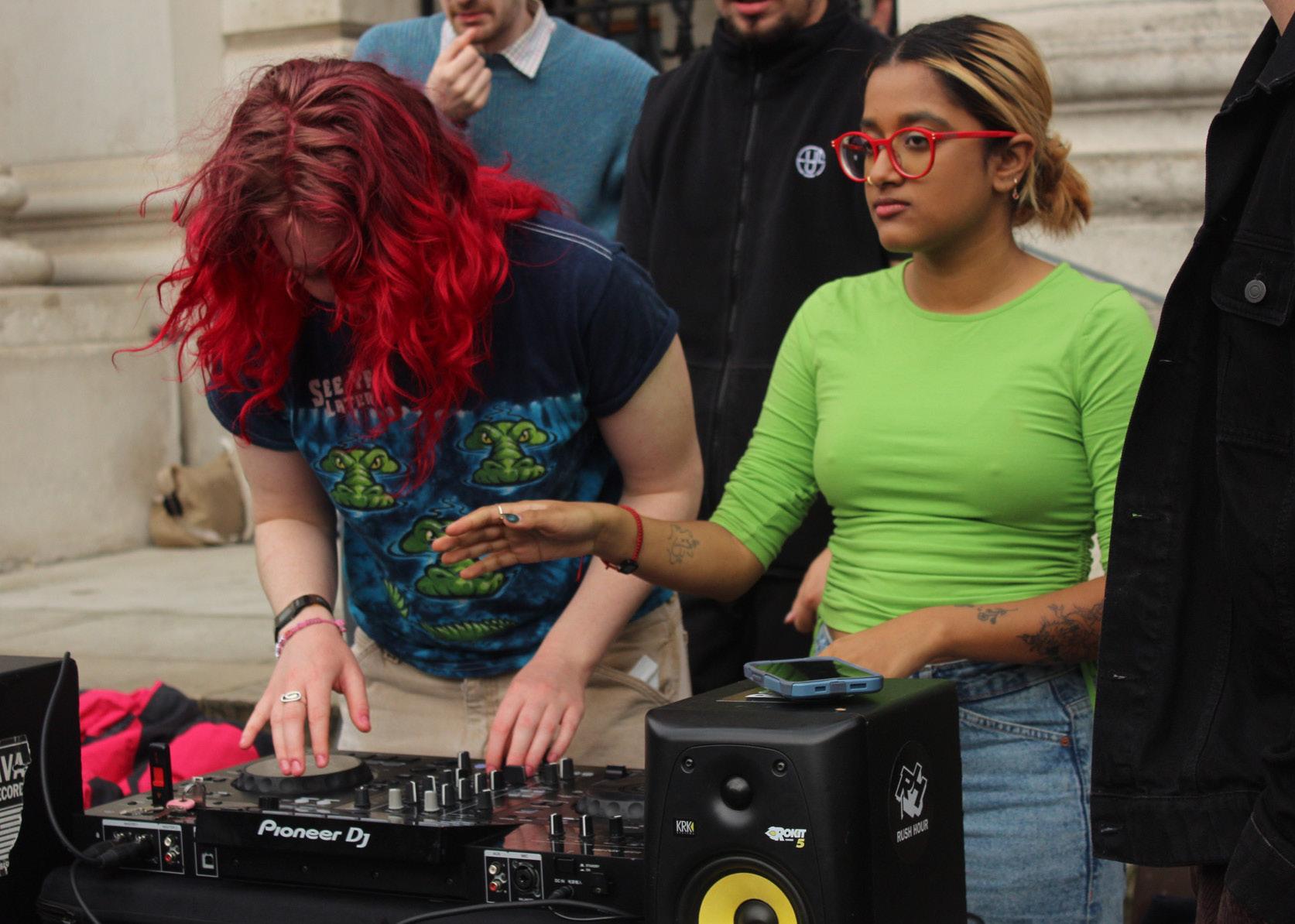
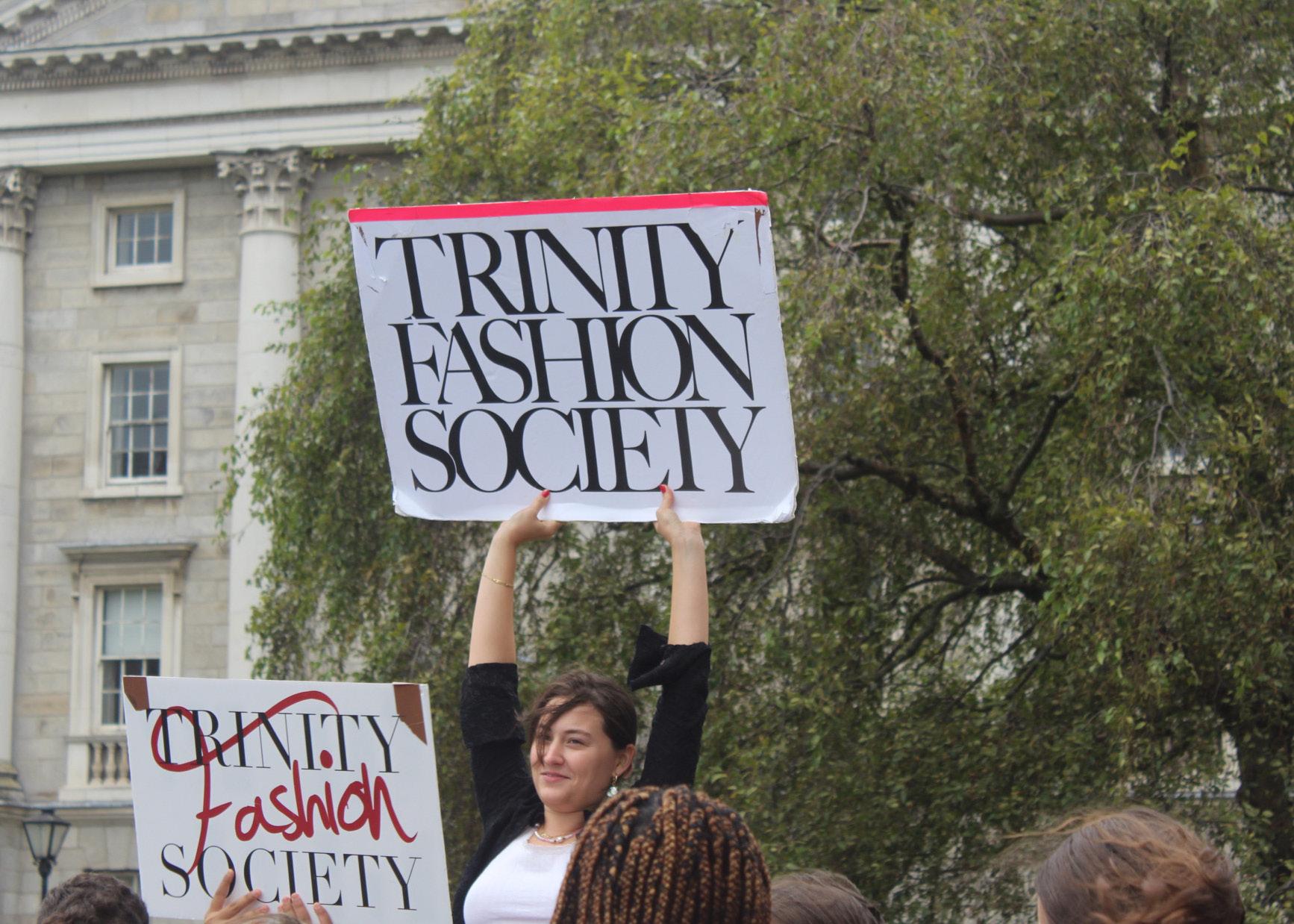



| Tuesday 26 September 13
NEWS
PHOTOS BY NEASA NIC CORCRÁIN FOR TRINITY
In
Ireland spent
analysed data from 2020, Ireland spent about $12,200 per full time equivalent student, falling short of the OECD average of $12,650.
In third level education, the average spend per student was $17,400 compared to the OECD average of $18,105. e student to sta ratio at third level was also higher than the international average, at 23:1 compared to 17:1.
Ireland also fell below the international average in terms of percentage of Gross Domestic Product (GDP), spent on education from primary to third level. In 2020, Ireland’s education spend equaled 3.2% of the country’s GDP compared to the OECD average of 5.1%.
international average, at 11.5% compared to 10%.
Following the report, Ireland’s education spend was criticised by teachers unions across the country with Association of Secondary Teachers in Ireland (ASTI) President Geraldine O’Brien calling the spend “shameful”.
promises and commitments to increase funding for higher education and to make money available in the October budget for the sector to try to make up for the years of neglect it has su ered”, IFUT General Secretary Frank Jones said in a press release following the report.
IRELAND SPENDS LESS ON AVAERAGE ON ITS STUDENTS ACROSS ALL levels of education than the international average, according to a new report from the Organisation for Economic Co-operation and Development (OECD).
According to the report, which
e report however noted that this gure is likely “linked to Ireland’s GDP being in ated by the large number of tech companies which have their legal headquarters in Ireland for tax purposes”.
Contrastingly, the percentage of Ireland’s national budget dedicated to education was higher than the
“A signi cant increase in investment in our schools is required in Budget 2024, so as to ensure that young people can get the knowledge, skills, and educational experiences so vital to their future lives”, she said “Large class sizes, insu cient sta ng, and inadequate classrooms and buildings must be addressed”, she added. ese complaints were echoed by the Teacher’s Union of Ireland (TUI) and the Irish Federation of University Teachers (IFUT).
e IFUT called for the government to increase its higher education spending in the upcoming Budget 2024.
“ e time has nally come for them to honour their own
e OECD’s annual Education At A Glance report, released
earlier this month, provides data on the structure, nances and performance of education systems across OECD countries. e OECD is an international think tank comprised of 38 member countries aimed at “establishing evidence-based international standards and nding solutions to a range of social, economic and environmental challenges”.

The Irish Research Council (IRC) has awarded €24.6 million to 49 Trinity researchers. e funding includes 38 postgraduate scholarships and 11 postdoctoral scholarships across the arts, humanities and social sciences, science, technology, engineering and maths.
A total of 294 awards, encompassing 214 prograduate scholarships and 80 postdoctoral fellowships, were announced.
In a press release, Trinity Dean of Research, Professor
Sinead Ryan said: “We are very pleased to see so many excellent emerging researchers supported in the announcement of the IRC postgraduate and postdoctoral programme awards.”
“Nurturing talented researchers across all elds of enquiry is essential in ensuring a vibrant research system that works for everyone” she continued.
Minister for Further and Higher Education, Research, Innovation and Science Simon Harris also commented on the announcement: “ ese awards will support the development of the next generation of excellent researchers in Ireland, as they pursue new knowledge at the cutting edge of a wide range of disciplines.”
“[ is investment] will support the development of skills, knowledge and innovation that will meet the challenges of today and the future.”
Director of the IRC Peter Brown also said that the awards “will enable close to 300 exceptional and innovative early-career researchers to progress a wide variety of pioneering areas of research”.
He noted that “early-career researchers represent the future of research and innovation and the funding being announced by the Minister today will support a vibrant knowledge eco-system”.
Dr Richard Nair and Dr Craig McEntee have received awards funded by Science Foundation Ireland
TWO TRINITY RESEARCHERS HAVE received Royal Society University research fellowships.
Dr Richard Nair and Dr Craig McEntee have received awards funded by Science Foundation Ireland. e awards are given to scientists in the early stages of their research careers who are deemed to have outstanding potential for leadership in their eld. e awards support the work of scientists by providing salary costs and research expenses for up to eight years.
Dr Nair, who is a plant ecologist in the School of Natural Sciences, will use the funding to carry out
project RoDEO. e project will measure root growth patterns using AI in order to gain a better understanding of how ecosystems respond to climate change.
In response to his award, Dr Nair said: “RoDEO will provide new fundamental data about longterm trends and patterns and will ultimately allow improvement of climate models, which in turn will aid management decisions that are taken to optimise carbon storage in ecosystems.”
Dr McEntee, a Research Fellow from Trinity’s school of Biochemistry and Immunology, will use his funding to carry out a project which aims to gain a better understanding of the role of PYHIN proteins in T cell-mediated adaptive immunity. is is hoped to assist in the development of improved vaccines.
Reacting to the award, Dr McEntee said: “By identifying key factors involved in the generation of memory T cells, we hope to identify new targets or strategies to boost immunity against infectious diseases by harnessing such responses, such as with improved vaccines capable of driving the di erentiation of tissue-resident memory T cells.”
Professor Sinéad Ryan, Dean of Research at Trinity, said: “ e Royal Society University Research Fellowship scheme supports exceptional early career
researchers whose work may prove fundamental to the future of global science.”
She praised the project saying they will “contribute to an improved understanding of ecosystem responses to climate change and to the development of more e ective vaccines promises –both issues of global importance”.
“We look forward to following the progress of both projects as Richard and Craig develop their careers at Trinity” she concluded.
Tuesday 26 September 14
2020,
about $12,200 per full time equivalent student, falling short of the OECD average of $12,650
In 2020, Ireland spent about $12,200 per full time equivalent student, falling short of the OECD average of $12,650
Amidst the seemingly never-ending and ever-worsening housing crisis, thousands of students across the country live in terrible conditions they can barely a ord. Following the protests on campus two weeks ago, Trinity News spoke to two Trinity students and TU Dublin Student Union (TUDSU) President Brian Jordan about their housing horror stories.
When Lisa moved to Dublin in September 2021 to start her degree in PPES at Trinity, she was unprepared for the massive di erence between student housing in Ireland compared to her native USA. She stayed in private student accommodation for the rst two years of her degree a er failing to secure a place in Halls despite her international student status. is year, however, she is studying abroad for the second semester, leaving her at a signi cant disadvantage in the housing market. With most students signing rental contracts for the entire academic year, securing accommodation for just her rst semester in Dublin proved an immense challenge. As an o cer in a Trinity society, oncampus accommodation seemed a viable option. However, her application for on-campus housing was rejected in June, leading to an “extremely stressful” summer of frantic online searching. Her parents even suggested she transfer from Trinity to a community
college near her home so that she would have a place to stay. A er applying to almost thirty apartments over two months, she nally found a two-room apartment for 1600 euros a month. Since moving in, her experience has been overshadowed by neverending electrical issues and the exorbitant costs of her apartment complex’s laundry services. She explained her shock at the fact that Trinity “does nothing” to help, describing the housing experience at the Canadian university where she will be studying as “very di erent.” Within a few days of searching in Canada, she found a place to stay that is “much cheaper” than her Dublin at and only a ve-minute walk from campus.
Lisa expressed her exasperation over the fact that “there are so many empty lots in the city, especially in town” that College and the government can build housing on and believes that the failure to do so is “actively driving away [their] own students.” While she initially thought she would stay in Dublin for a few years a er graduating, the current “uninviting” environment has prompted her decision to leave. She is frustrated that the government “say[s] that this is a priority, but it doesn’t seem to be at all.” She feels “false promises” are being made as college administrations claim to care about student welfare but fail to meet their students’ basic needs. She wishes that Trinity would “actively do something – whether that’s developing a new property or having more partnerships with student accommodations.”
Conor, a nal-year Film and English student, has been le with health complications and respiratory illness a er living in a mould-infested apartment for two years. A er failing to secure a place in Halls in his rst year, Conor moved into a property in Dublin 8.
e viewing and lease signing took place on the same day, and when he and his housemates arrived, their landlord was covered in paint. ey later discovered that he had been covering up the mould growing in one of the rooms, a practice repeated every time he was asked to treat it. Halfway into his second year, Conor started feeling “wheezy for no reason.”
He had asthma as a child, which was worsened by living in damp, unsafe conditions. A er months of tests and failed treatments, Conor nally found a drug that helped, although he still has to make monthly hospital visits for
injections. He says that according to doctors, the mould in his former accommodation was likely the cause for the condition which has “derailed his life”. He will be receiving treatment “inde nitely.” At his worst, he “couldn’t do basic things like run or even laugh without getting out of breath.”
He thinks that the fact that college students are being taken advantage of and subjected to such “disgusting” living conditions
is “evil.” He also plans on leaving Dublin due to the cost of housing.
TUDSU President Brian Jordan had lived for four months in what he described as “literal hell.” It all began when Brian was searching for accommodation at short notice. A er si ing through thousands of lettings on da .ie–an Irish property search engine–he accepted a at he had viewed despite the landlord seeming “very strange” as he simply “had no other choice.”
His landlord—who was also his housemate—would stare at him, making him feel extremely uneasy, and always seemed to be waiting for him to do something that he could then complain about. Constant drinking, drugs le on kitchen tables and attempts to come into his room at night le Brian feeling paranoid and unsafe in his own home. en, a er Brian had surgery for melanoma, the landlord accused him of faking his diagnosis, labelling him “sel sh” for failing to take out the bins. Soon enough, Brian developed stress-related eczema, and his doctor advised him to change his living situation.
A er moving out, the landlord withheld Brian’s deposit until a replacement housemate was found, meaning that Brian wasn’t in a position to report him to da ie as this might have prevented the landlord from nding a new tenant. Brian explained that the worst part of this experience was the feeling of “powerlessness” due to his lack of tenant’s rights. Brian said that as TUDSU President, he
o en feels like assisting students with accommodation is “his entire role.” He believes that one thing universities could do to help is “start sectioning o a certain amount of private accommodation” for their students. However, Brian—like most of the interviewees—feels that sometimes, these institutions are more concerned with making a pro t than they are about their students.
ese are just a few examples of the extreme circumstances
students in Dublin face regarding housing. With the number of places available in Irish universities rising yearly and insu cient accommodation to house these growing student bodies, these horror stories will only become more and more common.
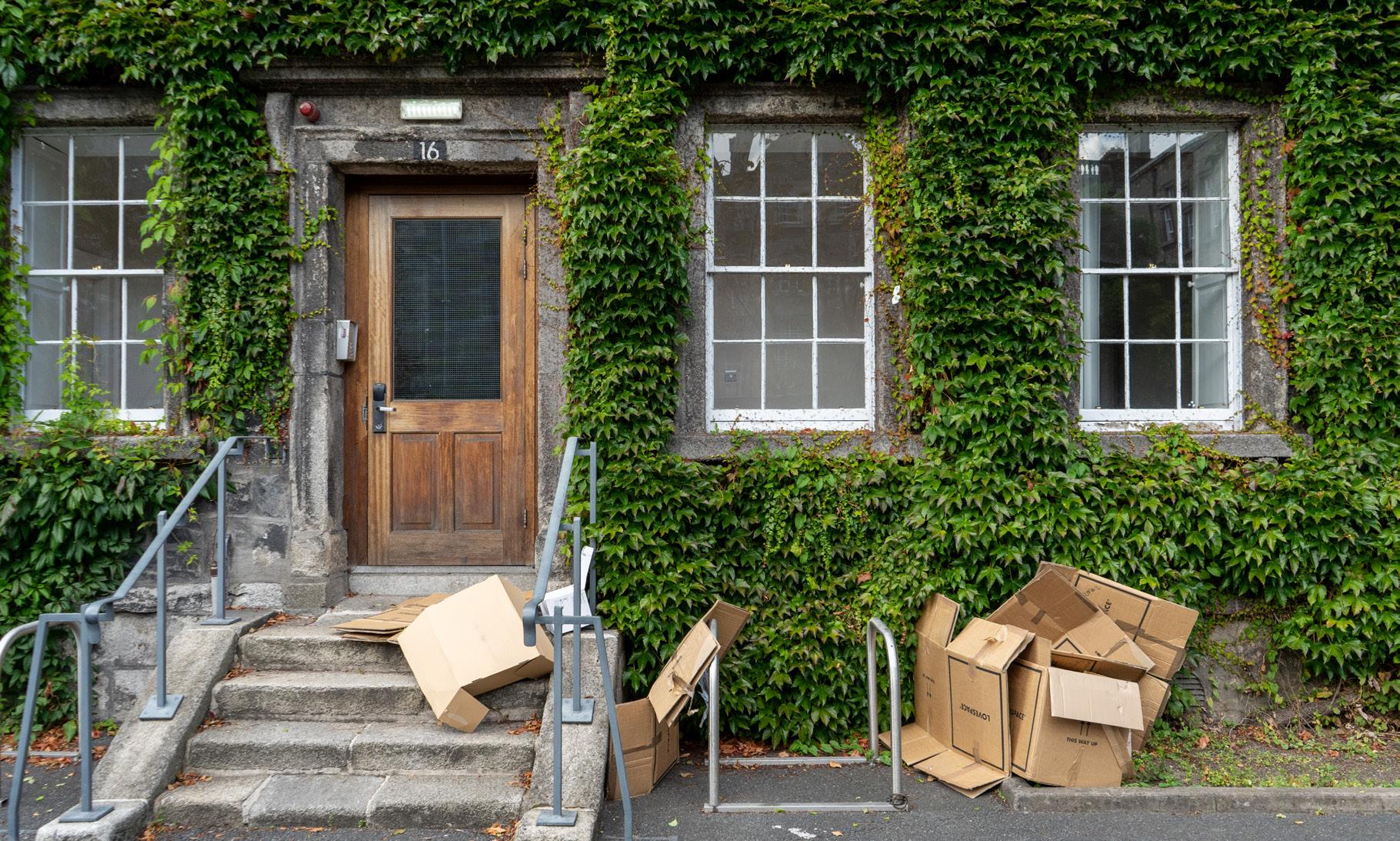

| Tuesday 26 September 15
PHOTO BY NIKO EVANS FOR TRINITY NEWS
Trinity News sits down with students who have endured terrible living conditions to get the bottom of just how bad circumstances have become
Trinity
goes
over 800 emails and around 300 phone calls were received from Saturday to Monday. Normally, this workload is shared among 80 full-time employees and 30 temporary employees, most of whom are on three month contracts which are concentrated around the registration period at the start of the school year. ese employees are spread across ve departments: Service, Operations, Student Finance, Business Support & Planning, and Change & Transformation (added this year). e upstairs of the Academic Registry—the portion visible to students—is exclusively reserved for Service. is critically important department—where almost all phone calls are directed to—only has 16 employees, 7 of which are temporary for the registration period. All of the other departments live downstairs, working on speci c cases primarily over email, and keeping the o ce alive administratively.
Before 2013, if a Trinity student needed help paying their tuition, they had to venture over to the College Green Costa Co ee and visit the Financial Services O ce located upstairs. For Erasmus and admissions queries, help could be found in Regent House. Trying to go o books or talk to administration about a personal problem a ecting academics? ere was a small space for student cases adjacent to the O ce of the Senior Lecturer. For students trying to gure out where they needed to go for problems that inevitably arise over four years of study, the dispersed o ce system proved unnecessarily stressful.
To unite the di erent corners of Trinity’s administration, the College consolidated all of these o ces in 2013, creating one place that could handle virtually all student issues: the Academic Registry (AR).
However, this supposed “onestop shop” for students has gained a reputation for being dysfunctional and slow. To get a better idea of what exactly goes on inside this ‘mecca’ of student complaints, Trinity News got access to the Academic Registry and sat down with some of the people tasked with handling the never-ending stream of student questions.
In 2022, the Academic Registry dealt with 12,354 in-person conversations, 22,921 phone calls, 76,200 emails, and 227 webchat text exchanges, totalling 112,783 student interactions for the year. Two weeks ago, over the last weekend before classes began,

When asked if she felt there was enough sta in the o ce, Head of Service Trish Barry said: “there’s no doubt that we could be better resourced. I think that’s something that was called out in the institutional review… we
do have enough sta to go as we’re going, but for us to be able to improve services and look at things in a di erent way, it would be bene cial to have more bodies.” With that said, Barry emphasised the importance of working with what they have. As part of this mentality, this year, training for temporary employees started earlier in the Summer. Many of the “temps” that the College employs have not worked in third level education and are not familiar with the complicated bureaucratic ways of Trinity. us having this extra time on campus has already made the 2023 registration period a lot less stressful for new members of the team: “within the last two months we’ve answered 99% of queries that come in within four days,” said Luke Fitzgerald, the AR’s Lead for Communications, Human Resources, and Administration. ough this additional training time has been helpful, Fitzgerald emphasised how important the rise in permanent employees has been in changing the o ce culture: “I think around 2018, everyone was on contract [temporary] roles apart from the Core sta …Phil, the [former] Head of Service, did a big job in getting everyone made permanent,” Fitzgerald added that this shi made sta feel valued, almost as if the College was saying: ”we want to keep you”. Practically speaking, these employees could now get mortgages and have more established careers at Trinity: “[these] small things…are actually massive to the individual… [it]
was a massive sea change.”
Despite this, the Academic Registry is still o en a mere stepping stone for those curious about working elsewhere within the College as it provides insight into so many departments. Especially coming out of Covid, the o ce has seen an unprecedentedly high turnover rate: “last year [before
they would not stand any chance of registering students e ciently this way, the AR had to bring in a number of new ‘temps’ and quickly train them with the hope of some becoming permanent sta . Four of the seven temps from last year are still working there today.
Kate Whelan, like most permanent sta in the o ce today, was a temp herself when she started in July 2021. Now managing a team of 14 service people as Activity Administrator, she couldn’t be happier in her role: “I love what I do, I love being around people. If you have to be in services, you have to like being around people….I think that’s the biggest thing on our team, trying to provide a service that actually helps students, and supports them. [While] ere’s a lot of stu that we can’t physically do on our speci c little team, we can escalate things, but I think there’s the big aspect of just trying to be there to support students as much as possible,” she said.
registration], the service team was down to about three core members of sta ...It was like a perfect storm of people moving on to di erent parts of the college, people just making di erent career choices,” Fitzgerald explained. Knowing that
Yet, even with attentive leaders like Whelan, the service desk can take a mental toll on those who work there. “ ere’s a personality that can deal with it and not kind of let it get in on you…[students] are generally there because something is wrong...we’re really conscious not to have people in that situation day a er day a er day a er day. If somebody is on ‘the desk’ one day, we try to put them on emails the next day so that they’re not being bombarded face-to-face. [...] It’s a tough job,” Barry explained. ough the Academic
Tuesday 26 September | 16
News
inside the Academic Registry to nd out how this one o ce handles the queries of 30,000 students and whether or not its poor reputation is truly the product of ine cient management
PHOTO BY RORY CHINN FOR TRINITY NEWS
Registry’s leadership is clearly very determined to foster a supportive work environment that encourages productivity and team work, the reality is that it is a 10 year old o ce operating in a 431 year old school with a complex web of existing rules and structures. One key issue that has arisen out of
the only space remaining that was big enough to house everyone was a vacant lab in the Watts Building. us today, the Registry is almost hidden in this converted lab at the far end of campus and limited signage exists to guide students. When freshers come to campus for the rst time, just nding the o ce can leave a negative rst impression. In trying to improve its e ciency under these circumstances, the
Academic Registry has worked with other o ces this year to set up an “Orientation Hub” in the Front Square Exam Hall. Fitzgerald hopes that this space will provide new students with a warm (stress-free) welcome to the AR. e Registry is also in contact with the Signage Committee in Trinity in the hopes of placing more signs around College. ough this doesn’t seem to be a prospect for the immediate future,

Fitzgerald’s team have rolled out a new, easy-to-read printed map of campus designed by Irish visual artist Fuchsia MacAre to help lessen frustration as well. All of these changes are on top of a new, well-trained team of “temps” ready to take on student queries over the next few months, and the recently added Change & Transformation team who are focusing on improving the module enrollment process.
With these measures in place, Barry, Fitzgerald, and Whelan are con dent that this year will be a step in the right direction for the Academic Registry. “We really took into account the student feedback that we got through the [student] survey [last year]....We really want to get those gures up to over 100 and excellent,” Barry said. Fitzgerald agreed, adding: “Within the team, we’re empowered to make change.”
this is simply where the Registry should be located. Niamh Kelly, Head of Service Desk, explained that when it was formed in 2013,
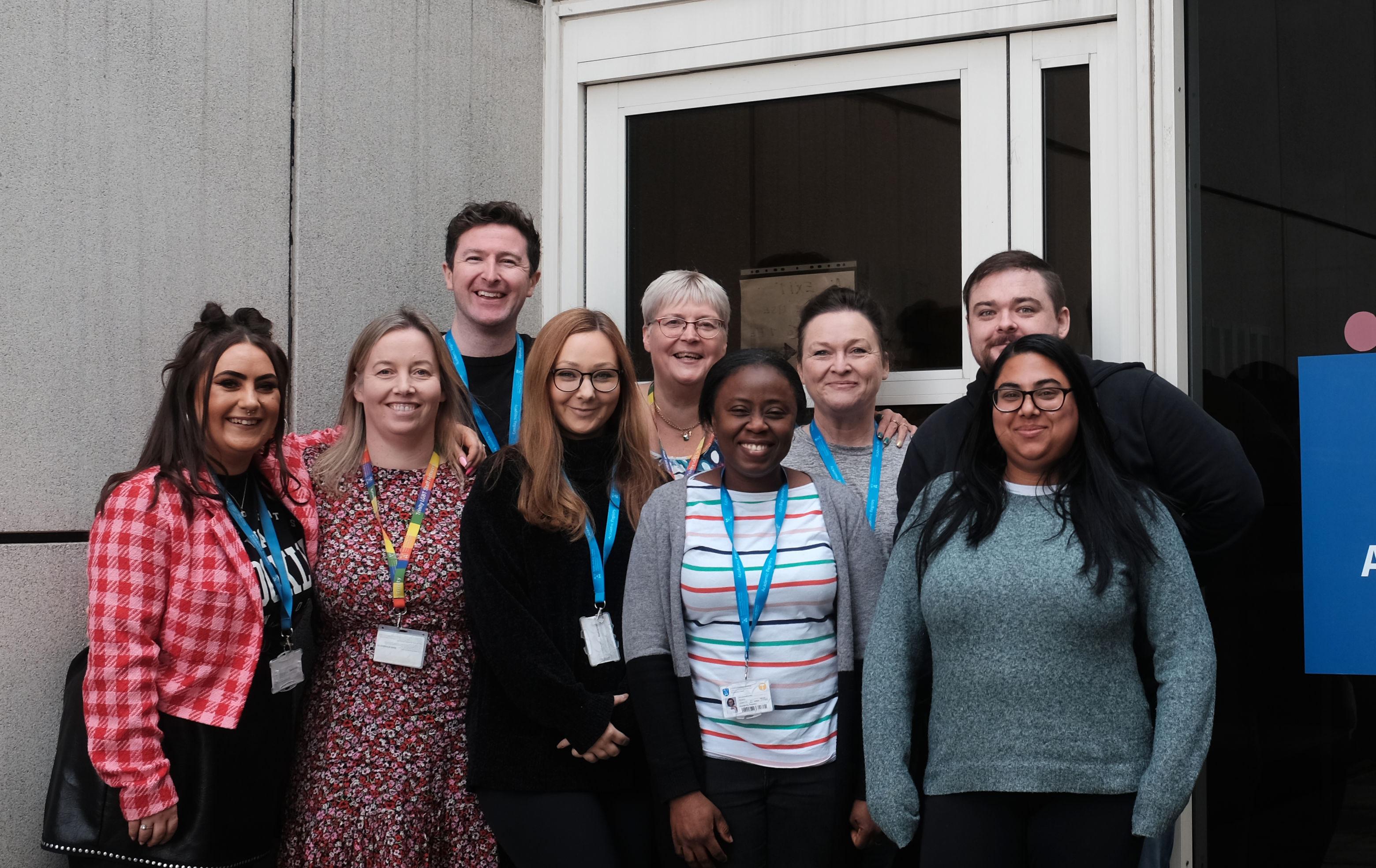
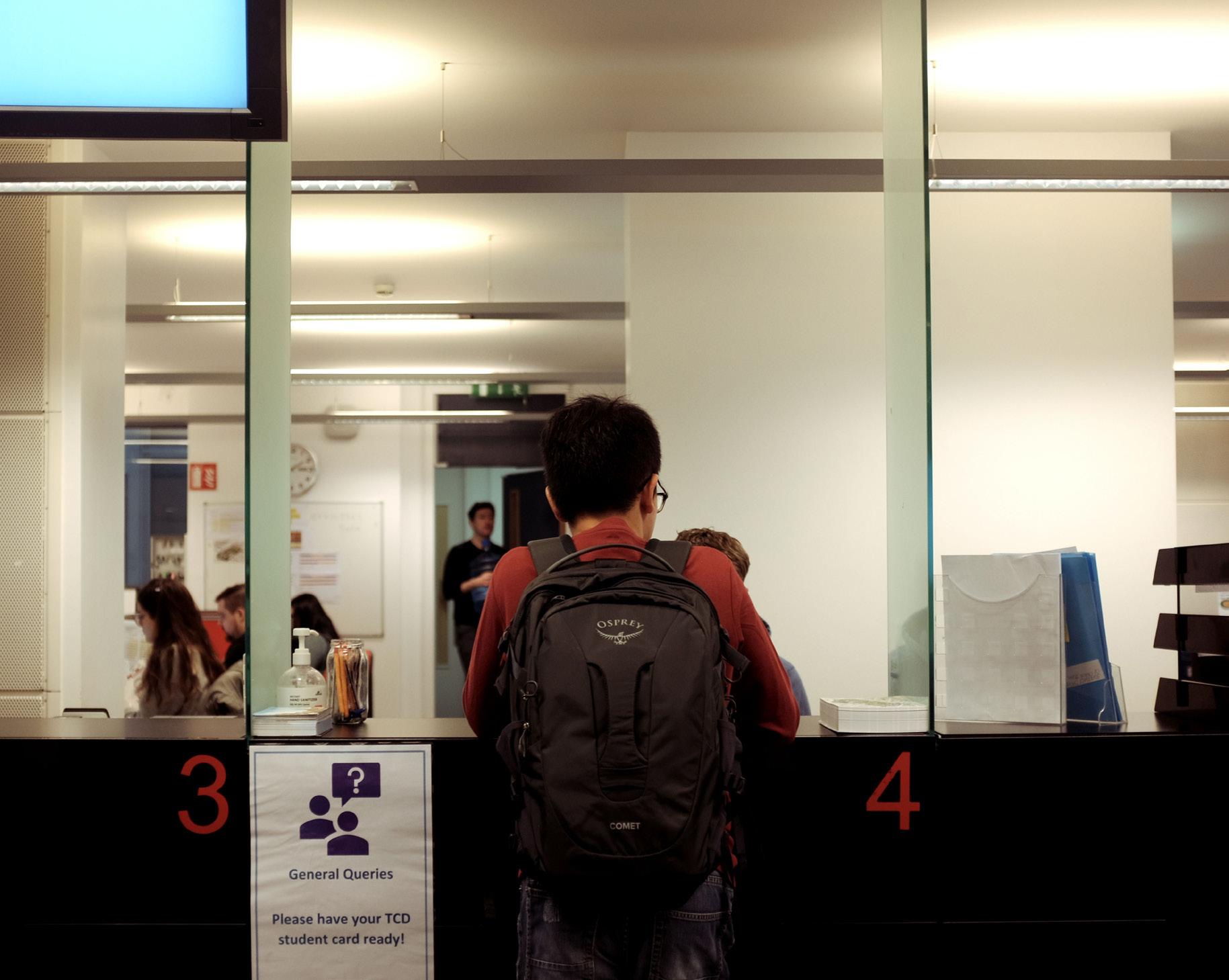
| Tuesday 26 September 17
GRAPHIC BY KAY WILLIAMS FOR TRINITY NEWS
PHOTO BY RORY CHINN FOR TRINITY NEWS
PHOTO BY RORY CHINN FOR TRINITY NEWS
Academics, GMB chamber debates, drunken society balls and packed pub crawls. With this being the experience of most Trinity students, it is o en too easy to forget that our college experience is largely shaped by fellow students. For a select few who get elected to the top positions in student-run organisations, College can become a part-time job. So, what do these crucial jobs entail? And why, when already faced with the pressure of one’s degree, do these students voluntarily decide to take on more work?
e Phil
e University Philosophical Society (‘ e Phil’) – founded in 1683 – boasts one of Trinity’s largest memberships. You will nd their Council milling around in the great halls of the GMB and attempting to entice you to speak at one of their weekly debates.
Reaching the top of this debating society is competitive and the perks of being Phil President are far-reaching. But for a society of this size, the role is no doubt demanding
With an extensive list of debates, competitions and social events, the organisational task of the Phil presidency is onerous and prompts many to go o -books for the duration of their term.
Trinity News spoke with last year’s president, Ellen McKimm, to discover what it is really like.
McKimm, who followed this sabbatical trend, described the role as “very time-consuming and simultaneously very rewarding.” She outlined her main responsibilities which included “managing bookings, securing guest speakers, booking ights, accommodation, managing the subcommittees and the council itself.” While the job can be accomplished alongside one’s degree, as demonstrated by 202122 President, Eleanor Moreland,
have on people’s self-esteem” was a primary motivation for McKimm when organising these events.
McKimm, who is currently in her third year studying PPES, explained that she wanted to give the job her all, stating “I don’t tend to do things by half, so I wanted to take the time and get the most out of the experience.”
Despite the demands, the advantages are plentiful and make this job an experience like no other.
A er a “lot of long hours, hundreds of emails, meetings and calls…to watch it all come together” was, for McKimm, extremely gratifying. In particular, observing “the impact learning public speaking skills can
McKimm also described the “once in a lifetime opportunities” she and her Council were a orded as “second to none”. For one, the role helped her professionally, enabling her to work in the European Parliament in Brussels with the former Tánaiste, Frances Fitzgerald as a trainee. is is an opportunity she believes she “would not have been able to get without my time in the Phil”. As President, she also met many notable gures including President Michael D. Higgins and MP Jeremy Corbyn, encounters which she described as “pinch me moments.” Yet, it seems that for her, it was the personal side that proved to be the ultimate reward: “I now have a lot more con dence in myself and I de nitely trust my gut more when it comes to decisions.” She continued, stating that overall, “I learnt a lot from the things that didn’t go right or could have gone better - which I think is the point of these societies; to make friends, have a bit of fun and learn something along the way.”
Law Society
Another ambitious female leader in one of Trinity’s largest societies is Ruth Brady, last year’s DU LawSoc Auditor. Known

primarily to non-law students for events such as Swing Ball and ‘Masquerave’, this society also organises competitions, speaker panels and career evenings.
Talking to Trinity News, Brady’s commitment to LawSoc started two years prior to becoming president. Although she applied to go o -books once elected Auditor, she decided she just “couldn’t do it. I like having a few plates spinning… and I need to always be moving forward.” Despite acknowledging the importance of having that option, she was delighted with her ability to balance everything, stating “it paid o because I really had to buckle down when I scheduled my study
time”.
While working three other jobs alongside Auditor, enjoying nights out till the bitter end and completing her nal year at college, Brady stated that in terms of responsibilities, it was “a demanding but very reasonable commitment.” With twenty-three other committee members under her management, the strain for her was more mental: “I really had to face myself in the mirror sometimes and just check in to see where I was in all this…You get so caught up in ‘being the Auditor’. You are almost primed to believe it is a CEO-style role where you call the shots…But it’s not! It is one big team, and you creatively direct the vision.”
Current LawSoc Auditor Eoin Ryan also stressed the new territory one enters a er assuming this position. He stated that “it’s only this year…that I fully understand the breadth of the role. e demand on your time is massive and co-ordinating with so many people has its challenges.” He cited a former Auditor’s advice concerning the di culties leading a committee can entail: “‘as Auditor, it’s your job to run towards problems head on and confront and solve them as quickly as possible.”
e sense of collaboration which underpins these voluntary roles is
Tuesday 26 September | 18
What it’s really like to voluntarily take on some of the most demanding student positions in College
KELLY-LANDRY FOR TRINITY NEWS
PHOTO BY FERN
what makes them “so special” in Brady’s eyes. Despite the immense work that goes into the job, she argued that “payment would only encourage the propagation” of the job being viewed as a “CEO role.” “It’s serious,” she stated, “but it should never be taken too
be the Auditor of LawSoc, you can develop this brand with your hands tied behind your back.”
seriously. We have our whole lives to stress about taxes and jobs and relationships – college is a time to kick back and enjoy the ride”.
Ryan emphasised the importance of enjoying volunteer work when taking on these jobs as most who do, “are mainly motivated by their love for the society.” However, he did cite the nancial burden of living in Dublin for an extra year as a reason he isn’t o -books this year. He argued that for some, the unpaid status of the job is “probably a barrier to those who are not fortunate enough” to spend this time on society work, as opposed to in a part-time job during College.
Like most major society positions however, there are perks. e Auditor not only gets free tickets, merch and speaker dinners, they also meet stars; Brady, for example, got to meet Patrick Dempsey. ese bene ts however, extend way beyond the material. Brady explained that the role not only “ ne-tune[d] my time management and leadership skills” but it also “forced me to engage in and acquire experience and contact in marketing, events and sales... you cannot pay for that experience.” Such a grounding has enabled Brady to advance professionally and deepen her network. “LawSoc helped me secure a training contract with PwC,” she said, explaining that a er one of the partners came in for a talk, they got chatting. Currently though, Brady is working for her family business, Coole Swan, as a Global Brand Director; in her mother’s words: “Ruth, if you can
TCDSU
e SU is another organisation in which many students voluntarily take on time-consuming leadership roles. Aside from the Sabbatical O cers, many of the roles within the SU are unpaid and hold a requirement to be “fully on-books,” as STEM Convenor Ruaidhrí Saulnier explained. He added that in terms of responsibility, the role “has previously been described as an uno cial Sabbat position” due to the heavy workload that accompanies it. is can lead to a perpetual level of stress which Health Sciences Convenor Rarosue Emakpor said is “always at the back of your mind.” Consequently, she argues
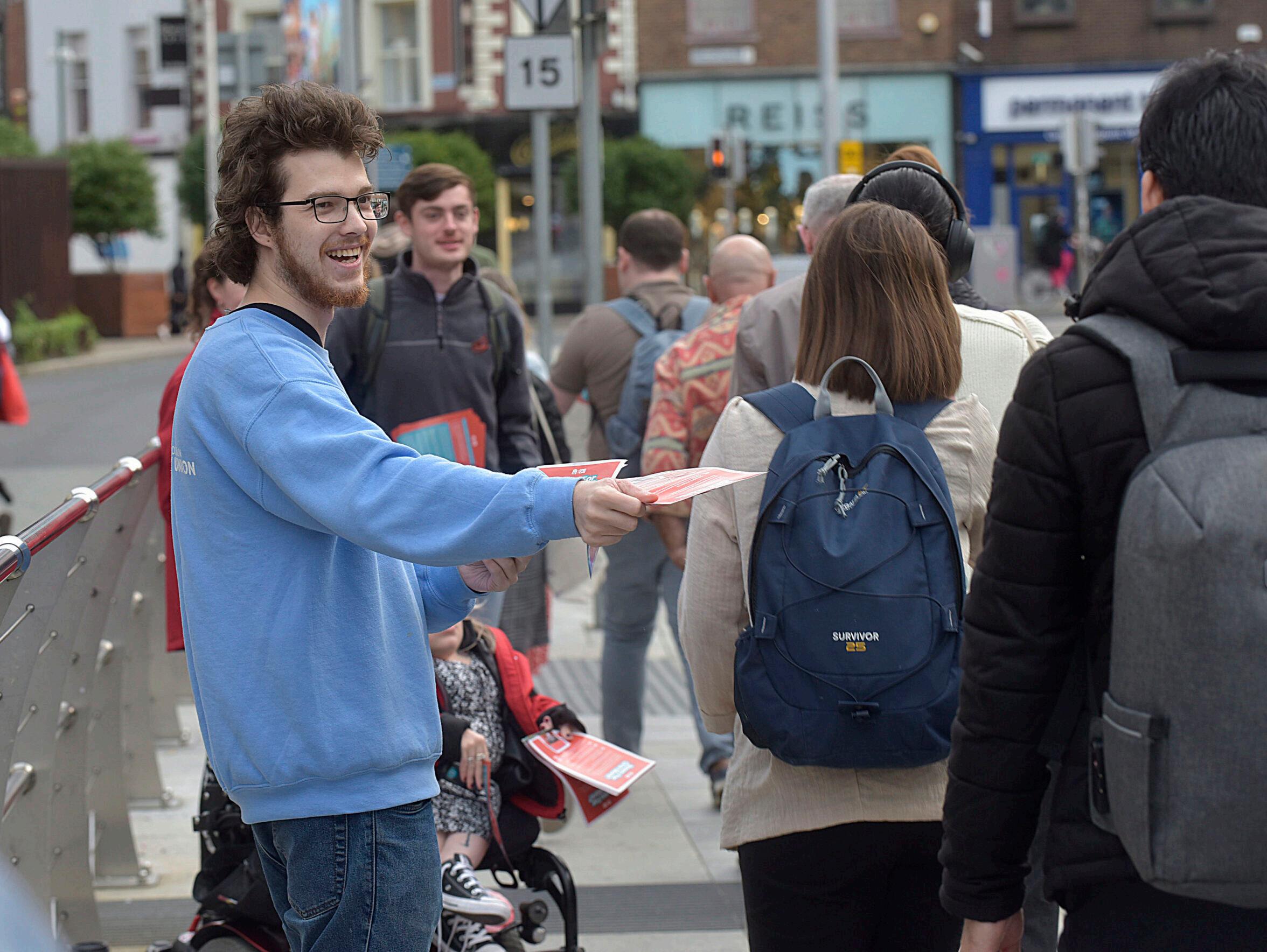
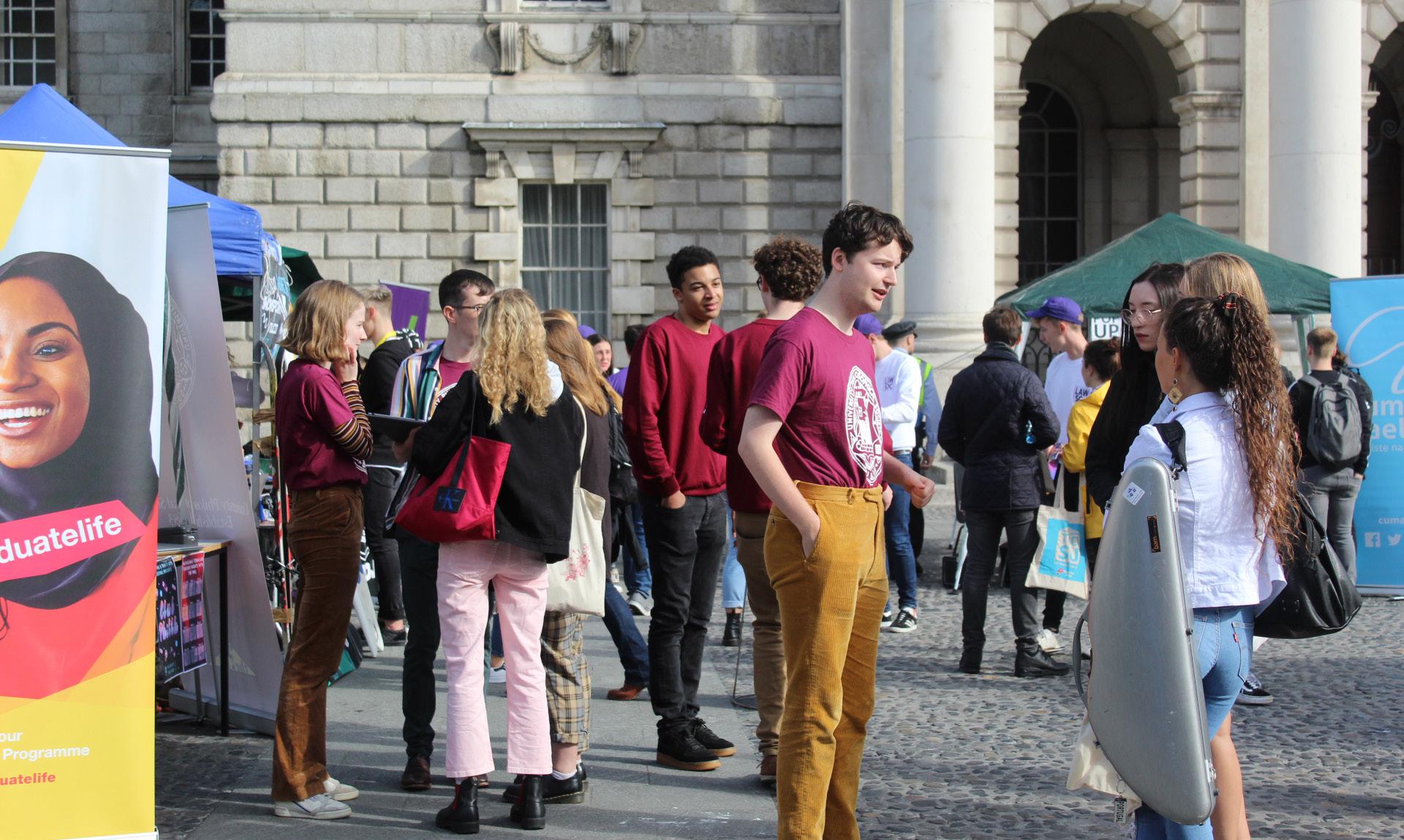
that “there should be at least a little nancial compensation relative to how much of your personal time and resources you have to dedicate to the role.” Yet, as this is currently not the case, Emakpor said that she will try “not to let this role a ect my studies because at the end of the day, this is a volunteer position and I am a student rst and foremost.” With that said, Emakpor stressed her desire to increase diversity and inclusivity in student politics and she strongly feels that she is “making a change in her own little way” by taking on the role this year.
In Sum
Completing university is undoubtedly challenging. Balancing coursework with one’s other commitments is taken to extremes when students like these voluntarily assume major part-time roles. While the jobs themselves are time-consuming and o en mentally draining, it is clear that the lessons they learn about themselves, as well as the unique opportunities these students are a orded, make their e orts worthwhile. And while the need for payment seems to be up for debate, the sense of dedication and pride these students have in their work outside the classroom is not.
| Tuesday 26 September 19
PHOTO BY VICTORIA SALGANIK FOR TRINITY NEWS
PHOTO VIA TCDSU
Trinity News examines the methods and motivations of increasingly prevalent le -wing activist groups
On September 13, a group of students blockaded the entrance to the Book of Kells in protest against College’s decision to increase the amount charged for its student accommodation by 2%, the legal maximum within a rent pressure zone like Dublin.

e most obvious thing uniting these students was, of course, their immediate goal. However, dig a little deeper and it is possible to nd another common – if perhaps not ubiquitous – characteristic: their association with le -wing politics and organisations. Aside from representatives of Trinity’s Students’ Union (TCDSU), the crowd also contained students involved with College’s branch of People Before Pro t (PBP), a le ist political party who’s leader Richard Boyd Barrett spoke at
the protest; the Connolly Youth Movement (CYM); and Trinity’s Trans and Intersex Pride, a group described by its organiser Jenny Maguire as “an expressly socialist movement”. On the same day, the Revolutionary Housing League (RHL) – an organisation which uses the traditional symbol of Irish le ism, the starry plough, as its insignia – set up a stall in the arts block with the aim of recruiting new members.
Common goals and common enemies
e immediate material goals of these organisations are reasonably consistent. In conversation with Trinity News, members of the Trinity PBP, CYM and RHL all referenced the housing and cost of living crises as key motivators of their work. But the commonalities go further than that. “Each issue that comes up is key but we connect it to the wider capitalist system and show that we need to address the fundamental aspects,” Cian Parry, Librarian of Trinity PBP said. is identi cation of ingrained societal issues is a theme embedded in the foundations of each of these organisations; CYM’s website sets out its belief in “systemic aws” in society “occurring as a result of one main feature: the pro t motive”. e concept of the “pro t motive” is also central to the ideas underpinning the RHL, which opposes the “dominance of vulture funds, Airbnbs and multinationals over Irish housing” as part of its Ten Point Political Programme handed out to students in the Arts Building.
Direct Action
While the identi cation of these “systemic” issues is undoubtedly an important part of these groups’ identity, each is at pains to state that they are not merely interested in critique; on the contrary, direct action is at the very core of what they do. Jack Edmunds-Bergin, CYM’s Communications Secretary and Chair of its Dublin branch, tells Trinity News that “organically recruiting” members through their outreach stalls and donation drives is a central pillar of their work. He says that “the workplace is the most fertile place for people to get radicalised”, referencing the groups’ extensive engagement with the workers of Iceland supermarkets during their recent industrial dispute. Engaging with those a ected by the housing crisis, he added, is “a close second” when it comes to recruiting new members
Housing is also a central source of engagement for RHL which hopes to combat the sense of powerlessness surrounding housing issues in Ireland. One member told Trinity News: “ e
actual housing crisis itself is quite depressing but then again, that being depressing is what led me to join a group like the RHL.”
absolutely necessary,” one member told Trinity News. is emphasis on direct action o en brings these groups into contact with one another and fosters the kind of cooperation which has not always been a feature of a perennially fragmented Irish le . Cian tells Trinity News how PBP has worked with organisations ranging from the “Cost of Living Coalition” to “Raise the Roof”: “we don’t try to separate ourselves and make our own campaign [...] we want to put our own members in there.” Jack is also enthusiastic about the CYM’s ability to overlap with groups like the Community Action Tenants Union (CATU), saying that he sees “a strong sense of unity” in the le , though he accepts that his organisation is somewhat “ideologically stubborn”, adhering as it does to Marxist ideals.
Where is this all going?
on September 13; the presence of the RHL on Trinity’s campus; and the election of László Molnár (former chair of Students4Change) as head of Trinity’s Student Union on a radical mandate are all signs that le ist activism is growing in college campuses. “What students can do is show people not just in third-level education but across the country that people-power and protest is actually what’s necessary now,” Richard Boyd Barrett TD told Trinity News, calling for students to take part in planned protests on the housing and cost of living crises on the 3rd and 7th of October. In these endeavours the le will be at the forefront. “Before anything else we’re for students. But yes, this is a le ist movement,” a deputy STEM
Cian Parry of PBP, meanwhile, notes that the organisation’s biggest in ux of members came in the wake of “Take Back Trinity”, a direct action campaign set up to protest tuition fee increases in 2017.
Once members join, these groups do everything they can to get them involved on the ground. Cian emphasises that Trinity PBP is “not a training ground” in which members “get ready to do big boy politics” but a living, breathing, political movement. According to Jack, the CYM is of the same mind. He tells Trinity News how members are actively encouraged to engage with the group’s programmes, be they protest marches or community outreach stalls in working-class areas. CYM’s “cadre” system allows smaller local “cummans” to implement the action best suited to their means and area. e RHL’s action, meanwhile, involves occupying vacant buildings and resisting evictions. “Given the nature of it [RHL] as a revolutionary group, it’s a lot more serious about what it wants to achieve which I think is
So where is all this activism headed? e answer is almost certainly not the Dáil, as all three organisations express scepticism about the Irish political system’s ability to facilitate change. e RHL emphasises that the “housing crisis can not be resolved through the present political system” and Jack tells Trinity News that what the CYM is ultimately working towards is “a popular movement which will overthrow the current ruling class”. e CYM formally disa liated from the Communist Party of Ireland in 2021 and while Jack expresses an interest in establishing a mother party, the feeling seems to be that this is still a long way from being realised. Finally, while PBP does have a parliamentary wing, its recent expression of scepticism towards Sinn Féin in its pamphlet discussing “ e Case for a Le Government” puts its ability and willingness to in uence electoral politics in some doubt. e future of these organisations, then, appears to be on university campuses. e turnout at the rent increase protest
Convenor of TCDSU told Trinity News. For students themselves, it seems unlikely to matter where the calls for change come from; as long as they’re based on principles of equality and are serious about having a real impact on students’ increasingly di cult circumstances, these organisations are likely to be welcomed onto campuses with open arms.
Tuesday 26 September | 20
PHOTO BY RORY CHINN
Like many students, I made the pilgrimage to Stradbally, County Laois for the annual Electric Picnic festival, and ocked to the Electric Arena tent on Saturday to see the Wolfe Tones perform. e thing is, I couldn’t actually see the Wolfe Tones perform due to the tent being overcrowded with fellow youth — a surprising scene to me, given that the Wolfe Tones were formed in 1963. roughout their set, the band performed hits such as Come Out Ye Black and Tans and Celtic Symphony, songs that have been the subject of great controversy as a result of the Republican symbolism associated with them, however, still widely sung in pubs around the country. As the crowd around me chanted “Oo ah up the ra,” I found myself being in two minds about whether or not to join in.
e turnout sparked nationwide debate about the
morality surrounding singing such songs, and the demographic of people singing these songs, primarily young adults, caused even more uproar. Former Taoiseach and architect of the Good Friday Agreement Bertie Ahern noted that young people “should educate themselves as to what happened on this island, about the ferocious trauma that we had from 68 on, the fact that 3,700 people were killed, that we had tens of thousands of bombs, shootings that damaged our image all over the world.” e current Taoiseach, Leo Varadkar, stated that what may appear as a “nice song” to some could be “deeply o ensive” to others.
e political debate that has been sparked as a result of the Wolfe Tones performance at Electric Picnic has led me to believe that we are witnessing, as poet W.B. Yeats coined in his poem Easter 1916: the birth of another terrible beauty in this country. Perhaps it's the history student in me, but I cannot help but be reminded of previous outrages being birthed from the celebration of Irish nationalism, in particular the 50th and 100th anniversaries of the 1916 Rising.
Both of these anniversaries, like the Wolfe Tones’ set, occurred on an island at a political crossroads. Firstly, the 50th anniversary of the Rising took place in 1966, just two years before the o cial outbreak of the Troubles. Re ecting on the commemorations, the prime minister of Northern Ireland, Terence O’Neill, stated that the anniversary celebrations made the outbreak of the troubles “inevitable,” and put the “whole future of Northern Ireland in the melting pot.”
Fi y years on, Ireland was once again at a political crossroads, this time as a result of the Brexit vote. Talks of a hard border in Northern Ireland permeated discussions of how best to commemorate the 100th anniversary of the 1916 Rising. e celebrations were planned to be a way of testing the credibility of the leaders North and South of the border, however, showing that y years on, the act of celebrating Irish nationalism still sparks debate and concern.
e reading of the Proclamation by Michael D. Higgins did not sit well with the Democratic Unionist Party in the North, as they did not appreciate the honouring of the rebels’ sacri ces
at these commemorations. On the other hand, suggestions of inviting members of the British royal family to the celebrations caused outrage amongst members of Sinn Fein.
Fast forward to September 2023, and we see similar debate sparked by the large youth presence at the Wolfe Tones’ set at Electric Picnic. It could be said that the youth of Ireland have caught a case of the “Wolfe Tones syndrome” (as one Hot Press columnist puts it). Despite general hostility towards the activities of the IRA, popular condemnation of their actions can not be taken for granted, given the enthusiasm with which many sing the songs of the Wolfe Tones. Just as in 1966 and 2016, politicians and media outlets are debating and discussing the implications of this national celebration.
e outrage that is constantly caused by the celebration of Irish nationalism poses an important dilemma that I believe is not being addressed by o cials. Is there a fundamental issue with the way in which Irish people celebrate their history, or, is there unsolicited hostility from Unionists towards these commemorations? History has constantly repeated itself when it comes to national
celebration in this country, it's about time we start to address why.
On top of asking these questions, we should be viewing the Wolfe Tones set as an opportunity to reignite discussions on the national question. e youth of Ireland have spoken, quite literally, in their droves, and it’s evident that they are interested in the possibility of a referendum for a United Ireland.


It’s also a chance for us to explore the way in which history is taught in schools in Ireland. As the Wolfe Tones’ song goes: “From our school days they have told us we must yearn for liberty.” Should there be a push towards a more neutral, less nationalist-centred focus on the teaching of history in schools?
Historian Charlotte Lydia Riley notes that “the comforting myth spun from tales of past national glories o en resist the historian’s red pen.” Are we pushing a romantic, idealistic agenda on the youth of Ireland, and ignoring the thousands of people who were killed as a result of the con ict in Northern Ireland? Perhaps it's time, as a nation, to take out our red pen and re-evaluate the ways in which we speak about the past in order to prevent such outrage occuring in the future. I believe that once again, a terrible beauty has been born, and we need to grab it with both hands and use it to address the current political crossroads with which we nd ourselves at.
Romantic Ireland is not dead and gone. It’s been dug from its grave by the Wolfe Tones.

| Tuesday 26 September 21
PHOTO BY KATE BYRNE FOR TRINITY NEWS
You’ve failed an exam and are up for a resit and all you can think about is how your entire academic career rests on that single exam. For many students, this situation is all too familiar. Trinity’s exam policy is stringent and cruel, notably lacking compassion for students who struggle in a particular subject, and arbitrarily punishes the student by forcing them to retake an entire academic year.
Trinity College Dublin stands today as the only major university in Ireland to force students to retake entire academic years for even just singularly failed modules. e only university that comes even close to Trinity’s draconian policies is Dublin City University, and they only force you to retake the module before you can progress to the next academic year.
have under normal circumstances. For a university that prides itself on academic excellence, there is little support for struggling students and no forgiveness for when those students falter.
e University’s obsession with structure and policy results in students getting hurt, rather than helped. With absolutely no exibility in policy, students are forced to either reckon with an outdated policy framework or simply drop out. What’s more, Trinity’s bureaucratic fascinations extend far beyond just its exam policy.
e issues are deeply rooted in Trinity’s entire bureaucracy from the Academic Registry to Revenue. For those familiar with Trinity’s institutions, it comes as no surprise that their exam guidelines are similarly broken. And even in the small amount of leniency that Trinity gives through its appeal procedures, all the guidelines are extremely strict and o en very di cult to nd.
College ad misericordiam” which will yield the PDF guidelines for ad misericordiam appeals as a result. For whatever reason, Trinity makes information regarding its policies inaccessible. And even if you can access such information, the probability that Trinity’s policies will cover your speci c situation is quite narrow.
way it does. e only explanation that I could think of was, “It’s the way it is because that's just the way it is.” Moreover, Trinity’s policies are as they are because of tradition, not logic or compassion.
Never in my life have I ever felt the amount of stress that I did in the weeks and moments leading up to my resits. I was fortunate enough to have a tutor over the summer to help me prepare for the exams and understand material that I otherwise would not have. Not every student has access to that kind of help. Perhaps the argument that is to be made is that other students were able to understand the material the rst time around, so it tracks that those resitting should be able to gure it out by themselves.
But not everyone learns the same, and some people struggle more than others. It doesn’t mean

It is because of this academic policy that so many students, such as myself, nd themselves under extreme stress over the summer, before the exams, and in the exams themselves. As stress decreases academic performance, many students may nd that they did not do as well as they would

To understand the exam policies and appeals policies, one has to know what they are looking for, or else they won’t nd it. Trinity makes it intentionally di cult to obtain this information for whatever reason. To even access the appeals guidelines behind ad misericordiam, you must Google a phrase similar to “Trinity
So what is a student supposed to do when anxiety gets to them and as a consequence they fail their exam? Or if they become bereaved and the university
deems there “isn’t enough proof”? Or what if, under pressure, the student has a mental breakdown? Because even a mental breakdown isn’t enough to avail of the ad misericordiam policy. To get such an appeal, you need extensive documentation including, but not limited to, doctor's notes and proof of death (RIP notice, death certi cate copies). is causes the appeal process to become extremely invasive into the student's personal life and health.
What exactly is the reason for Trinity’s stringent policies? At the time of writing, there was never an explanation given to me as to why Trinity has these policies in place, only that “Trinity applies these rules rigidly.” So that begs the question; if there isn’t a justi cation for Trinity’s policies, other than that they are Trinity’s policies, what is stopping them from changing? Initially, I thought it had something to do with ECTS credits. However, University College Dublin uses the European Credit Transfer System and allows students to repeat modules. en, I considered whether it was a scheduling issue. However, UCD has around 18,000 more students than Trinity and is still able to manage scheduling. Of all the logical reasoning that I could think of, none of it explained why Trinity operates its exam procedures the
they aren’t as smart or aren’t deserving of their place in the course, it’s just that they need a little more assistance with certain things. But even for those who have prepared and understand the material, the compounding stress can drastically a ect their exam grades and they end up in a position where they have to repeat a year. e Irish government doesn’t cover any tuition for repeated years, so Irish students are forced to pay the full 7,000 euros in tuition fees in order to repeat a year, which can be devastating nancially to some students. For international students, it's worse; costing over 20,000 euros just in tuition to repeat a year. And this is disregarding the immense emotional and mental toll that some students may experience having to retake a year.
It all boils down to this: instead of supporting and upli ing students, which is what is expected of an educational institute, Trinity’s unforgiving exam policies punish and break students, causing them to lose faith in their abilities as scholars and in icting unnecessary nancial and emotional burdens on them.
Tuesday 21 March | 22
PHOTO BY RAWPIXEL.COM
Since allegations of abuse and assault rst came out against Manchester United player Mason Greenwood in January 2022, it has been one of the most contentious topics in my family, particularly between my dad and I.
I’ve been a Man U supporter since I was a baby wearing a tiny Ryan Giggs jersey, and have watched the successes and failures of the club almost every weekend during the Premier League season. I’ve never feigned expertise in football: my fantasy team is subpar and I o en ask my dad pretty stupid questions about the sport.
But in recent years, I’ve had far more passion for the business and social justice sides of football rather than the technical aspects. I’m up to speed on the Glazers’ sale of the club and even more on Marcus Rashford’s advocacy around ensuring that children have access to hot meals during school lunchtimes.
So when allegations against Mason Greenwood came out early last year, I was crushed. He looked to be a really strong player with a similar background to Rashford, and loads of fans saw him as having come really far within the team. Even talking to my dad about the allegations in those early days, there seemed to
have been a general condemnation of Greenwood and that he had no further place within the team or within professional football.
Earlier this year, however, the prosecution's case against Greenwood was dropped due to the withdrawal of key witnesses and the emergence of new evidence. Neither of these reasons for dropping the case were ever elaborated on. is prompted numerous discussions with my dad and other male extended family members about Greenwood and how, according to them, he shouldn’t have a mistake that he made as a young man
follow him and ruin his career. However, the withdrawal of a key witness and of new evidence (especially as there are no speci cs available as to its contents) does not mean it was a mistake or that he did not commit the crimes of which he was accused. His guilt is not absolved because his victim no longer wishes to prosecute the crime. Victims of sexual violence choose not to prosecute the perpetrators for a multitude of reasons, including fear of isolation, lack of support, or public backlash. With her alleged perpetrator being a very public gure, these fears are all inherent in the victim’s situation.
e most damning evidence, which will never absolve itself, are the recordings of him speaking to his girlfriend at the time. While persuading her to have sex, Greenwood remarks: “I don’t give a fuck what you want, you little shit” in response to her statements about not wanting to engage in sexual intercourse. roughout the exchange he asks her to “move her fucking legs up,” refers to her as a “twat,” and shows a blatant disregard for consent.

Manchester United made the correct decision by not allowing Greenwood to return, but their exact motives for doing so cause some scepticism. About a week before the decision, it was leaked that the team intended to slowly bring him back to the squad. It was incredibly poorly timed, falling on the day the English women's team secured a place in the 2023 World Cup nal. It was met by
when the allegations were made. Mason and his girlfriend are still involved in a relationship, and whatever healing is occurring between the two of them is necessary and also private. Having Greenwood absolved of his allegations a er having heard the recording, it would be a travesty to have him displayed on a national scale as a face of the team, and an insult to all fans who are victims of gender-based violence. It was undeniably a precarious
mass controversy, largely from women’s sport networks and a signi cant portion of the Man U fanbase. ough it isn’t con rmed, one could heavily suspect that the club’s changing stance on the decision only a few days later was prompted by this public backlash.
Greenwood was a young man
situation. e club put faith into the justice system to decide Greenwood’s fate, and the justice system failed to deliver a verdict. e United Kingdom’s justice system is failing women at an alarming rate, with a steep decline of domestic abuse convictions reported only last year. Additionally, it takes on average almost two years to reach trial stage in most cases of reported rape. at can lead to a victim doubting themselves or their story, as they o en receive no updates on the status of their case.
In a legal sense, Greenwood is not guilty, but is also not innocent. To have him wear a red jersey on the pitch of Old Tra ord would destroy the club’s reputation. A strong forward is not worth complacency and apathy towards perpetrators of violence and rape in any way, shape, or form. Manchester United made the correct decision, but the public outcry holding them to account should not have been necessary.

| Tuesday 21 March 23
PHOTO BY WIKIMEDIA COMMONS
Trinity College Dublin Students’ Union (TCDSU) recently organised a blockade of the Book of Kells in protest of College raising the rent by the maximum legal amount. e day-long protest saw College lose thousands of euros through refunds to tourists who could not gain access to the Long Room and garnered huge media attention across the country.
e recent blockade indicates a return to form for student protest. However, this kind of protest is only e ective when it is as consistent as it is disruptive.
e last major protest to occur on campus was Take Back Trinity in 2018, a protest prompted by the introduction of a €450 exam resit fee. is protest was consistent in its disruption, including using blockades at College’s Front Arch and at the Book of Kells.

ey also staged a days-long occupation of the Dining Hall which quickly escalated to an occupation of Front Arch when College hired Noonan Security Company to block the entrances to the Dining Hall completely.
e most important thing about this protest however, is that through the level of consistent disruption it caused for College, they were successful in their aims. Several areas of the College were targeted consistently by protestors, and during the Dining Hall sit-in, 60 students reported to be without access to food, water, or toilets. Trinity had to relent and abolish the supplemental exams fees.
enough to remember Take Back Trinity, but the impact of this direct action cannot be understated. It was the last time College was forced to relent on such a massive policy, and it only happened because of how consistently disruptive the direct action was. Much like many tourists at the blockade languished missing their chance to see the Book of Kells, many students, sta and tourists might have been irritated having spaces disrupted for days by Take Back Trinity - but doing this ensured students would not have to pay exorbitant fees to retake exams.
While not all the successes of the protest remain, such as a broken pledge to halt increases in international student fees, Take Back Trinity demonstrated the power of stubborn student action. Action which has been missing from student politics for several years.
ere is no starker example of ine ective disruption than the national USI walkout last year.
Almost
On 13 October, 2022, thousands of students walked out of lectures at 11.11am in protest of the rising cost of living. What should have been one of the largest disruptions to third-level education was instead a demonstration that was barely worth putting on Simon Harris’ radar. is protest was polite. is protest was
endorsed by lecturers, many of whom cancelled their lectures so students had nothing to walk out of. is protest had a stamp of approval from Provost Linda Doyle, the head of an institution this walkout was aimed against. ere were scheduled speeches and a scheduled end time to the protest. People walked straight back to classes and cleared out of Front Square in a timely and orderly manner. Weeks of USI and student unions promoting this walkout culminated in the equivalence of a re-drill. How e ective can protest really be when students are being given permission to do it? e momentum of this large protest was completely lost a er the walkout. All of the momentum of a national protest organised by the national union was squandered by a lack of followup action. In its lack of consistent disruption this protest only served as a minor blip in the College year that Trinity and other universities could easily ignore. e demands of that protest were not met because the activists involved were not consistently disruptive enough to insist that they were met.
e COVID-19 pandemic put a stop to student protest and protests that were started before the pandemic lost their momentum. While this was unavoidable at
the time, there are lessons to be learned from Take Back Trinity and other similar protests. ese lessons are from a generation of students who are no longer in
be successful in its aims if it uses the momentum it has garnered from the blockade. Eight hours of roughly 50 students standing in front of a door has had more impact than any other demonstration in years. But having the Book of Kells return to business as usual will not force College into implementing any change. Activists need to show College that they are here to stay and they will disrupt College’s income until their demands are met.
So far, in the wake of this protest they have not. Direct action like this is e ective, Take Back Trinity showed that, but the fundamental di erence here is that they refused to relent in their disruption until their demands were met. If we are to take any lesson from Take Back Trinity it should be that consistency is key in achieving these demands.
College and now for the rst time since 2018, students have picked up a similar mandate: ey will disrupt College’s income sources until their demands are met. However, this action will only
Leaders in both TCDSU and USI have pledged that this year will be di erent and it is important that it is. e cost of living is astronomical and students are dropping out because they cannot a ord their housing. Something has got to give and students like the ones that have been most recently elected have pledged to be unapologetic in ensuring this. ey have taken the rst step with this protest, but they run the risk of losing this momentum if they do not follow it up. Immediately.
Tuesday 21 March | 24
all the students in College currently are not old
PHOTO BY NIKO EVANS FOR TRINITY NEWS
Aer the wettest July on record, Met Éireann, on the 18th of August 2023, formally gave a name to a storm that had subsequently begun ravaging parts of southern Ireland, south-west England and Wales, and the easternmost coast of Northern Ireland: Storm Betty. A er its 130 km/h winds caused severe structural damage to infrastructures in Cork, together with ooding, tra c collisions, and power outages a ecting tens of thousands all across the country, the storm had more-or-less passed by Sunday. Having triggered two separate Status Orange trigger warnings, the following days were again bright and sunny for most of Ireland – après l’e ort, le réconfort, as the French saying goes. e
mean temperatures suspected for the months of September, October, and November are to be between 0.5C and 1C above average nationwide, though decreasing to between 0.2C and 0.5C above average in November. Anyhow, why the contrast? ough the month of September is reputedly resplendent, something tells me that the intense rain and gloom preceding its arrival is not a mere “e ort” for a “réconfort”. Last year’s summer was too glorious to be true; this year’s was similarly too gloomy to be true. Is this simply Irish misfortune – or, perhaps, a consequence of climate change?
Climate Change and Storms

As has been drilled into all our heads, climate change is driven by the accumulation of greenhouse gases in the Earth’s atmosphere. Indeed, one of the most noticeable and destructive consequences of climate change is the increase in the frequency and intensity of storms by the likes of Storm Betty. Tritely, climate change warms ocean temperatures via the process of absorbance of heat energy. And, when the sea surface temperature exceeds a critical threshold, it provides the necessary energy to intensify such storms. Once surpassed, the evaporation of the warm seawater will humidify the air. e latent heat is then to be dragged upwards when it converges with surrounding winds. Consequently… a storm’s a-brewin’!

It doesn’t stop there, however. Climate change possesses the potential to commence a disruption of atmospheric patterns. is can impact jet streams: narrow bands of strong winds. A weakened jet stream could cause a storm to move slowly over one same surface area – thereby intensifying the impact of these storms. One last factor to account for is the fact that climate change-induced storms can create what are called “feedback loops” that may exacerbate the crisis. ese are complex interactions between di erent components of the Earth’s system that may serve to amplify the e ects of climate

change. To exemplify, wild res –like those evidenced in Hawaii and Canada this summer, which have become evermore frequent due to rising temperatures – release enormous amounts of carbon dioxide into the atmosphere. e additional presence of such a greenhouse gas into our atmosphere further accelerates climate change, creating a vicious cycle of warming that ampli es storm activity. e environment external to such wild res is increasingly becoming more conducive to their arising; for, when storms toss sea around, the water can release dissolved carbon dioxide. And, when these storms
make landfall on mangroves and wetlands, which occupy 66,994 hectares of our Island, even greater amounts of carbon dioxide may be released.
John Sweeney, Emeritus Professor of Geography at Maynooth University, deems jet streams to play a secondary, crucial role to that mentioned above. He claims that when these westernly streams exhibit “large meanders”, the weather system slows down, causing a ve-wave pattern in the jet-streams. When fast-moving, they create anticyclones and depressions; though when the pattern stalls, weather changes –in our case across the northern hemisphere – for weeks, resulting in heatwaves and other extreme weather events. is process, he also states, explains the wet conditions we found all throughout July and August: the warming up of continental Europe draws in Atlantic air which is loaded with rain. Anyhow – the circularity is manifest.
If this doesn’t serve as a greater impetus for Ireland to meet its prescribed 2030 and 2050 climate goals, I truly don’t know what will. is is far from being an isolated incident. Indeed, this idea of “feedback loops” is not one limited to storms; it has a potential applicability to most climate-related phenomena. Let us not make disuse of such insightful science.
25 Tuesday 21 March | IMAGE VIA PEXELS
Storms aren’t just a product of ‘Irish misfortune’, but rather a sign of something much more baleful
ART BY ALANNAH HYLAND
From parody deepfakes to TikTok-trending AI-generated art, biometric surveillance for law enforcement to screenplays authored by large language models, the past year has seen arti cial intelligence (AI) become increasingly ubiquitous in our lives. While there has been a welcome increase in investment to fund the development of AI systems, the accelerated growth in capability enabled by advances in computing power has heightened concerns over the development and use of these technologies.
Proposed by the European Commission back in April 2021, the EU AI Act marks a watershed development in the regulation of AI as the rst comprehensive legal framework to address the challenges of a developing AI landscape. But what will it actually mean when it comes into law, and how will it impact the AI tools that we’ve become familiar with?

e EU AI Act de nes an “arti cial intelligence system” as a “system that is designed to operate with a certain level of autonomy”, receives “machine and/or human-provided data and inputs”, and then infers how to complete a predetermined set of “human-de ned objectives” through machine learning, logic/ knowledge-based approaches, or statistical methods. An AI system will then generate some form of output, such as providing information, predictions, decisions, or recommendations, which then in uence the environment with which it interacts. AI systems developed to date focus on performing a speci c task, and cannot operate outside of their predetermined functionality. is includes tools such as Google Translate, email spam- ltering, and Apple’s Siri: all of these systems can complete only a prede ned range of functions. Greater availability of increased computing power has facilitated a considerable rise in Generative AI models, which similarly tend to have a narrow scope, but focus on creating new, original content. Generative AI can identify patterns and structures in input data, and apply this to new, generated content in response to prompts - think ChatGPT, Google’s Bard, and the AI image generators plastered that turn your sel es into Renaissance portraits.
e purpose of the EU AI Act is to ensure better conditions in Europe for the development and deployment of AI. Amidst the excitement of rapid advancements and investment in the AI industry, the new regulation seeks to establish the EU as a hub for trustworthy AI, with harmonised rules across member states to enable pioneering innovations, maximise industrial potential, and protect the fundamental rights and values of citizens. All parties involved from development to distribution of AI models and systems will be held accountable under the act. e act will take direct e ect in each of the twenty-seven EU member states - eliminating the need to transpose the rules into each nation’s domestic laws - though the scope in practice is much broader. Providers of qualifying AI systems in Europe will have to be compliant, regardless of their primary location or base of operations.
Central to the EU AI Act is the classi cation of AI systems by “risk”.
e sliding scale of determined risk will dictate development and use requirements, with four distinct categories: minimal risk, limited risk, high risk, and unacceptable risk. Minimal risk refers to small-fry AI systems that pose little threat to users or wider society, such as AI-enabled video games. Free use of systems deemed to be of minimal risk will be permissible. Limited risk AI systems, such as deepfake technologies and Chatbots, will face transparency and code of conduct requirements to allow users to make informed decisions and ensure they are aware of the technology they are interacting with. AI systems related to transport, education, medicine, employment, and welfare will immediately be identi ed as high risk, and will be subject to a more extensive list of requirements and a “conformity assessment” prior to any market release. Finally,
AI systems considered to be of unacceptable risk will be wholly prohibited; this encompasses any social scoring systems, or AI that actively monitors people in public spaces.
So, what kind of changes can we expect as users of AI systems? For many minimal risk systems, there will be no discernible change or action required. It may lead to greater transparency disclaimers accompanying deepfake technologies, or more comprehensive privacy and use declarations before a user can interact with online chatbots. e act speci cally calls for consideration for vulnerable groups, and ensuring transparent communication of information is available in accessible formats, so information accompanying AI may be presented di erently in future.
Systems identi ed as high risk will face the most signi cant challenges to development, with detailed requirements expected under categories such as risk management, accuracy, cybersecurity, data governance, and human oversight. A high risk evaluation is also expected for AI with a wider scope of capability and greater exibility like ChatGPT (called “general purpose” AI in the legislation) that may be used in various contexts or integrated into other systems. ese general purpose AI models may receive an exemption if high-risk uses are excluded by the provider, or if they circumvent high-risk situations by furnishing the user with greater information. It is also possible that companion legislation will be drawn up to speci cally stipulate how to adjust high-risk criteria for general purpose AI, though this is yet to be con rmed. Likewise, the exact nature of requirements are unknown, though it is expected that failure to comply will carry a he y penalty, with nes anticipated to exceed those levied for GDPR breaches.
ere are two interesting exceptions to compliance rules. Firstly, law enforcement authorities are permitted to deploy some unacceptable risk technologies in
competitiveness in the AI industry. An open letter to the European Commission signed by executives of some of Europe’s leading companies - including C-suite representatives from Renault and Siemens - raised “serious concerns” about the threat of the laws to Europe’s “technological sovereignty”, and their failure to address “the challenges [they] are and will be facing.” ere are concerns that excessive compliance costs and increased liability risks will lead to companies withdrawing from the block, therefore leading to rescinded investment and damaging European competitiveness. MEP Dragos Tudorache, who led the development of the dra law, dismissed such concerns in a statement, calling it “a pity” that protests from stakeholders have undermined “the undeniable lead that Europe has taken [on regulating AI].”
limited circumstances. However, it is still expected that the legislation could disrupt plans for greater leveraging of these technologies by governing bodies, such as the Irish Government’s proposal to introduce facial recognition technology to an Garda Siochána.
Secondly, much like similar rules under EU copyright law, AI technologies such as deepfakes may avoid greater transparency requirements if they are evidently for creative, satirical, or parody purposes - a welcome relief to those partial to the comedic relief of AI-generated content on social media.
Responses to the act have been mixed, with some groups - such as the Irish Council for Civil Liberties - welcoming the decision, while others have expressed fear that the dra legislation will harm Europe’s
e EU AI Act will now be subject to negotiations between the European Commission, European Council, and European Parliament, where details are to be ironed out in advance of its signing into law, expected at the end of 2023. A European Arti cial Intelligence Board is set to be established to oversee implementation and harmonisation across member states, with compliance expected following a 24-36 month window. Although details of exact requirements and execution are unclear, it is undeniable that the new laws will set a precedent for AI regulation as the rst comprehensive framework to address these new technological challenges. Whether it leads to more responsible development and use of AI as is hoped, or smothers technological innovation in Europe remains to be seen. In any case, it marks a signi cant step towards reshaping the development and use of these technologies to t our societyand not the other way around.
Tuesday 21 March | 26
ART BY FAYE DOLAN FOR TRINITY NEWS
A guide to the world’s rst AI regulation
Forlornly, the title is misleading. With all due respect to Shane O’Mara, if my interpretation of the title stands correct, the book hardly discusses a novel science. Consequently, I nd the reviews of the Irish Times and e Scientist rather humorous. e former declaimed the book to be “[d]elightfully wellwritten, surprisingly re ective and humorous”; the latter simply describes it as “[e]njoyable” –leaving the purported aim of the book entirely undiscussed. Such language is re ective of the reviewing process Orwell so aptly and humorously described in his Confessions of a Book Reviewer (to be found, as I hold it, in his compendium Books vs. Cigarettes). Needless to say, I found the book – though verily enjoyable – devoid of any revolutionary scienti c substance.
e book summarily deals with the importance of memory and conversation – both of which reinforce and inform each other in a catoptrical manner. In e ect, a society without memory, O’Mara writes “has no capacity to repair itself; it has no capacity to evolve; it has no capacity to adapt; it had no capacity to remember and learn”. (p. 47) In a similar, more developed, vein, he writes that “[i] ndividual thoughts and memories serve as the building blocks for constructing the shared reality of the group through conversation.
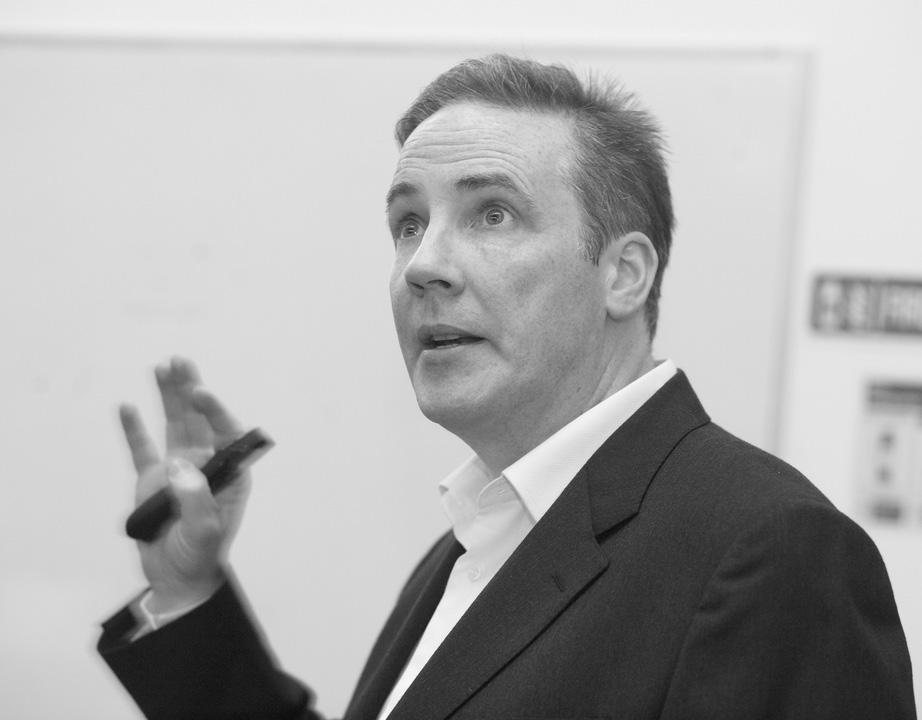
e group’s collective understanding is shaped by the individual thoughts and memories shared and, in turn, these collective understandings shape reality for the group”. (p. 60) is reality is –again – buttressed by our singular and collective memories, which we must recall in order to tell eachother ‘stu ’ about ourselves and the world. is links to his primal, overarching idea that institutions, nations, &c., are built on human knowledge and conversation (that much is self-evident!); and we should think of them “explicitly as shared realities where we do cognitive work together”. (p. 73) ese, therea er, inform our exterior, social and – consequently, or more-so plausibly – political environment. A good illustration of the former point would be how the memories we harbour and the way we talk about ourselves to
others are shaped by our external realities: indeed, conversation in uences the neural interaction between the hippocampus and the amygdala, and therefore impacts memory. Evidently, this may also mean that we may con dently rely on other parties for richer memory recall.
As above-mentioned, his grande idée is that “all nations initially began as conversations – conversations where people dreamed of what might be, what resources could be theirs, what could be taken, what could be defended against others […]”. (p. 161) is much, Joyce, Nietzsche, Hegel, Herder, Popper (the list could go on ad in nitum) had already gured it out. ough the substance proceeded under to reach that conclusion is here nowise similar to that employed by the list of authors above-adduced, they nonetheless came to that exact conclusion.
To quote, inter alios, Popper:––
“[l]anguage is a social institution without which [progress] is unthinkable, since without it there can be neither [growth] and progressive tradition”. ( e Poverty of Historicism: 143) Progress, as Popper unassailably here intended to
mean, connotes deliberate action towards a perceived ideal – a “what might be”. e redundancy is manifest. To further-accentuate this redundancy, though in di erent form, consider these three passages:
(1) “it is through a ‘communal ‘schema’ that collective memory and conversation, identity, and imagination intersect” (p. 164);
(2) “[t]he idea of nationhood can only arise because we are socialised into a common, cognitive endeavour: an endeavour bringing together memory, imagination, and conversation to construct a shared reality at scale. e consequence is to bind us cooperatively, cognitively, and e ectively together, shaping our very identities”. (p. 170)
(3) “[o]ur capacity to remember together and critically, to talk about it together, has fashioned our world”. (p. 198) e same idea is repeated thrice. e above-examples are, of course, inexhaustive of such pleonastic discourse.
ough Chapters III – IX were in sum repetitive, Chapter II imparted a few interesting factoids. In it, O’Mara described the historico-scienti c development of experimental psychology: rst being conducted through introspection via the careful application of Wundt’s methods. As introspection slowly fell into disfavour, it was replaced by behaviourism, and then –ultimately – brain scan analyses. is ultimate method is now exercised coevally with notetaking and daily phone mood surveys. ese surveys, he writes,
have allowed us to gain insight on – inter alia – what preoccupies our thoughts. He quotes a study from Roy Baumeister, the results of which interestingly stipulate that we concentrate predominantly on the “here and now” (53%).
More interesting scienti c factoids are interspersed throughout the rest of the book. Chapter V includes an enjoyable digress on the process of forgetting, in which O’Mara claims that our autobiographical memories show a standard forgetting curve which stabilises at a particular level of recall – itself contingent on who, what, where, and when factors. In chapter VI, we are told how –through the process of collective deliberation and the idea that external narration informs the “self”– couples who “click” do so because they share the same worldview.
Anyhow, pace O’Mara, I found myself latching more onto these fantastic factoids than what you ostensibly deemed to be revolutionary scienti c material. Material which, truthfully, could’ve been printed out on a singular page. As such, a simple ‘enjoyable’ may be the best review this book could get.
| Tuesday 21 March 27
A simple “enjoyable read” may be the best review this book could get
IMAGE VIA AUDIBLE
Intermediate

Ussher Celtic no match for League stalwarts Bohs with a defeat of 5-0

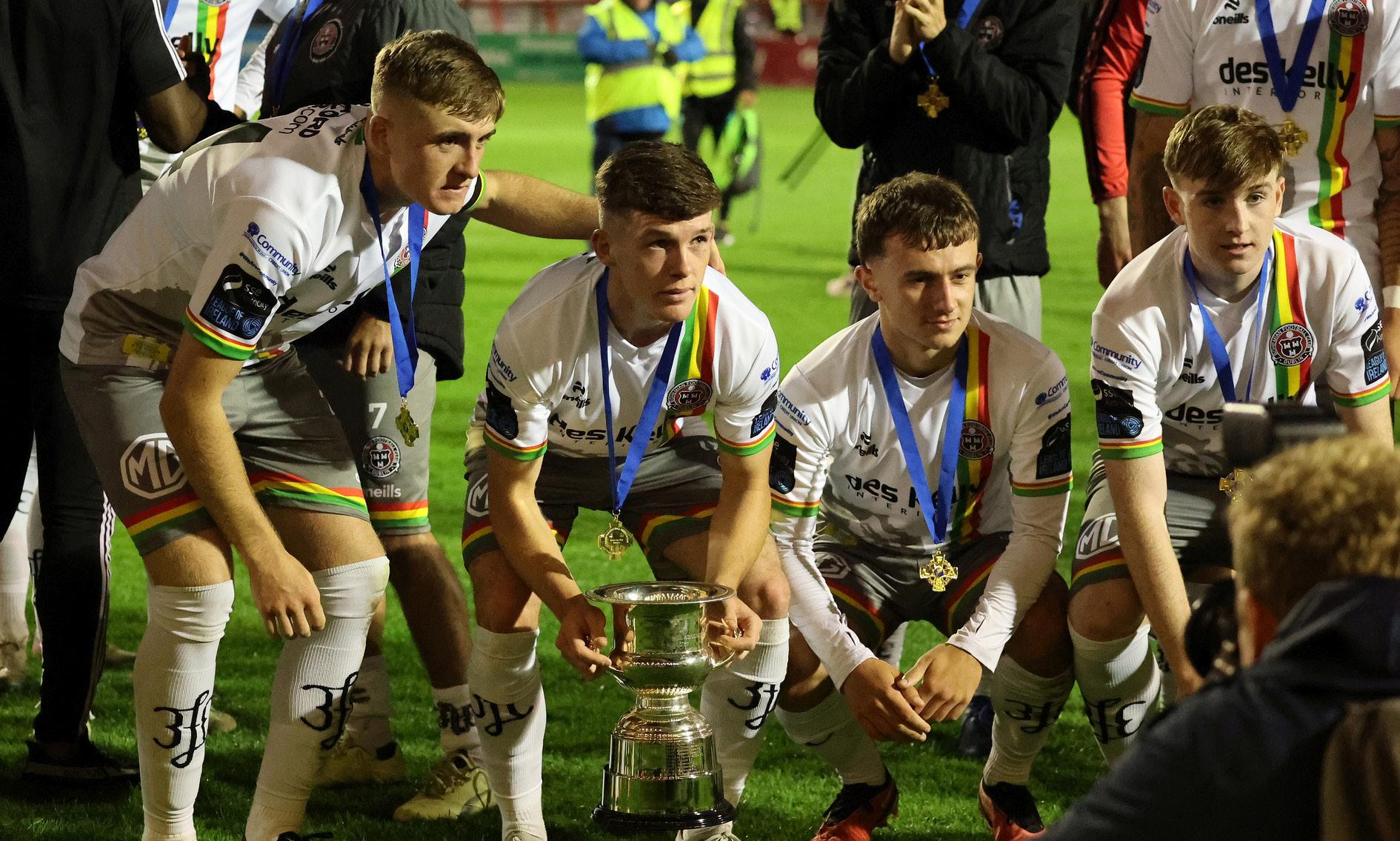
28 Tuesday 26 September |
PHOTO COURTSEY OF STEPHEN BURKE
PHOTO COURTSEY OF STEPHEN BURKE
ere’s optimism across College for major sporting success this season. Should you want to be part of it, most clubs are still accepting signups for “taster” memberships via Fixr.
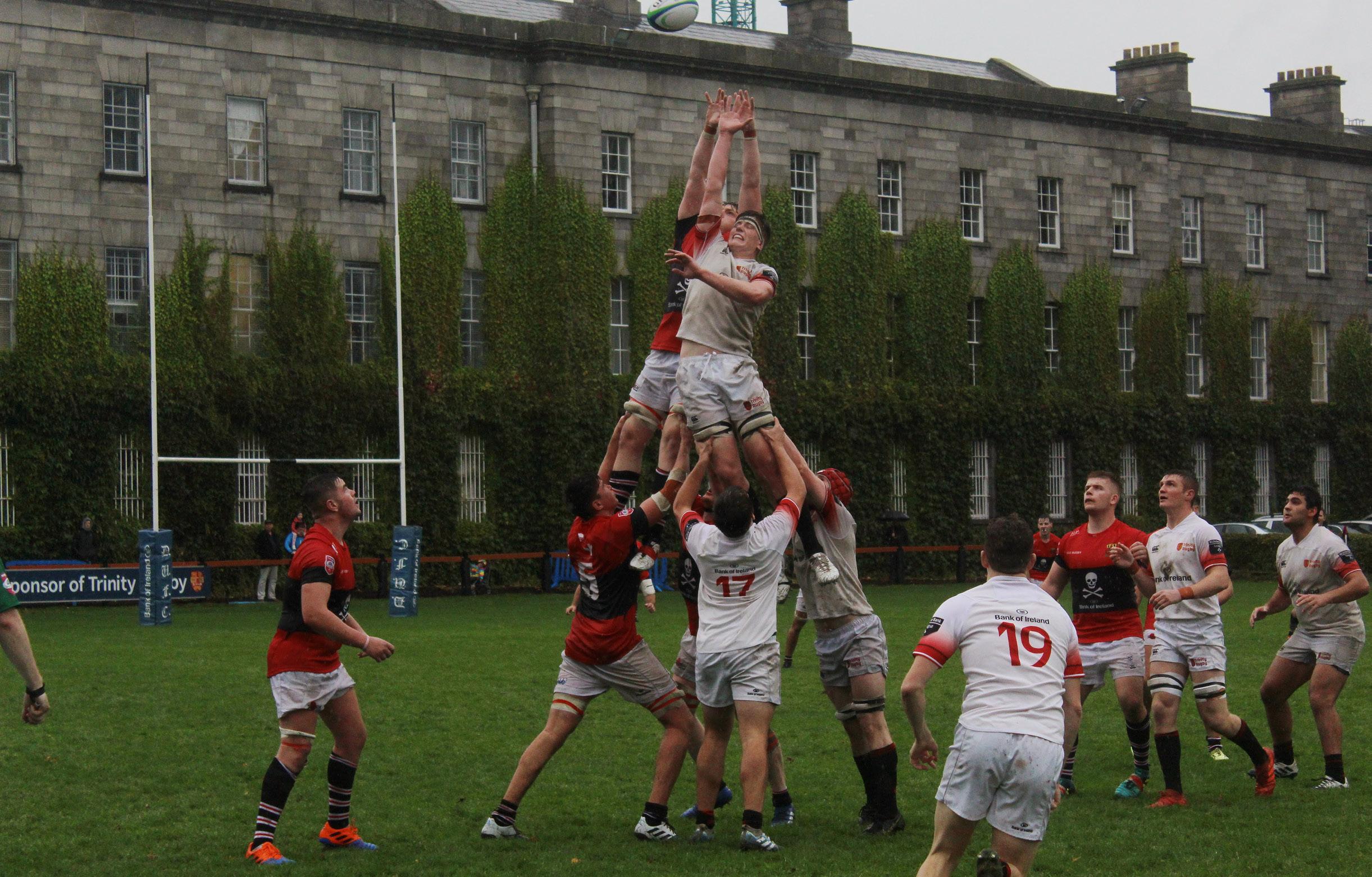
DU Aikido was established last year, meaning 2022/23 was the rst season which saw many participants learn Japanese grappling self-defence techniques. DU Aikido will this year train on Wednesdays, from 4 - 6pm at Bell Centre Webster Gym. In order to join the club, join its GroupMe at https://groupme.com/join_ group/89208174/mnkktJ0l, and follow their Instagram @trinityu_ aikido to stay up-to-date. Contact alagrone@trinity.edu for more information.
DU American Football will train every second Saturday of the year, commencing on September 16 in Santry Sports Grounds from 11am - 2pm, with both new and experienced players welcome to participate in both Flag and Kitted Football sessions. e 2022/23 season saw DU American Football compete at Intervarsity and Division 2 National League level. In order to get more information and join the club, email duafc@ tcd.ie or contact the Instagram page @tcdaf.
e ‘Harriers’ or distance group will train four times weekly this year - Mondays and ursday easy run from the Science Gallery at 6pm, Tuesdays 6pm in College Park, and Saturdays 10am at Magazine Fort, Phoenix Park for a hill session. e Track & Field group will train on Mondays from 6:30pm - 8pm and Wednesdays from 7:30pm-9pm in College Park. e 2022/23 season saw
the ladies’ team claim a fantastic bronze at the IUAA cross-country championships, while a squad training trip to Lanzarote was a highlight for many members. DU Athletics are best contacted via Instagram @trinity_athletics, where you can also sign up to the Fixr membership through the link in bio, or alternatively email harriers@tcd.ie.
DU Badminton enjoyed some great successes in 2022/23, reaching the nals of the Student Sports Ireland competition and the quarter- nals of Intervarsities. Competing in the Dublin League, the ladies’ team saw a win in the Division 5 nal and a narrow loss for the Division 6 team in their nal. Social badminton sessions also saw regular turnout of over 30 students. Training this year will take place at the Main Hall of the Trinity Sport Centre; on Tuesdays from 8pm - 10pm, Wednesdays from 8pm - 10pm, Fridays from 7am - 10am, and Sundays from 9am - 11am. A purchased Fixr membership will give you access to either the social or competitive side of the club, including the opportunity to try out for their competing teams. To get in contact with the club, reach out via Instagram to @tcdbadminton or email dubadmin@tcd.ie.
DU Camogie trains on Mondays and Wednesdays at 7pm in Santry Sports Grounds,
with a complimentary bus departing from Nassau Street at 6pm. DU Camogie enjoyed a stellar 202/23 season, reaching the semi- nals of the All-Ireland collegiate competition. For more information on DUCC, contact @ tcdgaaclub on Instagram or email neil.odriscoll@tcd.ie.
Trinity Climbing/DUCC hosts climbing sessions twice a week at the climbing wall in the Trinity Sports Centre, on Tuesdays and ursdays from 7pm - 10pm. Belay training is sign-ups only and will take place from 6pm - 7pm on those evenings, while outdoor events take place periodically throughout the year and are announced in their emails and social media channels. e 2022/23 season saw a notable win for Trinity at the Irish Climbing Intervarsities in Belfast. For more information, contact the club at climbing@tcd.ie or via Instagram at @trinityclimbing.
For 2023/24, DU Fencing will train in the Ancillary Hall of the Trinity Sports Centre on: Monday, 8pm - 10pm and Friday, 3pm - 5pm for Beginners; ursday, 8:30pm - 10pm and Friday, 5pm - 7pm for Intermediates; Wednesday, 7am - 10am for the Development Squad; and Monday, 8pm - 10 pm and ursday, 7am - 10am for the Senior Squad. Last season saw DU Fencing’s athletes take 77 medals at a variety of events around the
country, as well as winning three out of six Intervarsity events, and defeating UCD “soundly” to retain the Colours trophy. For more information, contact the club via email dufencing@gmail.com, or reach out on Instagram to @ trinityfencing.
DU Gaelic Football will train on Tuesdays and ursdays this year, time and venue TBC. A er a win in the Division 2 Fresher’s All-Ireland in 2021/22, hopes were high for a positive year for the club. Although silverware may not have been obtained, DU Gaelic Football embodied the notorious spirit of Trinity College GAA in many performances throughout the year. For more information on DU Gaelic Football, contact @ tcdgaaclub on Instagram or email neil.odriscoll@tcd.ie.
DU Ladies’ Gaelic Football are yet to con rm training times for the 2023/24 season. However, over the 2022/23 season, Trinity LGFA elded teams in Division 2 and Division 6 of the women’s collegiate competition, with the 1s reaching the quarter- nal and the 2s putting in some great performances over the year. For more information on Trinity LGFA, contact @tcd_ lgfa on Instagram or email neil. odriscoll@tcd.ie.
DU Golf trains out of Portmarnock and Royal Dublin
Golf Clubs, with the training schedule set to be nalised postfreshers’ signups. Intercollegiate matches take place regularly, and an annual highlight is a US tour, commencing this year on October 19, where they will compete against top universities such as Havard, Yale, MIT, and Columbia. Social outings are provided for golfers of all abilities, as well as nights out. For more information, contact the club via Instagram @ dugolfclub, or reach out directly to secretary, Mikey Mina-Royanane at 087 390 9936.
DU Handball trains on Tuesdays and ursdays, in the Main Hall of the Trinity Sport Centre from 5pm - 7pm. A purpose-built handball/racquetball/squash alley under Printing House Square is currently under renovations, however training will hopefully move back there once completed. Only established in 2022/23, the club had a stellar season, with captain 2023/24, Cuileann Bourke travelling to Arizona to compete in the 70th USHA InterVarsity Handball Competition, as well as winning the OneWall Women’s Open Collegiate Championships. To contact the club for more information, contact Cuileann Bourke, via email or phone - handballtcd@gmail.com & 086 2244 186, or reach out via Instagram to @tcdhandball.
DUHC saw a positive 2022/23
Tuesday 26 September | 29
As the new year kicks o , Trinity News keeps you up to date on the latest achievements, events and activities from some of College’s 49 sports clubs and how to get involed
PHOTO BY VICKY SALGINIK FOR TRINITY NEWS
season, with a number of integral new recruits to the Squad resulting in some big wins throughout the year and a strong league nish from all three teams. is year, DUHC 1s and 2s will train on Tuesdays and ursdays from 7:30pm - 9:30pm at the Santry Sports Grounds, while the 3s will train at 5pm on Wednesdays in Botany Bay. To join or contact the club, use Instagram @dublinuniversityhc or email hockey@tcd.ie.
DULHC will again train out of the Santry Sports Grounds this season. Sessions for the 1s will take place on Mondays and ursdays from 7:30pm - 9:30pm, for the 2s on Mondays and Wednesdays from 7:30pm - 9:30pm, for the 3s on Tuesdays and ursdays from 6pm - 7:30pm, and for the 4s on ursdays from 6pm - 7:30pm. Last season saw a record number of registration for DULHC, which resulted in four vibrant and active squads operating for the duration of the season. For more information, contact the club at trinityladieshockey@gmail.com or via Instagram at @trinity_ladies_ hockey.
DU Hurling trains on Mondays and Wednesdays, time TBC, in Santry Sports Grounds. An actionpacked 2022/23 season saw the Senior team reach the semi- nals of the Ryan Cup, losing out in a tough battle to MIC urles.For more information on DU Hurling, contact @tcdgaaclub on Instagram or email neil.odriscoll@tcd.ie.
DU Judo trains thrice weekly, in Ancillary B of the Trinity Sports Centre - from 6pm - 10pm on Mondays, 9pm - 10pm on Wednesdays, and 6pm - 7pm on ursdays. e 2022/23 season was full of highs for DU Judo, with many members passing their grading to advance to higher belts, as well as seeing signi cant growth in membership. e club also won ve medals at Intervarsities and are hopeful for more success this year! For more information, contact the club at dujudoclub@gmail.com or via Instagram at @dujudoclub.
For 2023/24, DU Karate will train in the Ancillary Hall of the Trinity Sports Centre, on Tuesdays from 7:30pm - 9pm, and from 10am - 12pm on Saturdays. 2022/23 saw continued growth for the club, with a presence at both the Dublin Intercollegiate and Intervarsity competitions. e Fixr link can be found in the club’s Instagram bio @du_karate, and you can also email karate@tcd.ie for more information.
DU Boat Club trains daily, at the Boathouse in Islandbridge, the Trinity Sport High Performance Gym, and Blessington lakes. In the 2022/23 season, DUBC saw many notable successes, the highlight of which was a victory in the Men’s Club 8+ at the Irish National
Championships in July. DUBC are accepting both beginner and experienced rowers and coxswains to their squad; for more information, contact @duboatclub on Instagram or email captain@ duboatclub.com.
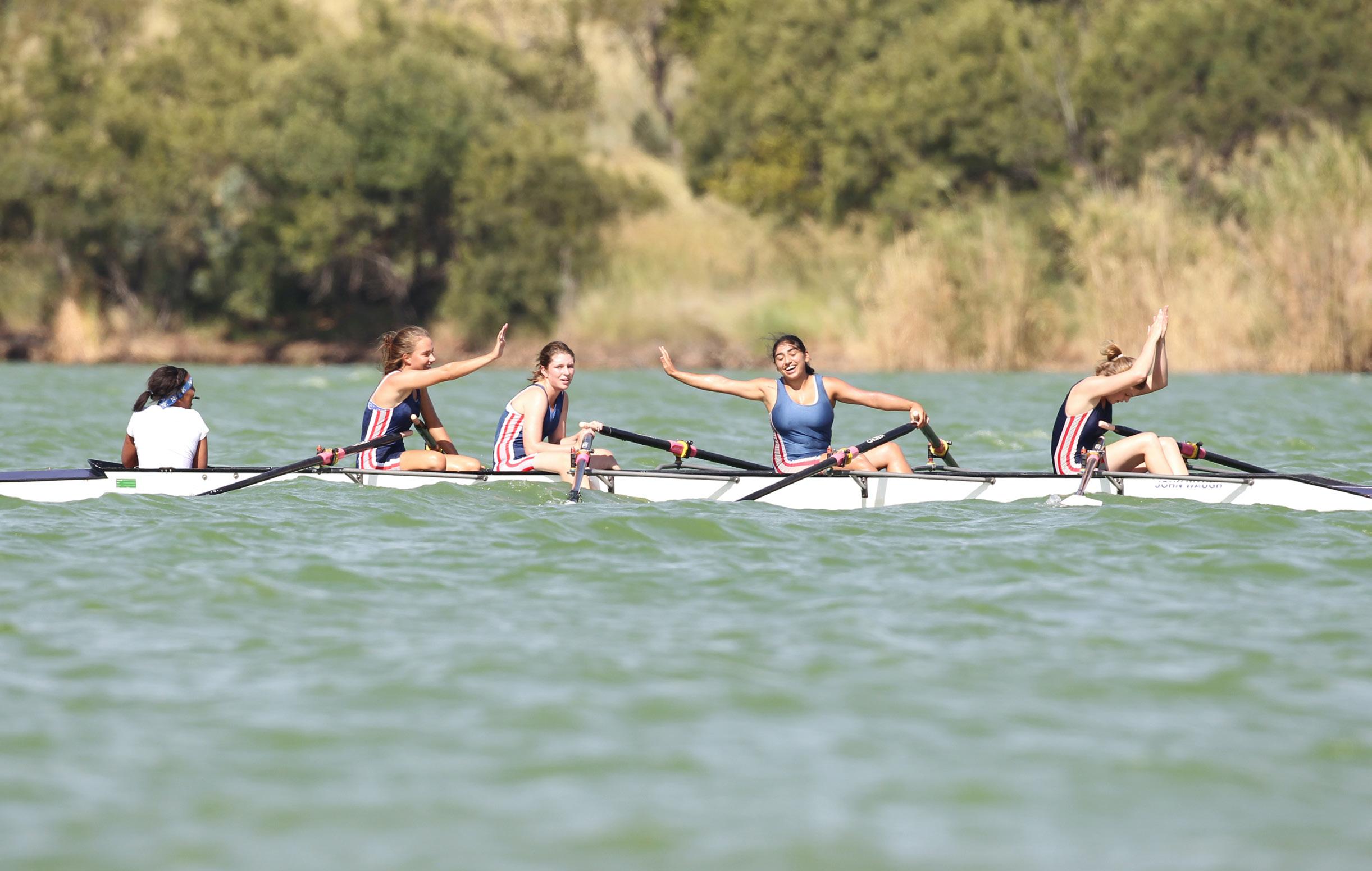
DU Ladies’ Boat Club trains daily, at the Boathouse in Islandbridge, the Trinity Sport High Performance Gym, and Blessington lakes. Over the 2022/23 season, DULBC’s Novices claimed many huge wins, including at the Colours Boat Races, the University Championships, and the National Championships, where member, Grace Healy also won the Intermediate 1x. DULBC are accepting both beginner and experienced rowers and coxswains to their squad; for more information, contact @dulbc_ rowing on Instagram or email dulbc1976@gmail.com.
DUFC Women’s train at 7pm on Tuesdays and ursdays in College Park. e 2022/23 season saw DUWFC take a big win in the Division 1 playo nal to retain their position in the Leinster League Division 1 for a second season. DUWFC are accepting both beginner and experienced rugby players to their squad; for more information, contact @trininitywomensrugby on Instagram or email dufcwomensrugby@gmail.com.
DU Sailing trains four times weekly from Royal St. George Yacht Club. e 2022/23 season was full of highlights, including a dominant win against UCD
at the Intervarsity Colours Championships. To join the Club, stay up-to-date on its activities or get more information, check out the Instagram page @trinitysailing or email info@trinitysailing.com.
DUSSC will be running dry slope training in Kilternan later in the semester, with date and times to be announced. In January 2023, DU Snowsports held their annual ski trip in Val orens, where 500 College students accompanied the club to the slopes to ski, snowboard and aprés to their heart’s content. To get more information, contact the club via Instagram at @ dusnowsports.
For experienced divers, registration is currently open until September 21st via Fixr. New divers can sign up to attend a Try Dive event on September 18 at the dusac.org website, before registration opens for new divers at 9am on September 21 - sign ups and induction will take place at 6:30pm that evening. For more information, contact the club at dusac.membership@gmail.com or via Instagram at @dusubaquaclub, or check out the website dusac.org.
Training times are still being nalised for DUSC, but a highlight of their 2022/23 season was a celebration of their 125th anniversary, bringing past and present members of the club closer together for a successful year. To contact the club, check out their Instagram @duswimclub or email duswim@tcd.ie. eir Fixr membership can also be accessed through their LinkTree, linktr.ee/
DU Table Tennis trains in Trinity Sport Centre’s Ancillary Hall B, on Tuesdays and Wednesdays from 6pm - 10pm and Sundays from 11am - 1pm. 2022/23 saw a massive achievement for DU Table Tennis, with the ladies’ team winning the Intervarsity Ladies’ Team Cup. To contact the club for more information, email tableten@tcd. ie or reach out on Instagram to @ tcdtabletennis.
DU Tennis will this year train on Fridays, 6pm - 9pm at Botany Bay for beginners; Wednesdays, 6pm - 9pm at Botany Bay for intermediates (TBC); and Mondays, 7pm - 9pm for advanced players. Over the 2022/23 season, Trinity Tennis enjoyed a fantastic year, coming third at the HEC European Championships at Roland Garros, while the ladies’ team reached the Irish Intervarsity nals. For more information, contact the club at tennis@tcd.ie or via Instagram at @trinity.tennis.
DU Barbell trains at the Ancillary Hall in Trinity Sports Centre from 2pm - 4pm on Tuesdays, from 11am - 1pm on Wednesdays, and from 7:30pm - 10pm on ursdays. Over the course of the 2022/23 season, Trinity saw its members compete in European and World Championships, as well as bringing home a number of national titles for the club. In order to get in contact with the club, DM their Instagram @trinitybarbell, or email duweightli ing@gmail. com or doherta4@tcd.ie to contact
DU Wind & Wake’s training times are highly variable, given the weather requirements for safe participation. However, as much notice as possible will be given to members via the email list to members and on Instagram @ trinity_wind_wake. Wakeboarding sessions will be held on weekends, with travel to Ballyhass Wakepark in Cork or Let’s Go Hydro in Belfast. Kitesur ng sessions will be held on Dollymount Strand, and windsur ng in Dún Laoghaire. e Fixr membership can be found in their Instagram bio, which you can also reach out to for any questions about the club - alternatively email windsurf@tcd.ie.
| Tuesday 26 September 30
duswim.
the President, Aisling DohertyMadrigal, directly.
IMAGE VIA PEXELS
Although growth of women’s sports over the past decade has been impressive, why is it not yet higher?
Bre ni Park will host Ulster’s preseason challenge match against Glasgow

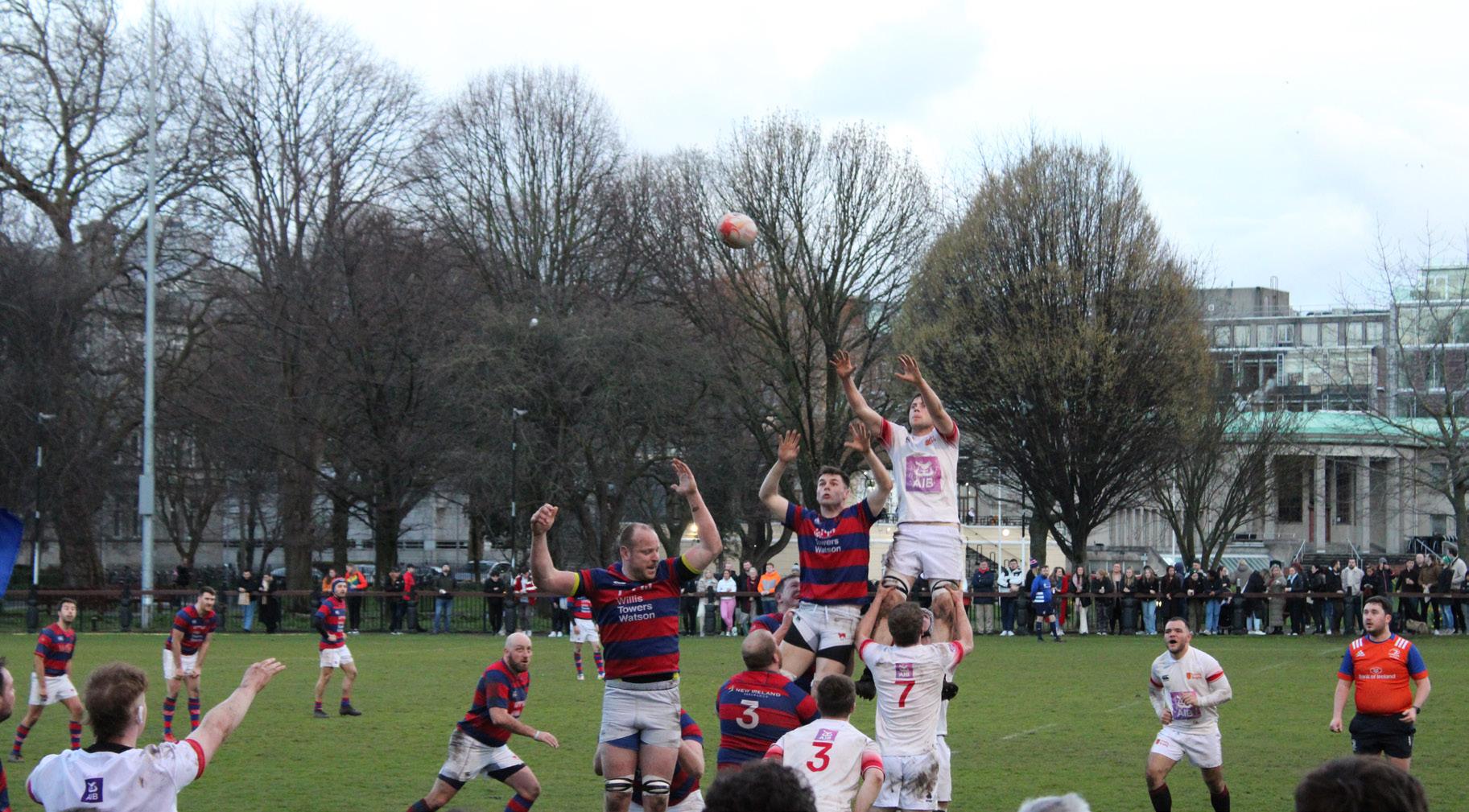
Tuesday 26 September | 31
PHOTO BY S ÉAGHAN Ó DOMHNALLÁIN FOR TRINITY NEWS

| Tuesday 26 September
Although growth of women’s sports over the past decade has been impressive, why is it not yet higher?
32
PHOTO VIA UNSPLASH

| Tuesday 26 September
FOR TRINITY NEWS
ART BY JESSIE HUANG
Oscar Wilde’s Praise of Folly

e case against celebrity chefs
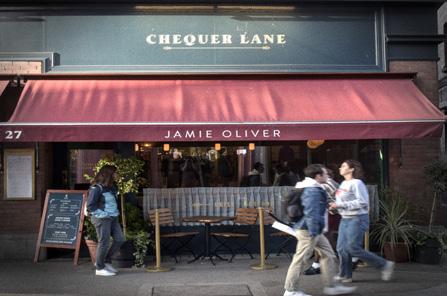
college student
Irish Sign
Language at Dublin Fringe
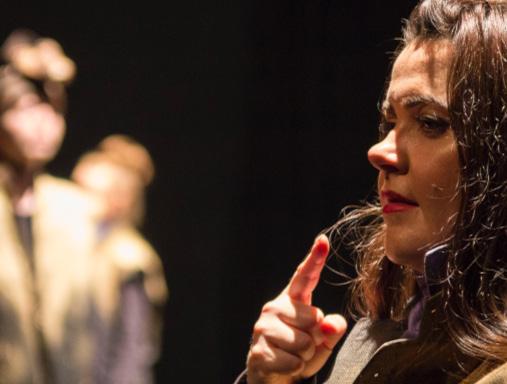
Cuisine Spotlight: Singapore -

College is o en described by graduates as the best years of their lives. A heavenly place in which you will make friends for life with whom you will later share the nostalgia of being hungover outside the Perch. Of course, college is a formative and o en wonderful experience, but the high expectations of the social aspect of it can put immense pressure on freshers to socially perform. To guide anyone grappling with this daunting experience, I have re ected on my four years in Trinity to encapsulate the dos and don’ts of making friends in college, and how to survive socially those tricky rst few weeks. Do attend more events than just the ones centred around drinking
I love a night in Workman’s just as much as the next Trinity student, but as it turns out, it is di cult to get to know people properly when you are vocally competing with the clamour of a crowded club. Going to pre-drinks is always a great idea, since even if you don’t follow through with going to a club a erwards, you can still enjoy a party buzz and chat to people properly. Attending some
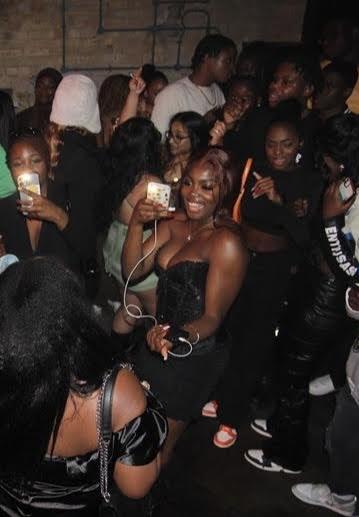
of the society events that take place before nightfall can mean making far more meaningful friendships than the ones fostered through vomiting in the Flannery’s Bar toilets. I’m certain that I am not the only student to have used drinking as a social crutch in the past, but let me assure you that it o en only creates the illusion of friendship, and is not necessarily the real deal. Going on a night out with strangers can be exciting, but in my experience having a more relaxed, drink-free meet-up can lead to even better nights out, and better friendships, down the line.
Don’t believe what you see on social media is is a fairly good rule in general, but is particularly pertinent when approaching what can start to feel like the friendship olympics of college. I remember seeing countless posts from people living in Trinity Halls in my rst year when I was living elsewhere in the city, and feeling the dreaded Fomo. It is key to rationally approach that feeling by remembering that social media is only a highlight reel. Not to sound like your mum, but the time you spend looking at social media can ironically be quite unsocial. Do socially venture outside of your course-mates and at-mates I know. is one is hard. People you live with and people in your course are friends with whom you don’t have to organise co ee dates. ere is a good chance you will naturally be closer to them as you battle the common enemies of paying rent and essay deadlines. However, housemate horror
stories are more widespread than Doc Martens in Trinity, and heated political debates in tutorials can sometimes mean coursemates

Editor-in-Chief
Life Editor
Life Deputy Editor
Arts & Culture Editors
Deputy Editors
Sex & Relationships
Editor Deputy Editors
Societies Editor
Deputy Editor
Student Living Editors
Deputy Editor
Food & Drink Editor
Deputy Editors
Kate Henshaw
Abby Cleaver
Lara Monahan
Jayna Rohslau
Ciara Chan
Ciana Meyers
Anna Lyons
Catherine Grogan
Alice Matty
Honey Morris So a Rooney
Siobhán Walsh
Emma Rouine
Elisa Eckstein
Akshita Hunka
Eoghan Conway
Lara Bhakdi
Hannah Viljoen
Tuesday 26 September | 2
Home away from home -
puts together some tips on how to build friendships as a
IMAGE VIA PEXELS
PHOTO BY NEASA NIC CORCRÁIN FOPR TRINITY NEWS
get a feel of what each person’s role on the committee requires Chairperson (also known as the President/Auditor/Director. How many names can there be?)
are no better. Trinity is teeming with kind and interesting people, and you might nd a really great friend somewhere you never expected - even if they do prefer the Lecky to the Ussher.
Don’t worry about nding a ‘group’
Possibly one of the biggest lies in pop culture representations of college is that you will have a big group of friends with whom you do everything. Anyone who felt the impact of e Barden Bellas as keenly as I did will know what I am referring to! Clinging to any friendship group you can, regardless of how welcome, happy and comfortable you feel with the people in it, might initially seem like a good idea, as it seems to o er some kind of friendship group security. However, hanging out with people around whom you can’t be yourself, purely for the sake of not feeling lonely, can actually be even more isolating than just being completely alone. My policy for friendships is quality over quantity.
Do invite people to attend events and to sightsee with you
It can feel nerve-racking approaching a near stranger to ask them if they would like to join you in the ritual of freezing your toes o by swimming at the Forty Foot. But remember, everyone is in the same boat. Most incoming students start o not knowing anyone in college, and many are new to Dublin. You can combine discovering the city with getting to know your peers, plus you’ll need someone to take a picture of you exploring to send into the
family group chat. You will have something to chat about if the conversation runs a little dry!
Don’t be embarrassed to ask people for their contact details is isn’t a LinkedIn networking event; you don’t have to be formal about it. But if you meet someone you get on with, make sure to get their contact details. It isn’t embarrassing to ask for someone’s details – in fact, it is quite attering! I can recall too many times in rst year when I was anxious about seeming too keen to get to know people, but isn’t that one of the best parts of college?
Whether it be their Instagram, phone number, or an address to send a carrier pigeon to them, grab their contact before they disappear into the Trinity woodwork.
All this said, people make friends in college in various ways.
ere’s no one right way to do it, and it is nearly always far more gradual than meeting all your best friends in Freshers’ Week. If you are uncompromisingly your brilliant self, the right people will gravitate towards you and you to them. Cut yourself a break and don’t panic too much if for a while things feel a little lonely. Learning how to approach both the ups and the downs is a huge element of the paradox that is being a student: it is a devastatingly wonderful time. Take comfort in the fact that one day these di cult moments will bear the rosy tint of memory. ose who once were strangers will be friendly faces, and you too will have joined the legions of sentimental graduates.
It’s the start of a new academic year, and with that we’re o en inclined to make new resolutions, something to make this semester a little di erent to previous ones that have passed by. Quite possibly, one of the most common resolutions among many students’ hopeful goals is the aspiration to join a new society.
But it can be SO OVERWHELMING (emphasis on the capitalization here…). Sometimes, it is a lot more comfortable to stay in our social bubble and observe from a distance. However, there are only so many times we can eye up the weekly emails that pop up every Sunday evening in our TCD inbox and think “Ah maybe next time I’ll go to that event.”
A huge factor in one’s reluctance, is that for certain societies, especially the larger ones, there can be so many names, so many people, and so many di erent society positions! I’m sorry but what does OCM even stand for? Whether you are a rstyear student or a nal-year student wanting to try out something new, it is a daunting task for anyone to wrap their heads around.
So, as we try to navigate the mine eld that is the countless societies that Trinity has to o er and the “behind the scenes” that upholds the running of these societies, listed below are the most common positions on a society’s committee. ese positions get lled at the society’s AGM held at the end of every academic year. Read their descriptions to try and
e head of the society’s committee and the person who oversees all the decisions being made. Your go-to person for everything and anything societyrelated. e chairperson is also the person in charge of the committee’s welfare and is their point of contact if any concerns arise during their participation in the society.
Secretary
e secretary records what has been discussed at the committee meeting, and holds notes of each discussion. ey’ll become a friendly acquaintance with your inbox as they are o en the representative of the society responsible for sending out weekly emails.
Treasurer
e nancial guru of the society. ey manage the society’s accounts and distribute the money within the society by working in close conjunction with the CSC (Central Societies Committee).
Public Relations O cer (or if you’re cool and would rather refer to the position as the abbreviated “PRO”)
is position involves the running of the society’s social media pages (yes, that means the Insta page you have been lurking on). Alongside this, they promote events and try to recruit more people to join their society. In other words, they’re the marketing force of the society. Picture them as that society member during Freshers Week begging you with a pile of sweets to join their society.
Events O cer (sometimes known as the Entertainment O cer/ Social Secretary).
e person appointed with this position is in charge of all entertainment-related activities.
ey are the brains behind the society’s Reading Week trip to Berlin or the pub quiz in Doyle’s. Depending on the society’s size, this position sometimes merges into the one of PRO.
Librarian
e librarian is usually appointed with the responsibility of running the society’s weekly co ee hours. is is the perfect opportunity to talk to someone involved about joining the society if you have a general query or even if you simply want to chat about all things art, lm – whatever the speci c society is about!
Ordinary Committee Member (or again, if you’re down with the lingo and would rather the acronym OCM…)
ese are the general committee members. ey help other members of the committee by participating in the running of di erent events throughout the year.
Year reps is is more so for larger societies where they have a

representative from each year group. Again, you can direct any general queries towards the society representative for your year who will either be able to help you out themselves or direct you to another person on the committee (the rst
year representative is only elected a few weeks into the academic year, so if you’re new to college and have a certain society in mind, keep an eye on their social media page and you might potentially nab the nal spot on the committee!).
e roles listed above are the core positions implemented in the majority of societies at Trinity. However, the list of all the committee positions throughout the clubs and societies is inexhaustive (and it would probably take me until the start of the next semester to nish listing them all out….). Due to the individuality and various needs of each society, each society’s committee di ers from one another. For example, VDP (Vincent de Paul Society) requires a Volunteer Liaison O cer. Meanwhile, the Environmental Society’s committee includes a Green Campus Coordinator. Try to tick one of your resolutions for this academic term o by getting more involved with the societies. Contact one of the members of a committee, and see how you can get involved and where you can allow your interests to ourish. Try to remind yourself, that each of these members would have started somewhere by looking at the society’s events broadcasted on their Instagram feed or noting each weekly email piling in a er another. ey would have been in the same position as you. If they can, why can’t you too?
| Tuesday 26 September 3
Summer is over (tragically), and Autumn is rising from the ashes. Everyone loves the autumnal aesthetic that brings warm and luscious co ee, turtlenecks, scented candles, books, and falling crimson leaves to mind. Within this cosy setting, we return to our educational institutes, awaiting another exhilarating year of society events, pre and post-lecture pints and the adrenaline rush of beating a deadline by a second. Unfortunately, as we begin a new term, we may face some regrets. Confronted with a brutal College schedule, you will inevitably put your head in between your hands and whimper: “Why didn’t I take that weekend o from work to travel? Well, your hopes are not lost. If you already feel like you need to get away as the semester begins, why not take a weekend trip to a glorious destination in Ireland? Accompanied by some good weather, Galway in Ireland can be a beautiful place to travel and an easy way to escape college stress and anxiety.
As young Trinity students, College entrances us into the nucleus of Dublin. Still, when the toxic fumes of tra c and the annoyance derived from Dublin Bus and Luas become too overwhelming, there is an attractive city to the West lled
with history and Irish culture. Walk down Galway’s narrow, cobbled streets and immerse yourself in the city’s chill and relaxing atmosphere. Investigate some of the traditional Irish pubs and the electrifying nightlife that accompanies the city. Joyous aspects of authentic Irish culture lie within the city’s veins, ready to be discovered. ( is isn’t a paid sponsorship with Galway Tourism. We just wish we were in Galway).
A Medieval City Medieval Galway was a prosperous port town and, with time, has transformed into today’s contemporary city. Galway City was founded in the 13th century by e Red Earl and 3rd Earl of Connacht, Richard de Burgh. e success and prosperity of the city can be attributed to fourteen families which ruled Galway for centuries a er de Burgh. ese families were known as the tribes of Galway; consequently, Galway became known as the city of Tribes. ese tribes e ectively ruled the city from the 15th to 17th centuries. eir names were (for the history enthusiasts that may care) Athy, Blake, Bodkin, Browne, Darcy, Ffont, Ffrench, Joyce, Kirwan, Lynch, Martin, Morriss and Skerrett. e tribes were expelled from the seat of power in Galway during the Cromwellian occupation of Ireland. eir legacy has been immortalised within Eyre Square, with their insignias marked on ags aligning the park.
Touches of mediaeval Galway live amongst the modern-day vibrancy. A remarkable example of mediaeval noble architecture and a tourist attraction is Lynch’s castle, with its sharp Gothic style and ornate facades. During the AngloNorman conquest (12th-14th century), a wall was built to protect Galway inhabitants, later featuring the imperative Spanish Arch.
e monument was built in 1584 onto the original 12th-century forti cation. It was constructed to shelter soldiers as they surveyed the area and manned cannons. Christened originally as Ceann an Bhalla (“the head of the wall”), the Spanish Arch was later renamed to eternalise Galway’s merchant trade with Spain. Previously, the Galway City Museum resided in the Spanish Arch. Recently, it moved out of the historical monument, and the museum is free to wander.
e Spanish Arch (nicknamed “Sparch”) is a place to socialise, day-drink and bask in the sunlight at the bank of the river Corrib.
e History of the Claddagh Ring
e Claddagh ring is an example of traditional Irish jewellery collecting notoriety nationally and internationally. Most people you know own or, if not, have lost a Claddagh ring. is exquisite ring design is prominently the reason for the amount of tourists travelling to Galway, as the original location of the Claddagh design.
e name originates with a remote shing village called the Claddagh, situated on the edge of Galway City. e wall built around the village separated Claddagh and Galway City, meaning that the Claddagh were able to preserve their customs and heritage. e village had their own King of the Claddagh, and the ring was initially a wedding ring for the Queen of the Claddagh.
e peasantry later adopted the ring, which now conveys love and friendship. e phrase “Let love and friendship reign” explains the motif. Dillons in Galway are listed as the original makers of the Claddagh ring since the year 1750.
Riveting cultural events
Every July, the Galway Film Fleadh, a six-day international festival, is hosted in Galway. e festival was founded in 1989 to launch a platform for Irish lmmakers. Galway International Festival is hosted between July 17-30 and displays various artistic and cultural events. Examples include traditional Irish music performances, theatre, music, educational talks, and visual art.
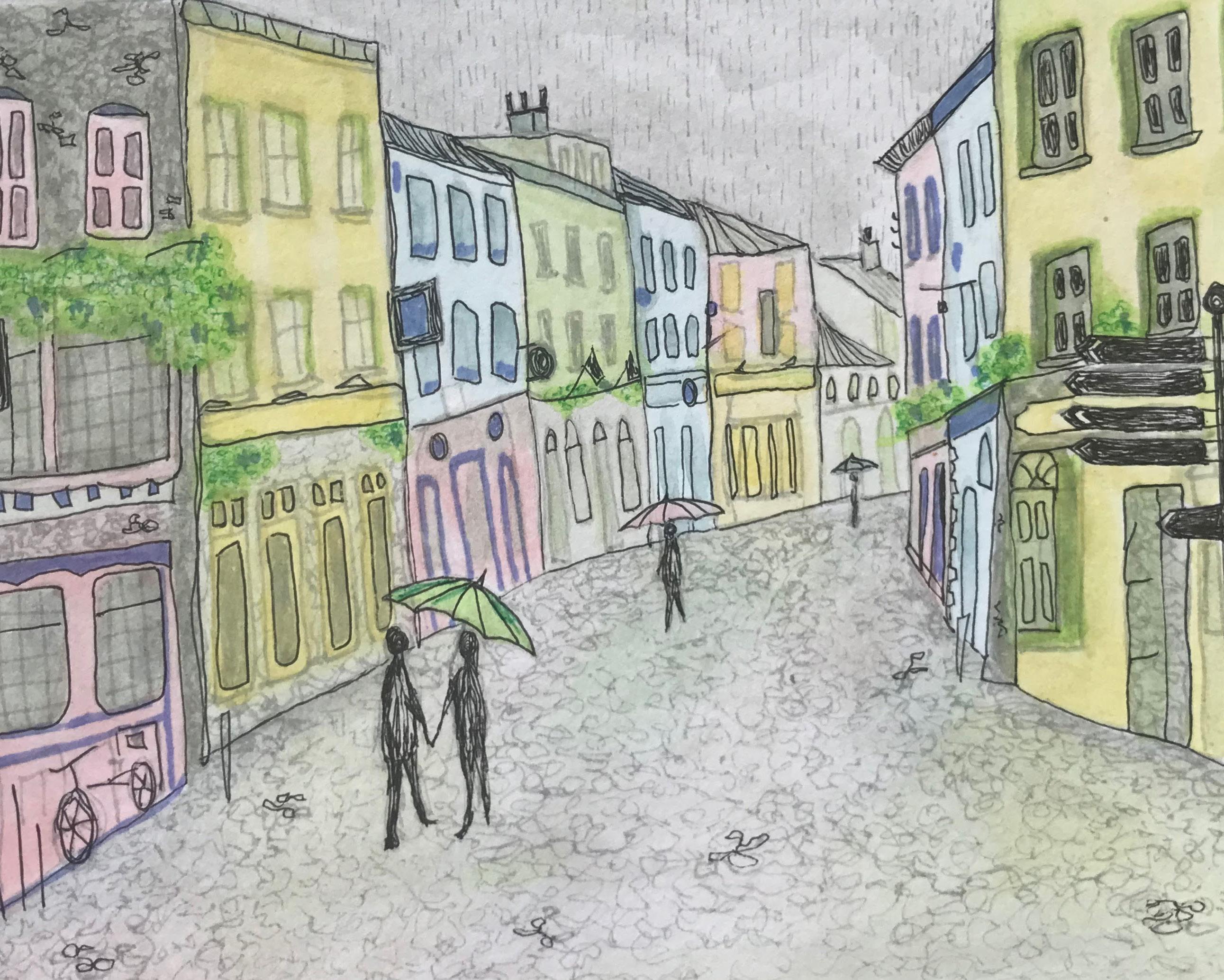
e Galway Races is one of the most signi cant racing festivals in the country, scheduled from July Monday 29 to August Sunday 4 2024. e positives of this event are the craic, entertainment and justi ed hangovers; the negatives are that your purse becomes magically lighter when you leave.
e Galway Christmas markets are held from November 10 to December 22. e atmosphere is wholesome and festive as people shop to buy presents and enjoy the Christmas spirit a bit too early.
Galway’s Eyre Squares glistens
and shines into the night with amusements like the Carousel and a Ferris Wheel. e Bier Keller at the markets serves drinks between 5 pm and 10 pm, and you can buy delicious mulled wine, beers or cocktails. is event is a lovely opportunity for students to embrace Galway City in the heat of the Christmas season!
Some food or drink?
Here are some recommendations if you want to partake in the boisterous nightlife of Galway City or are seeking a friendly place for food. Looking for some delicious cocktails? An Púcán and An Tigín are the places to go! A traditional Irish pub, modernised to t the younger generations, An Pugán has a delicious breakfast, lunch and dinner menu, with a spectacular oral-themed beer garden. For a vintage, cosy bar aesthetic, head to An Tigín in Woodquay to try their signature cocktails. e local newspaper, the Galway Beo, states that An Tigín delivers the best Guinness pints in Galway! Honorary mentions include Murty Rabbits, just o Eyre Square. is pub was established in 1872, dating back to the San Francisco Gold Rush. In Taylor’s Bar and Barr an Chaladh in Galway, you are guaranteed to nd some live acoustic music or trad music. If you are not in the mood for some pub grub, Quay Street Kitchen serves enjoyable Irish and European cuisine. In addition, visit Papa Rich for appetising Chinese food with substantial portions and Cava Bodega for gorgeous tapas!
Natural Galway
Of course, you cannot visit the
ART BY EVELYN DOYLE
West of Ireland without witnessing the natural landscape or the Wild Atlantic Way. On a balmy day with the location so close to the city, Galway’s seaside resort, Salthill, o ers students the chance to relax on the beach and swim to cure their academic stress—trade in Dublin city’s dreadful air quality for the fresh, bitter sea-salt air of Salthill. Many pubs exist in the seaside town, including O’Reilly’s Pub, which has a stunning roo op bar and hosts trad sessions every Sunday. Connemara National Park hosts a wide variety of things to do for nature enthusiasts. Whether you are an experienced hiker or an enthusiastic hobbyist, you can climb the famous Connemara mountain range, the Twelve Bens Mountains. eir information centre supplies information on the ora and fauna of the area and is entirely wheelchair accessible. As we settle into the new college year, don’t let the college work dissuade you from a mini vacation. Bring it with you! You could go on a weekend or even Reading Week. Incorporate your work into the weekend away. Finish your readings in the middle of Eyre Square Park, lying in the lazy sunlight. Listen to the tranquil and soothing sound of the waves at Salthill while you nally read the rest of your course handbook. Go to a cafe in Galway City (my favourite is Esquires Co ee) to answer the inevitable barrage of emails. Whether you travel to Galway this semester or decide to put it on next Summer’s to-do list, I highly recommend that everyone experiences the artistic, historical and cultural gem of Galway.
Tuesday 26 September | 4
Many people may not have heard about Singaporean or Malaysian cuisine, but both of these cuisines have one thing in common, and that is fusion. Singaporean cuisine is a mix of Cantonese, Hainanese, and Indian avours. e history of this cuisine lies in the country’s history. Before Singapore’s independence, it was a port city part of Malaysia where the indigenous people in the now-called Singapore were originally Malay. Later on, Indians arrived, most prominently from the southern part of India, followed by the Chinese and the British. ey established a trade route, creating a settlement of di erent cultures and their respective foods. is allowed the Chinese to mix their Ji Tang Mian(chicken broth noodles) with Indian spices, giving birth to a famous Malay dish called Laksa. e word originates from Sanskrit, and means “thousand”. is soup is an embodiment of several Indian spices with the delicate umami avour of Chinese comfort food.

A famous dish in Singapore
that is savoured by the locals is a simple chicken rice dish. As the name suggests, it is chicken and rice with a serving of piping hot soup and a cold-cut salad. But the beauty of this dish lies not just in how simple it is, but also in its making. e technique used to cook a Peking duck is applied to the chicken and rice. e rice is cooked in the same broth as the chicken is cooked in, and the soup is the reduction of the same broth with an addition of some hot chilli oil. e skin is served on top of juicy chicken llets to complement the white meat’s tenderness with a crispy, sweet bite.
e in uence of the historic mixture of cultures has not just a ected Singapore’s food but also its beverages. e worldfamous masala chai originated in India and met the taste buds of Malay tea lovers who started to add coconut milk or condensed milk, transforming it into the richer and creamier Teh Tarik, or/meaning “pulled tea” in Malay.
e tea is cooled down by pouring a mug of tea into another from a speci c height, creating the perfect temperature to enjoy the beverage and forming a deliciously creamy foam on the top.
e best part about this mixture of cuisine is that modernday Singapore – like Malaysia – respects both the fusion and its origins, which has led to the creation of places called “hawker centres,” also known as food courts. But the most amazing distinction between hawker centres and food courts is that fast-food places like McDonald’s, KFC, and Burger King are nowhere to be seen. e
lack of fast-food places in a single establishment has led to local restaurants ourishing, enabling cultures to share their food with the world, leading to more innovation and avour. Peranakan cuisine, which is the fusion cuisine described above (Indian, Chinese, and Malay cuisine), is one of the
two crucial parts of Singaporean cuisine.
During the trade when various cultures made their way to Singapore, the Portuguese also had a great impact on the food style.
e ethnic name of the Portuguese mix with the Singaporean/Malay cuisine is called the Kristang cuisine. e Portuguese settlers in Singapore used to be mostly shermen, so their foods involved a high variety of seafood. A very famous Kristang-style dish is the Kari Debal, which means devil’s curry. is dish has Portuguese and Indian in uences, speci cally from the Indian state of Goa, where the Portuguese had a massive in uence. is curry is mixed with various hot spices, green chilies, and the famous galangal, which gives the dish that oomph.
e Kristang cuisine is also heavily in uenced by Indonesian cuisine. e Indonesian sambal, made with roughly pounded red chilies, tamarind, and shrimp paste, is a ery condiment that is served as a side with Nasi Lemak or used as a way of marinating a whole sh in the Kristang cuisine.

e creation of the sambal has allowed the invention of many dishes such as Sambal Goreng, Ikan Asam Pedas ( sh in sour and spicy sauce), and the beloved Beef Rendang. A very famous dish that is also enjoyed by Singaporeans, originating from Indonesia, is the Mi Goreng. e Mi Goreng is a mix of the Chinese chicken noodle dish Chow Mein, but paired with a sweet, thick molasses-like soy sauce and fried onion oil. A single
bite of the Mi Goreng with an omelette on the side is nothing but heaven on a plate.
When one asks what Singaporean cuisine is, the answer is not a simple one, but a deep history of generational culinary mixing, cultures respecting each other, trying to orchestrate with each other by appreciating and adapting each other’s techniques and avours. A marriage of cultures is how I would describe Singaporean cuisine; a marriage tightly bound to its roots, giving birth to a breadth of avours.
| Tuesday 26 September 5
IMAGE VIA PEXELS
IMAGE VIA PEXELS
takes a unique approach in overcoming beginners’ fear to join DU Yoga Soc
In…. and out. In… and out. Now, on the next breath in you are going to reach up as far as you can and stretch your ngertips to the sky.
And in… with this next exhale we are going to reach all the way down and place our palms on the ground.
And… out.
Except there is a library desk in your way, you have a captive audience on Ussher level three witnessing your attempt at a quick study break yoga stretch, and nevermind palms on the ground, it hurts to even reach as far as your knees.
Yoga. e life-changing exercise we all hear about, and in our hearts we know we should give it a try. However, it can be hard to nd your zen zone amongst the constant campus construction, and any extra time you may have in your schedule is dedicated to making it from your class in Goldsmith Hall to your class in the Arts Building on time. Not to mention that trying out a new sport can be quite daunting, especially one that requires body contortion and actual muscle use. In hopes of achieving some enlightenment on achieving the perfect downward dog, I spoke to Trinity’s very own version of Yoga with Adrienne –Ciara, the chairperson of DU Yoga Soc.
Much to my admiration and in a reassuring discovery, Ciara is somewhat new to the yoga lifestyle herself, only becoming involved in the society and regular practice at the start of the last academic year. Her quick rise to yogi stardom as chairperson, merely one year a er joining the club is testament to the enjoyment and bene ts that
yoga adds to one’s life. Dealing with the repercussions of making the decision to become a Physics student, Ciara was seeking a way to destress, decompress, and escape from equations following long hours of continuous class, and for this she turned to yoga. With a variety of classes available at di erent times during the day, tting the practice into class breaks can be easier than one would think. Ciara explained: how she gravitated towards evening classes, during which she could avail of “a relaxing end to the day”, which reset any negative feelings and allowed her to nd peace and calm despite hectic days.
For those who are apprehensive about attending a class due to non-existent exibility skills and total beginner status, fear not for you are not alone. DU Yoga Soc caters to all levels of experience, ranging from total newbies to more experienced yogis and those who want to get their sweat on. Classes are run by certi ed yoga teachers, many of whom have over ten years experience in the
practice. e advantage of having quali ed instructors is displayed in the one-on-one help that is provided during the classes. is is comforting to know that you cannot embarrass yourself for too long before the instructor comes and guides you to the correct pose, thus resulting in yoga domination.
Along with classes on o er for all experience levels, DU Yoga Soc also runs di erent types of yoga classes. Whether Yin yoga is your love, or Vinyasa yoga holds the answers to your questions, you can explore an array of yoga styles to suit whatever mood you are in. In even more good news, trying out yoga with DU Yoga Soc does not mean you have to splash the cash on supplies. e cost of the classes includes the provision of yoga mats, blocks, and bands free for everyone to use to their heart’s desire. e student society even facilitates the lack of dedication that us college students tend to have. For those of us who are unable and unwilling to commit to regular classes and use this as an excuse to avoid trying out
yoga, our argument is now null. e classes are run as individual sessions, which means you can sign up for as many (or as few) as you so wish. If you can only nd it within yourself to participate in one class a month, you can do this without su ering the cost of everyone else progressing and improving while you are still at square one (or zero).
So brush your hair into a ponytail, skip that class that’s all the way in the Hamilton Building , and get your stretch on. Our newest favourite society is back in business and welcoming everyone to take part in their organised body contortion sessions. Downward dog your way out of class, warrior pose your way past the construction vehicles, and stretch yourself into the Atrium Building where the yoga classes usually take place. With many exciting collaborations on the agenda with other societies, I think it’s time we, as a student body, take a collective and meaningful inhale, and exhale ourselves towards inner peace in the form of a DU Yoga Soc class.
In a world obsessed with eternal youth and the pursuit of awlessness, the wit and wisdom of Oscar Wilde o ers a refreshing perspective. His exploration of youth, tragedy, and the the liberating power of folly continues to captivate audiences across generations. Delving into Wilde’s enduring appeal unveils a treasure trove of insights that resonate deeply with the complexities of modern life.
Youth as a Boundless Promise
In today’s world, the romanticisation of youth continues to hold a powerful sway, and it is precisely this enduring fascination that draws many to the works of Oscar Wilde. Wilde astutely cra s an enchanting narrative around the idea of youth, portraying it as a period of unmatched allure and boundless promise. Within the pages of e Picture of Dorian Gray, we encounter Dorian,
a character whose profound apprehension about ageing and the potential loss of his youthful charm strikes a chord with modern readers. is fear, though intense, taps into a universally shared aspiration to preserve the vitality and exuberance associated with youth. Dorian’s aversion to the passage of time resonates deeply in a society that o en places a high premium on youthful appearances.
In Oscar Wilde’s own words, we nd a compelling testament to his romanticised view of youth and the value he placed on embracing one’s mistakes. In e Picture of Dorian Gray, Lord Henry urges the Duchess to make the mistakes inherent to being young. is instance serves as a poignant reminder that for Wilde, youth was not only about physical beauty but also about the vitality of living, learning, and, yes, even making mistakes. It underscores his belief that the path to reclaiming one’s youth lies in the willingness to revisit and even relish the errors of one’s earlier days. is perspective challenges conventional notions and encourages a more nuanced understanding of the profound impact that youthful indiscretions can have on personal growth and transformation. Wilde imparts a timeless wisdom through Lord Henry’s words that resonates with readers across generations.
In an era de ned by the paradox of technological advancement and persistent societal disparities, Wilde’s words hold a mirror to the human experience. ey encourage us to recognise
that the most profound forms of beauty o en emerge from the crucible of adversity. Whether it be personal struggles, societal injustices, or global challenges, the capacity for resilience and renewal remains an indomitable force. Wilde’s eloquent articulation of this truth fosters a sense of
trials and tribulations, from the public scandal surrounding his homosexuality to the heartwrenching separation from his beloved Lord Alfred Douglas, paint a portrait of a man con ned by societal constraints.
Wilde’s poignant selfre ections, such as his statement:
tragic,” have found a prominent place in contemporary culture, particularly on platforms like Pinterest. Its ubiquity underscores its universal resonance, as individuals from all walks of life are drawn to its message of embracing the inherent complexities of existence. e quote’s popularity re ects a collective yearning for meaning and purpose within the intricate interplay of light and shadow that de nes our lives. In this way, Wilde’s words continue to serve as a guiding light for those navigating the intricacies of the modern world, o ering a reminder that within every tragedy lies the potential for something truly exquisite to emerge.
solidarity among modern readers, inviting them to nd strength in their own journeys.
e Coexistence of Beauty and Tragedy Oscar Wilde’s life story is etched with the poignant strains of tragedy, a narrative that resonates deeply with contemporary audiences. His

“My existence is a scandal,” bear witness to the weight he carried. ese words encapsulate the internal turmoil of a man who grappled with societal norms that sought to suppress his true self.
Furthermore, it is notable that Wilde’s quotes, such as: “behind every exquisite thing that existed, there was something
e enduring appeal of Wilde’s tragic narrative lies in its ability to humanise an iconic gure, revealing the vulnerability that underlies even the most celebrated lives. In a culture that worships success, Wilde’s story reminds us that behind every triumph lies a tapestry of struggles and heartaches. It encourages empathy, fostering a deeper connection between readers and the complexities of his experiences. Moreover, Wilde’s unwavering commitment to living authentically, despite the societal cost, inspires those who grapple with their own battles for acceptance and self-expression. His legacy serves as a beacon of courage and resilience, reminding us all that even in the face of tragedy, there can be a profound beauty in the authenticity of one’s existence.
Tuesday 26 September | 6
ART BY ALICE GOGARTY FOR TRINITY NEWS
Men, before skimming past this article because you feel it doesn’t apply to you, it does. Everyone has women in their life. Since my early to mid teenage years I’ve found myself in conversations with friends about what new contraception they are trying and why they’ve decided to use it. “ e pill I was on made me so depressed I had to come o it so now I’m trying...”. Now, at 21, the conversation is still ongoing. I’ve had people tell me that they broke up their relationship because the contraceptive hormones they were on made them feel so numb and disconnected from everyone. Although we sometimes know that these feelings can be caused by the medication we are taking, it doesn’t make them any less real, and it doesn’t make them any easier to deal with.
A lot of hormonal birth control
works by giving your body pregnancy hormones which stops an egg being released from the ovaries each month. Our bodies have essentially been tricked into thinking we have a baby growing inside of us. We all know that the physical body changes during pregnancy, and can cause vast amounts of emotional uctuations, so why is it so hard to imagine how tough being on hormonal contraception can be?
Hormonal birth control may not suit women and people with wombs for a number of reasons. It can increase mood swings,
female condom, cervical cap, diaphragm and more. But these have their drawbacks too. e IUD may be great 3 weeks of the month, but it can cause periods to be three times heavier and more painful. Whereas, the cervical cap and diaphragm increases your chances of UTIs. In other words there is no way of telling if any contraception, hormonal or not, will a ect you with very little side e ects or a cascade of them.

contribute to depression, a ect libido, cause brain fog and weight gain. Weight gain, for example, may indirectly cause stress, discomfort, and mental health issues in women and people with wombs who have a history of eating disorders and body dysmorphia.
If you are more susceptible to these issues, one may opt for a more local acting hormonal contraceptive or a non hormonal contraception such as the various IUDs, rather than the more invasive hormonal treatments, such as the bar or by injection.
ese more intrusive treatments o en enter your bloodstream through your arm or bottom which then have to travel through your entire circulatory system before reaching your womb, which can then lead to more side e ects.
Physical impacts of hormonal birth control o en include weight gain, headaches, and enlarged breasts (one could argue that this could be a positive or negative side e ect.) On a more serious note, severe and life threatening side e ects such as blood clots and strokes can also occur. is being said, I’ve talked to multiple people who didn’t experience any side e ects at all. It’s impossible to predict.
ere is a range of non hormonal contraception such as the IUD,
Like many women and people with wombs I had to try many contraceptive methods before nding one that suited me. I began with the pill, which didn’t suit me because it was so di cult for me to take it at the same time every day. is is a purely personal reason. I then went for a contraception that I didn’t need to remember to take; the implanon bar. It didn’t suit me at all; I felt miserable and anxious. I put on a lot of weight and I would bleed at random. Finally, I went for a non hormonal method: the ballerine IUD. e insertion was probably the most painful experience of my life, especially since I’ve never given birth or had a cervical exam before. I have a very high pain tolerance, which led me to underestimate the amount of pain I was going to feel during and a er the procedure. It was no laughing matter. My sister came with me and had to help me walk home, and I had to stay in bed for days a erwards. It took a few days for the cramping to settle down, but once it did, and the brain fog that the hormonal contraception had once given me disappeared, I realised that getting the non hormonal coil was the best decision I’ve ever made. e free contraception government scheme launched in September 2022, which has been an immensely helpful step in the right direction for allowing women and people
with the bar for much longer than I should have purely due to nancial reasons: as a student, it was incredibly di cult knowing that the next sum of money I spent on contraception may not have led to a better situation.
I o en wonder why we have the burden of contraception? Why not men? A erall, they can conceive several children a day and women only can once every nine months. e fact is that male contraception has been in development for decades, but not enough research has been done in this area, and it seems that it’s possible side e ects are the main reasons why it is not readily available. e idea of all men having a vasectomy only to reverse it when ready to conceive always toyed on my mind. e reality is that vasectomies are not always reversible, and besides would you really trust a stranger who says that they’re on male contraception? I wonder why the side e ects of male contraception inhibits it’s development, but not female contraception. ere does need to be a contraceptive option for men, but maybe it would only work in a healthy and stable relationship. If you want to share the burden of contraception, talk to your partner about your options.
with wombs to explore their contraceptive options and switch medications with ease, without the nancial burden that comes along with that. For example, the bar cost me 114 euro to buy on prescription, on top of this it cost me 50 euro for the consultation to get the prescription. I stuck
I worked in a pharmacy for a year, where the fundamental message I learned was that with every medication you weigh the bene t over the cost. e cost of being on contraception can be disheartening but let’s not forget that the bene t of it is not getting pregnant. Being pregnant may lead to the side e ects that hormonal contraception gives us along with other symptoms and a child to take care of on top of that.
I asked a GP what are some myths that commonly crop up during her consultations.
She responded to me with the concern of the belief that some contraceptives ceasing your period is dangerous. She said that she would like to reassure us that the womb lining thickens each month in anticipation of ovulation but if your medication suppresses ovulation your womb lining doesn’t thicken: it’s not essential to bleed! Another common myth is that birth control damages your fertility, when in reality, it doesn’t. You should always feel free to express any concerns you may have with your GP, or to seek information from a reliable source. It’s vital that we feel comfortable with what we put in our bodies. To those who still haven’t found the contraception that works for you, hang in there. ere is nothing wrong with you. Everybody is di erent. Take your time, allow symptoms to settle before making your mind up. Shop around. ere is no predictor on how a certain contraception may a ect you, even if you’ve heard reviews from friends and family. Educate those around you. e contraception journey is an emotional rollercoaster, literally. Women do not need to act in any certain way. If your contraception is making you miserable, anxious or angry, there is no need to feel guilty about that. Let’s stop apologising for how we feel and just explain why we feel like this. It’s painful and exhausting and I commend each and every one of you who go to school, college and work when your contraception makes you feel like you don’t want to get out of bed all day. Let’s keep this conversation going. We’re all in this together. Be kind to that girl who seems a bit o today and for God’s sake, stop responding to every moody woman “Is it that time of the month?”
| Tuesday 26 September 7
PHOTO BY NEASA NIC CORCRÁIN FOR TRINITY NEWS
shares advice on taking a sometimes much-needed breather from Trinity
If you had asked me in my rst week of college how to deal with stress and anxiety while going to Trinity, I wouldn’t have had an answer. I wouldn’t have understood why I would be stressed or anxious about something I had limped through all of my angsty teenage years towards. e idea of going to college, something which got me through many tough periods in secondary school, couldn’t possibly be a source of stress now, could it? For many of us, coming to college is like having a eld gate swing wide open, and is one of the most amazing times in our lives. However, now that I’m in my nal year, the question feels di erent. e looming uncertainty of postcollege life and all the academic hurdles before it can leave you spaced-out and anxious,making Macbeth’s comment “O full of scorpions is my mind” seem all the more apt. However, Whatever stage of college, or headspace, you’re in, here are some suggestions that may help deal with the pincers of college life.
Visit art galleries
Considering how small Dublin is in comparison to other European cities, we have such a huge collection of art. From Caravaggio to Yeats and Turner to Fontanna, some of the best Irish and international artists are only minutes away from Campus. With an Andy Warhol exhibition on the way to the Hugh Lane Gallery shortly, as well as the Friday night late hours of the National Art Gallery, these places can o er a mental safe zone and pause in what might otherwise be a stressful week. If you want to clear your head, just give yourself an hour to listen to your favorite music and go look at the new John Lavery exhibition of pretty landscapes, or the newest exhibition in Hugh Lane – although I wouldn’t advise going to look at the Francis Bacon pieces in the Hugh Lane … a quick google of ‘Study for a Head’ will show that he isn’t the most relaxing painter.
Go sea swimming
No column on mental health would be complete without some reference to the ungodly act of voluntarily dipping yourself into the icy cold waters of the Irish sea. is beaten horse of a cliché is so polarising whereby if you asked a person what they thought of sea
swimming, they’d either compare it to an experience of God, or tell you to go stick your dry robe up your fathers Donnybrook loyalty card. However, even if you hate sea swimming like I do, it’s hard to deny that it does work well as a circuit-breaker. If you nd yourself in a bag of knots, then there is something in physically chucking yourself in the sea for a bit to cool down. O entimes, it’s not the buildup to, or the actual act of swimming, but rather the rush a erwards you get while drying o e acknowledgment that you’ve conquered your fears in this seemingly insigni cant way can help pave the way for other decisions and obstacles you might have.
Take nature walks

Continuing on this wellbeing kick, my next very original suggestion is nature. I apologise if this is coming across like when your mother tells you that if you just “went on a walk” then all your mental health problems would disappear – but the nugget of truth there is worth a thought. For me, it’s going to Phoenix Park. I grew up beside the wall of the park and have countless memories of walking through the Horse-Chestnut leaves of Autumn and picking up conkers. Going on walks now, (although not necessarily including the act of jumping in a pile of leaves every ve minutes), can be a great way to ground yourself. You can make it more interesting by focusing on the sensory aspects around you, what you can hear, what you
can see and smell. Finding or rediscovering old places like these are nostalgic and can be really helpful in making us feel relaxed and safe. In some sense it appears that our mothers were in fact right. College is wonderful, but sometimes, it can be the last place on earth you want to be. Not knowing who you are going to go to lectures with, or if there are old friendships that you’re trying to avoid. Maybe you’re worried about academics this year. Worried about what grades you need to average or what professors you’ll have. College can be overwhelming sometimes, which is why it’s so important to come up with your own escapes so that you can enjoy your time there as much as possible.
With students having moved into shared accommodation ahead of a busy academic year, the phrases ‘bin rota’ and ‘cleaning schedule’ have no doubt already shot up in their usage. e challenges of sharing a common kitchen are both numerous and recurrent, and even though it is a de ning student experience that can be really fun, it de nitely has the potential to cause con ict. If you have never experienced using a shared kitchen, these challenges may be new to you, but trust me, at some point across the year you might just nd yourself turning back to this article for guidance. So, dear reader, please, come in, make yourself a cuppa, and get to know how to resolve any of these issues – just wash the mug when you are nished with it.
Shelf-sharing Space is o en limited in shared kitchens, and it is important that everyone has enough room to comfortably – and safely – store their food. At the beginning of the year, when the only food anyone seems to have is salt and milk, storage doesn’t seem like it will be an issue. But, if you pardon the pun, don’t shelve this issue for later. Soon it might be quite tricky to nd any available space to store your food, and as the semester gets busier, it is harder to get hold of
The study of astrology is almost as old as civilization itself and is said to have originated in the cradle of humanity, Mesopotamia. Astrologists have kept track of the stars and correlating patterns since the third millennium, but over time what once was a practice inseparable from actual science like astronomy became a watered-
down interpretation of human characteristics in the Sunday paper read by your kooky aunt and probably Linda Doyle. However, a new life has been breathed into the contemporary practice of astrology, suddenly more popular than ever with younger people as we continue to reject traditional religious institutions in favor of a more focused and inner approach to our unique spirituality. Our renewed interest in astrology is also de nitely related to our obsession with self-care; it’s an extremely personalised view on your life and your experiences. It’s also increasingly more commodi ed, from Amazon ads telling you that because you’re a Libra you need this necklace, to the astrologer on your TikTok for you page telling you that you’ve got to break up with your signi cant other.
Humans are simple, we crave a sense of control and familiarity, and hate being vulnerable. A lot of the reasons why people have historically ocked to religion are the same as why we’re now attracted to astrology. It’s easy to accept that God (or another higher power) has a plan for us. It’s comforting to know that things are predestined and predictable. e last few years have been anything
Tuesday 26 September | 8
explores whether astrological compatibility is really signi cant, or whether we are using starry-eyed love as a comfort blanket for the tough times we live in
explores what the most typical kitchen crises are and how best to resolve them
ART VY JESSIE HUANG FOR TRINITY NEWS
your atmates to ask if they can remove their mouldering bananas from valuable cupboard space. One suggestion is to have a shelf each in the fridge and freezer - or more depending on how many people you are living with - and divide up the cupboard space in a similar way.
Food: to share or not to share?
In a similar vein, sharing food can be a contentious issue. People have di erent boundaries on whether they want to share in the rst place, and also how much and which items they think should be communal. Everyone is entitled to have their boundaries respected in this circumstance. Sometimes sharing food makes budgeting and meal planning much more di cult, and it can add more responsibilities into the mix, such as deciding who restocks what and when, and how to split the cost of the communal food. Unless you are really con dent in your ability to communicate on these issues, and don’t nd it a hassle to work out a schedule, food sharing can easily raise di culties. at said, if sharing food works for you, it can be a great way to grow friendships; taking turns to cook a weekly dinner to share with your atmates, for example, is sociable, and a great opportunity for some culinary experimentation. Maybe start o buying groceries individually, and then revisit the
idea of sharing a er a month or so.
Household costs
Any kitchen needs that under the sink collection of cleaning supplies, a good few kitchen rolls, and some decent washcloths. If you have any prayer of making the shared kitchen liveable, you’ll at least need the products to do it. Don’t leave one person to buy all the products, or if they do, make sure to reimburse them. Apps like Splitwise make this a little easier to keep track of, and although it seems to make more sense and feel less transactional to work on the basis of ‘I’ll get it next time’, the ambiguity can mean people end up feeling short-changed. For costs like heating, electricity, or internet, be sure to keep a record, and take turns doing the paperwork. It can be easy to let someone take full responsibility for a task like this. However, it is crucial that not only the money, but also, the time people are putting into the house maintenance is reasonably equal.
Waste disposal

I always think it is best to operate on the rule that if you put something in the bin and it is full, you are responsible for taking it out. However, depending on the habits of people you live with, this might not feel fair. You might not need a bin rota, but don’t be afraid of using one to make things easier and more accountable.
Cleaning
It goes pretty much without saying that the ideal situation is that a er you or your atmates are nished with the kitchen, it is le just as clean as when you found it,
so that the next person can cook and eat comfortably. A general rule of thumb is that if you haven’t got time to clean up a er some complicated meal prep, then you haven’t got time to make the meal. Always opt for something that you are sure you have the time to clean up a er.
Kitchen noise
If, like me, a spice bag on the way home from every night out is a little out of your budget at the moment, then you might be tempted to cook yourself a slapup meal at 3am. Honestly, this is a great idea in terms of budgeting; but keeping noise to an absolute minimum is important. Cruel coincidence - and probably inebriation - means that right when you are creeping around like you’re Santa on Christmas Eve is
when you will drop the pan, smash a glass or set o the re alarm with some burnt toast. Clanging pots and pans are so much worse to listen to in the early hours, and an even worse sound to be woken up with. Enjoy your night out, but if you see yourself cooking when you get home, make sure you have an oven pizza or something equally low maintenance in your freezer that is less likely to cause potclanging.
Whichever issues come up and whichever solutions you decide to use for them, the most important thing is open communication. Whatever boundary that is being crossed, don’t sit and seeth if you haven’t expressed the thing that is bothering you - it isn’t fair on either you or the person who might not be doing their washing up.
but, and it’s been hard to hold faith in anything lately. With economic uncertainty, a global pandemic, and just the general mess we deal
to hold a formulaic answer to everything, especially people. A sexy, mystical, attractive answer to why someone is like that. With modern technology, we’ve moved past the baseline advice that water signs should stick to earth signs and that air signs should couple up with re signs (and vice-versa). How convenient is it to pull up Astro.com, input a few key pieces of information and receive an output equivalent to someone’s entire past, present, and future? For example, Capricorn Sun plus Leo Moon plus Cancer Rising equals someone who probably studies BESS and thinks they’re better than everyone else — mark to avoid.
it is to say: “Well, it didn’t work because he’s a Taurus and I’m an Aries,” instead of acknowledging the real problems you had with each other? Isn’t it so much more easy to accept star-signed determinism than admitting your own fault? e recent reliance on
astrology isn’t because anyone actually cares about who they’re compatible with, it’s because astrology hangs horoscopes and cosmic predictions like a safety net so you’re not too upset a er investing time and energy into a Gemini when you’re a Pisces.
Get real, more real than your zodiac sign because no one can be accurately described in three adjectives or a coded webpage. As Tim Kreider wrote: “If we want the rewards of being loved we have to submit to the mortifying ordeal of being known.”
with being in our 20s, things have been synonymous with spiraling out of control. Astrology has become so popular with our generation because it appears
Our obsession with wanting to know what to expect and when to expect it has become an extreme method of self-preservation. It’s rocky and uncharted territory to open up to someone romantically, and how do you even know who to talk to? We’re all so afraid of being disappointed, that we feel severely betrayed a er serving ourselves up on a silver platter for someone on Hinge only for it to not work out. Astrology gives the illusion of being able to control your expectations of someone else and yourself in a given situation. How relieving

| Tuesday 26 September 9
IMAGE VIA PEXELS
PHOTO BY HENRY SYNNOTT FOR TRINITY NEWS
interviews Trinity alumnus Lianne Quigley on her interpretative work for the Irish Sign Language Deaf Translations Project at Dublin Fringe Festival

“Then the wet windin’ roads / Brown bogs and black water/ And my thoughts on white ships / And the King of Spain’s daughter.” Although we may be accustomed to Dublin’s weather, imagining oneself in a sunnier locale remains undeniably tempting.although many of us dream of sipping a mimosa on a beach in Hawaii, we stay rmly lodged on these rockier shores. Rainy days are our reality whether we like it or not. Still, we can always escape through our imaginations. When these fantasies take to a stage, it is known as theatre. eatre confronts collective concerns ranging from unacceptable weather to societal norms. Irish playwright Teresa Deevy wrote “ e King of Spain’s Daughter” to address the latter. Initially staged in 1935 at the Abbey eatre, the play centres around
Annie Kinsella, a woman who dares to dream a reality free from the constrictions of patriarchal, rural culture. While she ultimately conforms in frustration with her limited options in a conservative era, the play’s depiction of a woman aiming to exert agency is radical. In physical terms, purposeful use of stage directions evoke the power of the female imagination against reality’s boundaries. Ultimately, Deevy’s vision creates an alternative realm of possibilities for women.
Trinity alumnus Lianne Quigley, now an organiser for Dublin eatre of the Deaf, understands the importance of rede ning space. In the context
of Deevy’s work, this applies from an intersectional standpoint. Deevy not only deals with the tribulations of being a female playwright in conservative Ireland, but experiences considerable di culties as a deaf woman.
During a 2017 adaptation of “ e King of Spain’s Daughter”, “Talk Real Fine, Just Like a Lady”, Quigley collaborated with artist Amanda Coogan to adapt Deevy’s work. is was a relevant choice, given how action recon gures itself into Irish Sign Language (ISL) translation within the theatre. Recalling Annie Kinsella, Quigley – a deaf actor, activist and interpreter – understands the necessity of breaking down barriers and interpreting in such a way that the theatrical landscape truly becomes accessible to all. As a keen advocate for representation, Quigley leads the Deaf Translations Project at the Dublin Fringe Festival. roughout the festival, she is interpreting three shows which span diverse genres for an ISL audience: “Once in a Lifetime”, “Hot House”, and “ is is You”.
Last month, I spoke with Quigley on the unique commission which combines deaf and hearing
interpreters. I also gained insights into her experience at Trinity and the background of deaf representation in Ireland. Anita Cunneen, from Irish Remote Interpreting Services (IRIS), provided translation services for our conversation.
On deaf interpretation and advocacy
Interpretation services are essential for ensuring artistic equity. Due to the 2017 passing of the “Recognition of Irish Sign Language for the Deaf Community Bill 2016”, translation services must be provided for ISL speakers at no extra cost to ensure representation and enable ISL speaker participation in social and cultural activities.
Following this approach, the Deaf Translations Project aims to rede ne the accepted mode for ISL translation; until recently, most interpreters were hearing or did not have a stake in the arts. Deevy explains how the Deaf Translations Project encompasses a more representative approach: “I’m on stage signing, and the hearing interpreter will be sitting opposite me.” e hearing interpreter feeds the deaf interpreter information, who then can sign in ISL to audience members. Quigley, who has “grown up immersed in deaf culture […] and deaf style linguistics” signs with natural skill since it is her native language. Furthermore, all six interpreters are also involved in theatre, making the translation comprehensive since they are all familiar with the cadences of movement central to acting.
Always seeking recommendations, I asked Quigley to recall her favourite
performances. As a performer, Quigley recalls “Talk Real Fine, Just Like a Lady” as a career standout. e show was special to Quigley because she recognised similarities between her and Deevy’s experiences that lent themselves well to a modern take. Before ISL was recognised, Quigley and the team utilised theatre performances to promote recognition by highlighting the language as a choreographic tool. Quigley says: “We used it as a clever way to spread awareness about artists [...] you know, the way artists use campaigning a lot in their work.”
e most memorable moment for cast and crew alike came when the production’s values were enshrined into law. e show ended with a video of the collective protesting for their dream to have ISL recognition, and – six months later – ISL was recognised by the Dáil. Quigley states that the timing made the moment extra special; the personal was rendered political.“Talk Real Fine, Just Like a Lady” exempli es how art, through the lens of interpretation, can boldly argue for systemic change. In its unprecedented capacity, interpreted art can surpass mere rhetoric by rede ning how we conceive the original work’s implications.
Quigley is also the chairperson of Ireland’s only national deafled organisation, the Irish Deaf Society (IDS). In 2018, Ireland was one of the last countries to adopt the UN Convention on the Rights of Persons with Disabilities (CRPD), which aims to protect the rights of disabled people.
Policy legislation should be based fundamentally on the experience of deaf people: “Without consultation with the deaf person, how do they know what our needs are?” e IDS must push policy makers, like kids in a grocery store cart, past their tedious default of stopping in the aisle and refusing to move. You would think the child could get out and walk at this point, and the government could take independent action without excessive prodding from the deaf community. ink again.
at being said, a (legislative) tortoise is still better than no tortoise. Likewise, slow implementation is superior to
Tuesday 26 September | 10
unsubstantiated rhetoric. Between the 2017 ISL Act and the UN CRPD, the framework for keeping the government accountable exists. Still, there is a severe lack of interpreters, and many public bodies don’t have the necessary resources or awareness of the ISL ACT.
Quigley says she understands the ongoing nature of the process: “It’s not going to be a quick change overnight.” She cites her involvement in developing the ISL voucher programme two years
ago to provide interpreters in all public settings. ere was a lack of interpreter presence in private sector settings, so the government set up an interpreting fund to pay interpreter fees. is pilot program stopped, but it may be reinstated in October, which will bene t deaf people taking part in all activities, including those in the art world. While famous works have mass appeal for a reason, one of the biggest thrills of art is nding niche pieces that resonate with you. ere is a thrill to claiming a creative territory where only a few have ventured before: a joyous freedom to decide whether you want to share it with others or nestle it away within your mind. Independent performances also allow for sharing unconventional ideas – like Deevy’s – that make bold statements on questionable aspects of our culture. Deaf people are all too frequently denied entry to this province. While signi cant theatres, like the Abbey eatre and the Gate eatre, have funding from the Arts Council for interpretation, smaller theatres o en cannot provide interpretation services.
e ISL Deaf Translations Project is only a start. Implementing a voucher system would enable deaf individuals like Quigley to reach unprecedented levels of engagement with independent productions.

On the ISL translation process Translation is a mode for shaping discourse. Most languages contain phrases that do not have a direct equivalent, or have multiple ways to express the same emotion. It is not a natural science but an art that depends on the translator’s sensibility. Still, ISL interpretation exceeds the limitations of dialogue. To translate ISL for the stage is to enact a separate performance in
motion.
Since interpreters are essentially actors, rigorous rehearsals are necessary, and translation between spoken and signed languages requires intensive preparation. A er prepping the script, an interpreter attends rehearsals “so that they can match the script with the rehearsals” and note in their scripts what emotions to interpret “through their body language and their facial expressions as well”. Translating music poses great di culty because “ISL is not a direct translation of English in songs,” so the translator must know the song’s context to translate it into a visual idea for the audience. Quigley says: “It’s not word for word, it’s more the process.” Translation also involves deciding on a shared vocabulary between the feed and the deaf interpreter, coming up with sign names to distinguish characters rather than relying on nger spelling. e physical movement of theatre is powerful for its capacity to stir up feelings.
On her time at Trinity University is a natural time to explore one’s interests. When attending Trinity, Quigley was passionate about exploring multiple interests. In addition to her love for theatre, she eagerly delved into maths as a student in Business, Economics, Political Science and Sociology. Still, she felt nervous coming to the College from an entirely deaf school. Unconscious boundaries quickly became visible. During freshers week, she recalls she saw that Trinity had a sign language society and, thinking she would “really would like to be involved in that [ …] asked, “Could I join your society? And they were all shocked because, oh my god, it was their rst time meeting a deaf person
who wanted to join their society […] back then, the society was aimed at people learning sign language […] I didn’t think I was allowed in.”
Initially, Quigley was on the student council campaigning to include interpreters. Progress was slow, but it nally arrived with the sustained e ort of advocating from her personal experiences. In her third or fourth year, translation services were provided; Quigley joined to become its eventual chairperson. Quigley has been delighted to see the ISL Society’s progress since her days at the College, at one point winning “Best Small Society”.
Regarding ISL in an educational context, Quigley believes it should be included alongside other languages in most curriculums. She cites the Language Connect project that provides taster classes to primary school students as an exemplary model for sign language. ISL is “very popular among primary schools”: since an interest in learning ISL exists, the language option should be expanded to increase access to translation services.
On her love for ISL
Wrapping up our conversation, Quigley cites the need to recognise “many other deaf artists that are alive now […] I work with deaf artists all the time, and we want to encourage that”. She cites her collaborators Alvean Jones and Breda O’Grady as inspirational examples.
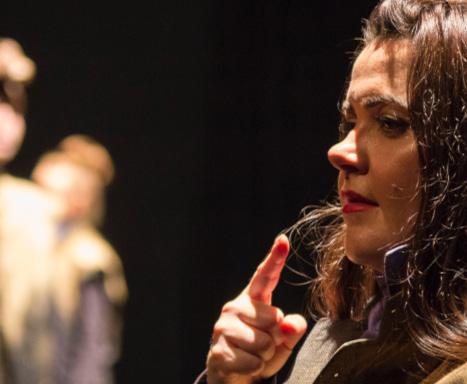
ISL changes with the imposition of time. In particular, ISL has gendered sign language because
many deaf boys and girls went to di erent schools and developed their language slightly di erently. Further, there is generational language, since “the older generation [and] the younger generation sign quite di erently.” Quigley recalls her encounters with the sign of older women in full appreciation for its beauty. “So myself, I went to a deaf school, I went to the girls’ school, deaf girls’ school, and we signed. And then when we le school and when we met older deaf women, oh, their sign is beautiful. And they have, it’s called women sign.” eatrical interpretation seizes the territory of the past. Quigley says: “Sometimes through my performance, I always use the old women sign. I feel really strongly about it. I don’t want it to disappear. I want to claim it back.” She notes that interpretation, which requires adaptation for new audiences, is in ux just as utilised sign changes depending on one’s age: “As a deaf interpreter, you’re interpreting, and you’re adapting to your audience all of the time.”
Annie Kinsella’s story has found a happier ending. Clearly, Quigley has found her calling in the translation and advocacy for the ISL language, fostered by artistic and musical movement. Fostering equity is a journey that links converging roads of “dream and reality”. In other words, Quigley – with her fellow collaborators at Dublin Fringe and beyond – have interpreted dreams into a brave new path for progress.
| Tuesday 26 September 11 IMAGE VIA LIANNE QUIGLEY
IMAGE VIA LIANNE QUIGLEY
The start of a new college year is akin to a blank canvas, o ering a chance to rede ne oneself, break free from constraints, and explore new horizons. However, in today’s age of subcultures and microtrends, it is easy to get ensnared in the allure of an overwhelming number of aesthetics.

e Historical Tapestry of Trends Trends are woven throughout history, each thread re ecting the values, aspirations, and social dynamics of its time. For instance, Persian men once adorned heels to assert dominance over the lower classes. e modern-day equivalents are it girls or, more recently, quiet luxury aesthetics. Intentionally or otherwise, trends are a means to distinguish oneself from the crowd. While this has
negative overtones and may result in elitism, or worse, conformism, it is appealing to classify history into di erent trends in a conservative fashion. It is equally unpleasant to consider the replacement of historical eras by microtrends caused by TikTok, popularly known as TikToki cation.
Trends such as VSCO girl and, more recently, Barbiecore have leapt o of our for you pages and into our everyday life. Pink is the colour of 2023 largely due to the huge press support of Greta Gerwig’s Barbie. It is incredible to see this movement of fashion in rapid succession, one trend a er another, re ecting the everchanging nature of social media. However, this acceleration can also be said to have disrupted traditional notions of style and identity. Meanwhile, some argue that these microtrends are an extension of fashion eras. It is essential to question the impact of their rapid turnover: are we sacri cing the richness of eras for ephemeral trends? Nevertheless, it is worth noting that microtrends also foster inclusivity, o ering individuals a sense of belonging within a speci c aesthetic community.
e Pitfalls of Aesthetics
Aesthetics provide a sense of belonging and a psychological comfort in adopting a particular style. As a result, a real sense
of community can be created. However, there is a danger in becoming so engrossed in a chosen aesthetic that we neglect aspects of ourselves that do not align with it. is comforting community can soon turn into a community that becomes all too enclosing and impossible to break out of — I confess that I once kept a Polaroid of me and my best friends from high school hidden because it did not look good next to the posters I had framed. In certain social settings such as college, we become engrossed in an image of ourselves and how we are perceived by others. is obsession results in the creation of a person who becomes increasingly unrecognisable outside of the environment.
I am constantly torn between being a mysterious girl studying in Kinsella Hall 24/7 or a Bollywoodobsessed Indian. However, my moral compass persistently reminds me that I can have both. Personal growth and self-discovery thrive in the balance between diverse in uences. It is possible to be both deeply connected to one’s cultural identity and drawn to the mystique of academia. ere is something excruciatingly vital in this. An extremely sti ing college environment would be presented if we were all to follow a xed pattern to keep in line with the latest trend. Who is to say that we cannot have both?
e inner dialogue about one’s identity should not be a battle of exclusion, but rather a harmonious synthesis of in uences. We need to learn how to live with our identity both within and outside a college environment. In a place that can feel all too overwhelming, it is vital to remind ourselves of who we are outside of campus.
Conclusion
Challenging the dominance of microtrends will encourage a more nuanced, authentic approach to self-expression. Let’s celebrate the diversity of identities and experiences that shape us. Instead of conforming to eeting trends, let’s seek to transcend them,
creating a space where every individual feels empowered to be their truest selves.
As we step into a new college year, let us be mindful of the transformative power of authenticity. Trends and aesthetics are threads in the tapestry of our lives, not the de ning fabric. Embracing the full spectrum of our identities enriches our personal narratives, fostering a more inclusive, empathetic, and vibrant community. We need to allow ourselves to break free from the con nes of microtrends and advocate for a more authentic, re ective, and informed approach to self-expression.
People who buy tickets to jazz concerts in the US are overwhelmingly middleaged and male, according to the Jazz Audience Initiative. e popularity of jazz concerts seems to have been dwindling with young people in particular –and yet recently, one Jazz artist has sold out shows worldwide, with songs from her new album taking over social media.
Bewitched, a 14-track release
by singer-songwriter Laufey, is all over the internet, with Pop Data reporting that the album has had the “biggest debut for a Jazz album on Spotify” ever; it’s a new entry on the Billboard 200, coming in at #23. Prior to its release, the album tracklist had rst been communicated to fans via a crossword puzzle, and it was made available as sheet music shortly before September 8th, allowing for avid ‘Lauvers’ to practice and share their own renditions. Here’s a look at Laufey’s album and the young, diverse fanbase the singer has managed to build.
Regarding genre, the singer is Icelandic-Chinese and has talked about how her upbringing has nurtured her love for jazz and classical music. Considering her background, it’s no wonder that elements of these genres are so present in her songs. “Bewitched” isn’t her rst album; she released “Everything I Know About Love” last year, along with an EP titled “Typical of Me” in 2021. She has also uploaded jazz covers to YouTube and frequently went live on Instagram while accumulating fans. Earlier this year, her live performance with the Iceland
Symphony Orchestra was released as an album, perhaps highlighting the in uence of classical music on her work and the adaptability of her songs. While she retains these in uences in “Bewitched”, the album also branches out to other genres.
rough multiple songs from the album, Laufey explores the relatable turmoils of romantic love.
“From the Start”, a bossa nova-style track, might be one of the most recognisable songs for non-fans; it was a signi cant contributor in propelling Laufey to fame earlier this year and won the hearts of many by virtue of its down-toearth lyrics and memorable chorus. e song – and its sped-up version – can be heard in the background of quite a few videos posted to social media. e mellow vocals, rhythmic guitar, and creative use of scatting (a jazz technique in which the singer utilises their voice as an instrument) bring this fun track to the next level. Other tracks about the nascence and beauty, but also the heartbreak of love – o en in a coming-ofage setting – include “While You Were Sleeping”, “Second Best”, and “Haunted”. ese songs o en
feature a combination of guitar, vocal, and string accompaniments. Even though these tracks are about romantic love, it is a testament to Laufey’s accessibility as an artist that some can certainly be seen through a platonic lens as well.
Laufey’s voice is astonishingly versatile, ranging from a soulful lower range to a higher register. Her voice carries the beginning of the rst track, “Dreamer”, in an acapella section and adds an ethereal accompaniment to the tune in “Must Be Love”. Her higher register especially shines in “Serendipity”, a song that reaches for haunting, fragile high notes in its account of a serendipitous love.
e perhaps most notable deviation from Laufey’s usual style can be found in ‘Lovesick’. It’s slightly farther from the classical music and jazz in uences that are easy to hear in the sweeping string sections and intricate harmonies of her other songs, but shines as an example of versatility on the album. Another deviation from the expected is the “Nocturne (Interlude)”, which, as the name implies, is a classical-style piano piece consisting of the arpeggiated baseline of “California and Me”
and the melody from “Bewitched”, both tracks that were released before the entire album was released (along with “Promise” and “From the Start”). Despite this refreshing genre diversity and fusion, the skillful reinterpretation of the jazz standard “Misty” ultimately cements “Bewitched” as a jazz album – and an excellent one at that.
One of the nal songs on the album is also one of the most personal. In “Letter To My 13-YearOld Self”, Laufey addresses how growing up biracial and feeling othered as a result of her identity and personality a ected her, and also how she overcame these obstacles. is sense of communal identity contributes to a beautiful conclusion to the album.
While many might theorise why Laufey has become so popular, this album makes the reasons obvious. Not only does the artist’s immense talent transcend the boundaries of genre to create an incredible listening experience, but she has removed the barriers of elitism and lack of relatability for an audience that has seldom been able to nd themselves in jazz.
Tuesday 31 January | 12
reviews Laufey’s sophomore album
Bewitched and explains how the Icelandic singersongwriter has cast her spell to make us like jazz
ART BY JESSIE HUANG FOR TRINITY NEWS
September time for the college student signals a number of things: new classes, reuniting with friends, basking in the nal sun of summer. One of the less exciting parts of September, however, can be moving into a new at. Signing up to live with a group of complete strangers is arguably one of the stranger aspects of college life, but the experience also helps us to forge an understanding of what people can really be like. A er conducting a number of interviews, and thinking back on my own experiences, I have concluded that there are ten archetypal roommates. All interviewees have requested anonymity.
is is the atmate who is eagerly awaiting you in the kitchen when you move in. It’s nice at rst, since they’re friendly and ease some of those fresher nerves, but as time moves on you begin to wonder… hold on, why is this person always in the kitchen? One person shared their experience: “It reached a certain point where I stopped and thought really hard about a time when I’d gone to the kitchen and they weren’t there. I couldn’t remember. It was roughly November by that point.”
e Kitchen Mouse holds a permanent residence within those four walls, which means you’re never making your pesto pasta in peace.
A major lesson learnt from living with other people is that everyone has their own unique approach to the hours of the day. Your 5pm could be someone else’s 9am, as the Night-Owl type of roommate only emerges in the darkness. One individual commented: “One night, it was about 4am and I had gone to the kitchen only to see the so glow of the oven light. A pepperoni pizza was cooking away with no sign of anyone else up. It became a natural occurrence that I would nd pizza in the oven if I was ever up at that time.” e exercise of pretending that it is, in fact, completely normal to have a meal at that time each day does grow tiresome a er a while.
Whilst most students nd the descent into winter quite upsetting, this atmate views it as an exciting
new venture! ey desperately want to bring a bit of feng shui to the dingey student at, and they will try and get you to pay money towards a plastic tree that they will inevitably keep for themselves.
Some atmates wilI have a keen interest in music, and an issue can arise whenever they want to – God forbid – practice their instruments. An interviewee commented: “I’m happy to let people exercise their music talents, but when that consists of someone singing Creep by Radiohead over and over again late into the night, it becomes quite unnerving.” ere isn’t a lot more that can be said about that.
Some roommates can be less sociable than others, and whilst it’s always important to respect that, it can become strange when months have gone by and you’ve only encountered someone you live with a handful of times. One person shared some advice: “Figure out which shelf is theirs and keep an eye on it. If there seems to be food coming and going, they’re probably ne.” e unfortunate truth here is that they just don’t want to talk to you, and that’s something you will learn to accept.
While student ats are not generally renowned for their impressive levels of hygiene, some students’ unclean tendencies can result in them achieving the title of e One Who Never Cleans Up. One unlucky student shared their experience of living with a number of these people: “My kitchen was cramped enough as it was, so the dozens of ies that began to circulate didn’t exactly help the situation.” If you nd yourself living with someone who is a bit messy, I would propose you do something quite unconventional: ask them to clean up. ey might look at you like you’ve spat at them, but it’s a necessary step towards a happier at.

On the other end of the spectrum, there are the roommates who expect a very high level of cleanliness. Nothing says friendship quite like being presented with a Google Document outlining all the chores they’re
expecting you to undertake! is roommate can be intimidating but never fear, they won’t get their way.
throwing up into the bin. en the next night, she’s sat at the table in a tea dress, politely cutting up a potato and savouring her wine.” Ah, the many shades of the college student!
You’ll like this atmate at rst. ey’ll be charismatic and fairly unproblematic.
But that all changes when one day you catch them in the act of slicing through your rainy day butter reserves. ey don’t seem to recognise the signi cance behind spending four euro on that butter back in September (it’s roughly February), so they giggle and shrug, trying to talk their way out of it. But it’s too late, the damage is done.
ere is always one individual who feels a real sense of responsibility towards a group of people the same age as them. ey blame it on the fact that they’re an empath and proceed to berate you for how much you’ve been out in the past week, enquiring into your health and sanity. One interviewee posed a question for the Parent: “Why?”. My thoughts exactly.
Some people just love to host, which means the sound of a speaker and the smell of cheap vodka will become very familiar to you. Yes, they are hosting prinks again, but it’s ok! It’s only the h time this week. One individual commented on their own experience with the Host: “One night I was watching a girl mix wine with vodka and
Living away from home poses all sorts of challenges, and the people we live with can both help us and hinder us on that journey. e best advice on dealing with these characters that I can o er is to either embrace or avoid them. Remember your lease will run out eventually. And you never know, you might look back on these people with some fond, or at the very least amusing, memories.
| Tuesday 31 January 13
discusses the archetypal roommates you may encounter as you move into a new at
PHOTO VIA PEXELS
No one can deny the in uence that celebrity chefs have had over the years on the evolution of food culture and global cuisine. Many of those with culinary hobbies will o en credit it to cooking shows they watched in their childhood. Such shows, which themselves created the phenomenon of celebrity chefs, inspired a new generation of individuals with a passion for cooking. Many now would view cooking as an art form rather than a daily burden. rough these shows, the idea of the celebrity chef was born. eir ‘character’ would be developed over seasons of the show to make them more memorable to the audience and many would eventually become the unique selling point of the show. With the success of these shows in the 2000s and early 2010s, the popularity of these chefs skyrocketed and made them household names. From then on, celebrity chefs have become prominent on many media platforms and many have had successful careers creating recipes and products, publishing books and hosting cooking shows. However, the existence of celebrity chefs is not itself representative of
the industry and is not without its aws.
One of the many drawbacks in regards to the popularity of celebrity chefs is the commercialisation of their identity. Many celebrity chefs have become more focused on their brand and commercial ventures than on the quality of their food. ey may endorse products, release cookbooks, and host television shows, which can dilute the public’s perception of their culinary expertise and authenticity. Cooking shows featuring celebrity chefs o en prioritise drama, to draw in an audience, over real culinary education and skills. is can lead to misconceptions about the reality of working in a professional kitchen and the di culty of becoming a skilled chef. While focused on increasing their social media following through content creation, they tend to create recipes meant to generate a reaction online rather than be something people would like to try and cook at home. Some also go on to open restaurants, conveniently marketed with their name, which tend to not live up to the standard expected by fans and customers alike. ese restaurants o en do not represent the standards that the chefs preach and result in disappointment and an in ux of criticism. ese ventures are o en faced with nancial di culties, a well-known example is renowned British Chef Jamie Oliver and his failed restaurant empire, which resulted in millions in losses to his food suppliers. Moreover, celebrity chefs o en create elaborate and high-end dishes with expensive or unusual
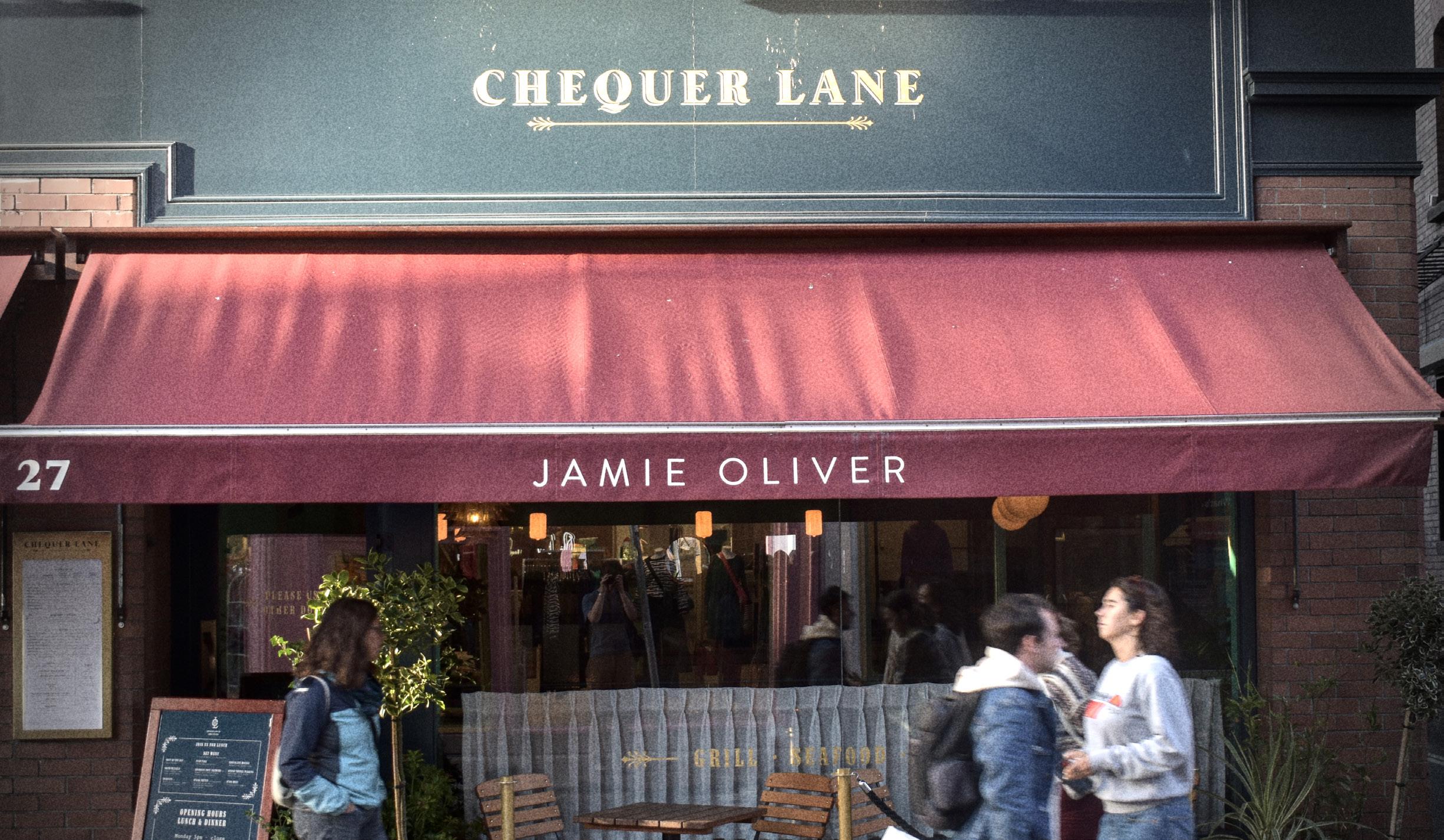
ingredients that are not easily accessible to the average home cook.
disparities related to food access and education. With the rising cost of food, the question of appropriate recipes to provide the public with becomes more prominent. Many home cooks would be reluctant to spend their money on ingredients for recipes they are trying for the rst time and might not enjoy or create again.
Critics of these chefs frequently argue that this approach can make cooking seem intimidating and discourage people from learning to cook at home as the chances of failure seem high. Many recipes featured on culinary magazine Bon Appetit’s website and YouTube channel perfectly demonstrate how many recipes are created without consideration for the abilities of the average home cook. e rise of celebrity chefs can also contribute to the perception that gourmet dining and culinary expertise are exclusive to the wealthy and privileged. is can reinforce social and economic
Some celebrity chefs have also been criticised extensively online for appropriating and misrepresenting the cuisines of other cultures without having proper knowledge or understanding of the o en extensive process behind the original dishes. is can perpetuate stereotypes and contribute to the erasure of traditional culinary practices. Many of these chefs would claim to recreate an authentic dish while using ingredients that are not typically used or preparing them incorrectly. is leads to the misrepresentation of the real dishes and their history. Celebrity chefs o en popularise certain culinary trends, leading to the homogenization of global cuisine. is can diminish the diversity and uniqueness of regional and traditional dishes. Over time, this can lead to a new method overriding the traditional process behind a dish and thus a ecting the distinctive avour pro le that is acquired only through the original methods.
Celebrity chefs present an idealised and o en unrealistic image of the culinary profession. ey emphasise the glamour and excitement of cooking while downplaying the gruelling hours, low wages, and demanding physical labour that are o en part
of the industry. Ordinary chefs do not earn nearly as much as celebrity chefs, even with years of culinary experience. Many end up leaving the industry permanently due to the stress of being overworked and underpaid for many years. Unfortunately, this is something many are not aware of as many would assume these chefs are similar to celebrity chefs o en seeking a humble or familiar image.
Overall, it’s important to recognise that not all celebrity chefs are subjected to criticism, and many have made positive contributions to the culinary world, including advocating for food related issues, promoting cuisines that are o en overlooked and providing people with an educational resource for cooking. However, these criticisms re ect what can o en be overlooked about the celebrity chef phenomenon.
Tuesday 31 January | 14
discusses the issues that arise from the existence and popularity of celebrity chefs
PHOTO BY HENRY SYNNOTT FOR TRINITY NEWS
In Trinity News’s rst issue of the year, the Societies team spoke to the Hispanic and Japanese societies on campus about what they o er Trinity students. Now, we’re following up with two more brilliant cultural societies: the Afro-Caribbean Society (ACS) and the French Society.
Afro-Caribbean Society
Q (Walsh): What would you say is the Afro-Caribbean Society’s overall aim?
A (Afro-Caribbean Society Committee):
Here at ACS, we are dedicated to encouraging and embracing the celebration of Afro-Caribbean culture within Trinity. We aim to connect all students of African and Caribbean descent, as well as those who are looking to experience the
diverse and rich culture. Members can expect back-to-back events of all kinds – so whether you want a break from the hustle of college life, or an excuse to party hard, our society is the place to make the most out of your college experience. In addition, we are very welcoming to everyone and anyone regardless of race, ethnicity, ability, sexuality, religion, etc.
Q: What is the balance between students looking for a piece of home vs students looking to experience a new culture?
A: Over the course of the academic year, your friends at ACS work hard to provide events that cater to [all] students... [We host] fun movie nights where you can cosy up with your friends and reminisce about the Nollywood lms you watched as a kid, or about those game nights that always seemed to get too heated too quick[ly]. Maybe you don’t know much about Afro-Caribbean culture and would simply love the chance to delve into the music, art, language and food. Our bigger cultural events like Afro-Jam, where we showcase these aspects of our culture in the most lavish way, or Letters to the Motherland, at which our members and an in uential panel engage in an open discussion about all things black related might just be the thing for you. Whatever vibe you’re looking for, trust that the Afro-Caribbean Society has your back!
Q: What are some of your most
popular events?
A: It’s no surprise that our society loves to go big or go home; theatrics are in our DNA. So when it comes to our events, expect just that! Some of our most popular events include our infamous Wild n’ Out night, which was revived last year as a collaboration with DCU’s Afro Society. is event features our own take of the hit TV show, in which we settle beef with a series of comedy and rap based challenges. At the end of the night only one society is crowned the winner – naturally we took home the crown!
Another big event we do is Afro-Jam, which was also revived last year. At Afro-Jam, we showcase our best displays of African and Caribbean culture and talent –expect live performances of music and dance, avoursome cuisine, exciting workshops, fashion shows, and pop-up shops of some of your favourite black owned Irish brands!
Other popular events include our Nollywood party, at which we invite members to attend in their own recreation of old Nollywood fashion. is means whipping out your best Y2K looks. Of course, we can’t forget the annual ACS Ball! Make sure to check out our Instagram page to get all the details on these events and more@tcdacs.

Q: Is your society active much over the summer/other college breaks?
A: Our annual Christmas and
End-of-Summer Party occur a er exam season in both semesters. Besides these, we normally don’t hold events during college breaks. However, we are still very active on our social media. Follow our Instagram and Tiktok for memes, polls, college info and updates on upcoming events - @tcdacs.
Q: Finally, what would you say to any students looking to get involved in your society a er Freshers Week?
A: For students who would like the opportunity to be a part of the committee, you’re more than welcome to run in our October AGM, in which positions like Public Relations O cer and First Year Representative will be up for grabs!
French Society
Q: What is your overall aim?
A: e French Society’s overall aim is to promote and celebrate French language and culture among students while creating a community of French speakers and providing a welcoming environment for French students to feel at home. is includes fostering a sense of belonging and cultural exchange within the college community by organising events, activities and opportunities for members to engage with French language and culture.
Q: What would you say is the balance between students seeking a piece of home and those looking to experience a new culture?
A: is tends to vary depending on the type of events we are
hosting. ere are not a lot of native French speakers studying full-time at Trinity so there are de nitely more people interested in learning about the language and the culture. However, as a French student myself I am looking to get more francophones involved in the society.
Q: Does much collaboration go on between di erent cultural societies on campus?
A: Yes, our collaborations are facilitated by the strong relationships and friendships among the heads of these language societies. is close connection makes it easier to organise joint events and mix di erent groups of students who may not have the opportunity to interact otherwise. Such collaboration not only enriches the cultural experiences of students but also provides a wonderful opportunity for students, especially those from abroad, to meet new people and engage in cross-cultural exchanges.
Q: Tell me about some of your most popular events.
A: Some of our most popular events include our recurring “Café and Croissants” sessions, which happen twice a week. ese events provide a cosy and relaxed atmosphere for guests to enjoy freshly brewed co ee or tea along with delicious croissants. It’s a great way for people to unwind, chat with friends, or simply savour a moment of tranquillity.
Q: Is the French society active during the summer?
No, our society is less active during the summer. Many of our members, including the undergraduates who run the society, take a break and go home or travel. is downtime is essential for us to recharge a er a busy academic year and prepare for the upcoming year’s activities.
Q: Finally, what would you say to anyone thinking of joining your society?
We would enthusiastically encourage any students looking to get involved to join us! Our society o ers a welcoming and inclusive community where you can engage in a wide range of exciting activities, make new friends, and contribute to meaningful initiatives. Whether you’re passionate about our events, our mission, or simply want to be part of a fun and dynamic group, we’d love to have you on board. Feel free to reach out, attend our events, and explore what we have to o er. Your enthusiasm and participation will make our society even better!
Sometimes, it can seem intimidating to join a society . You might feel overwhelmed by the choice on o er or be worried about meeting new people. At the end of the day though, there really is something for everyone, and as this series has shown, the one all Trinity societies have in common is that they’d be delighted to have you.
| Tuesday 31 January 15
talks to two of Trinity’s cultural societies to discuss their goals and values, and how they can act as a home for those missing theirs
PHOTO VIA ACS FOR TRINITY NEWS
CROSSWORD BY RANDAL HENLY FOR TRINITY NEWS

1. It’s an illuminated manuscript containing the four Gospels in Latin, in the Old Library (4,2,5)
2. Muiscal instrument; Einstein played it (6)
3. Leave, especially to start a journey (6)
4. A man-eating giant in pantomimes (4)
5. Former students of a university (6)
6. Cause one to no longer be on friendly terms with another (8)
7. What the D stands for in the degree of BD (8)
8. Nationality of some of the far Eastern TCD students (7)
13. Ornaments or pieces of jewellery thought to give protection against evil or danger (7)
14. A colloquial taxi driver (5)
17. e body of work of a painter, composer or author; contains UV (6)
19. East African country, bordered by Uganda, Tanzania and Burundi (6)
22. e great river of SW Asia which is a tributary of the Euphrates (6)
23. e capital of Portugal (6)
24. A French de nite article (2)
26. Estimate something without su cient information to be sure of being correct (5)
27. Semi-precious stone consisting of a hard variety of quartz (5)
28. In short, one of the societies based in the GMB (4)
29. Requests (4)
Several pages in this issue feature art by our new art team, who are looking for contributing artists.
We accept sketches, paintings and digital artwork.
If you have a piece you want to submit or want to get involved in the next round of art assignments, email art@trinitynews.ie or nd our art team group chat on Instagram.

Tuesday 31 January | 16











